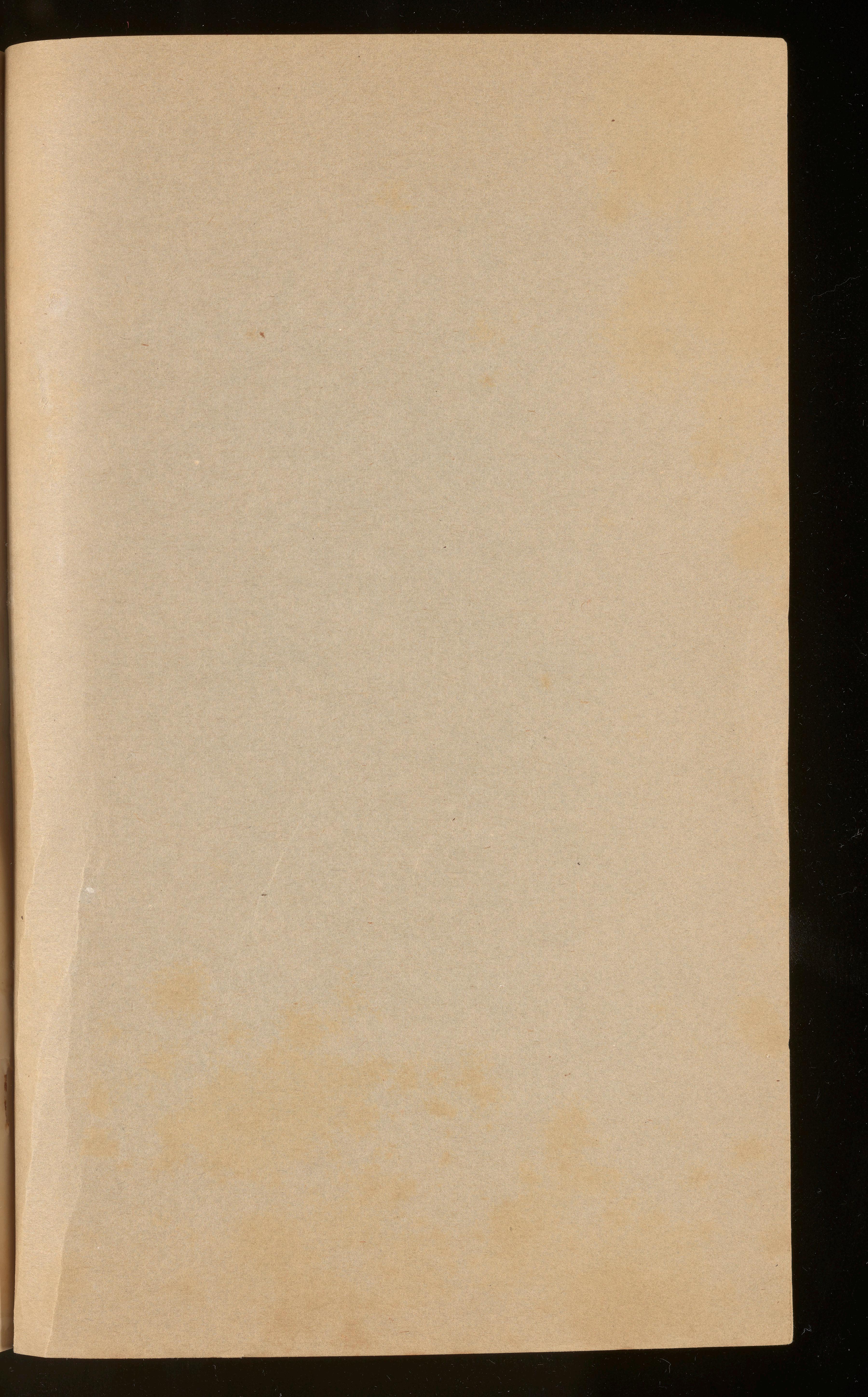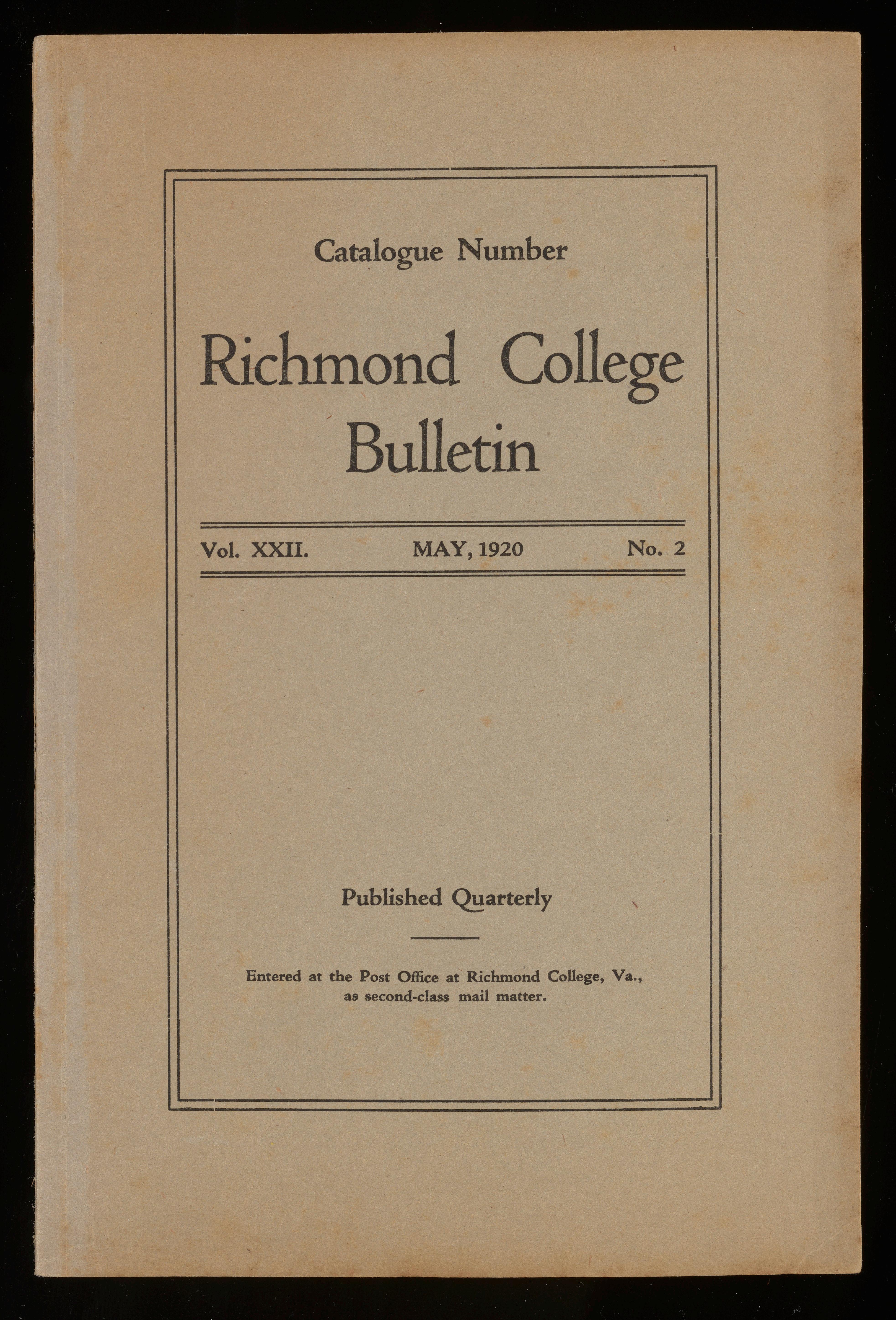
Published Q!!arterly
Entered at the Post Office at Richmond College, Va., as second-class mail matter.
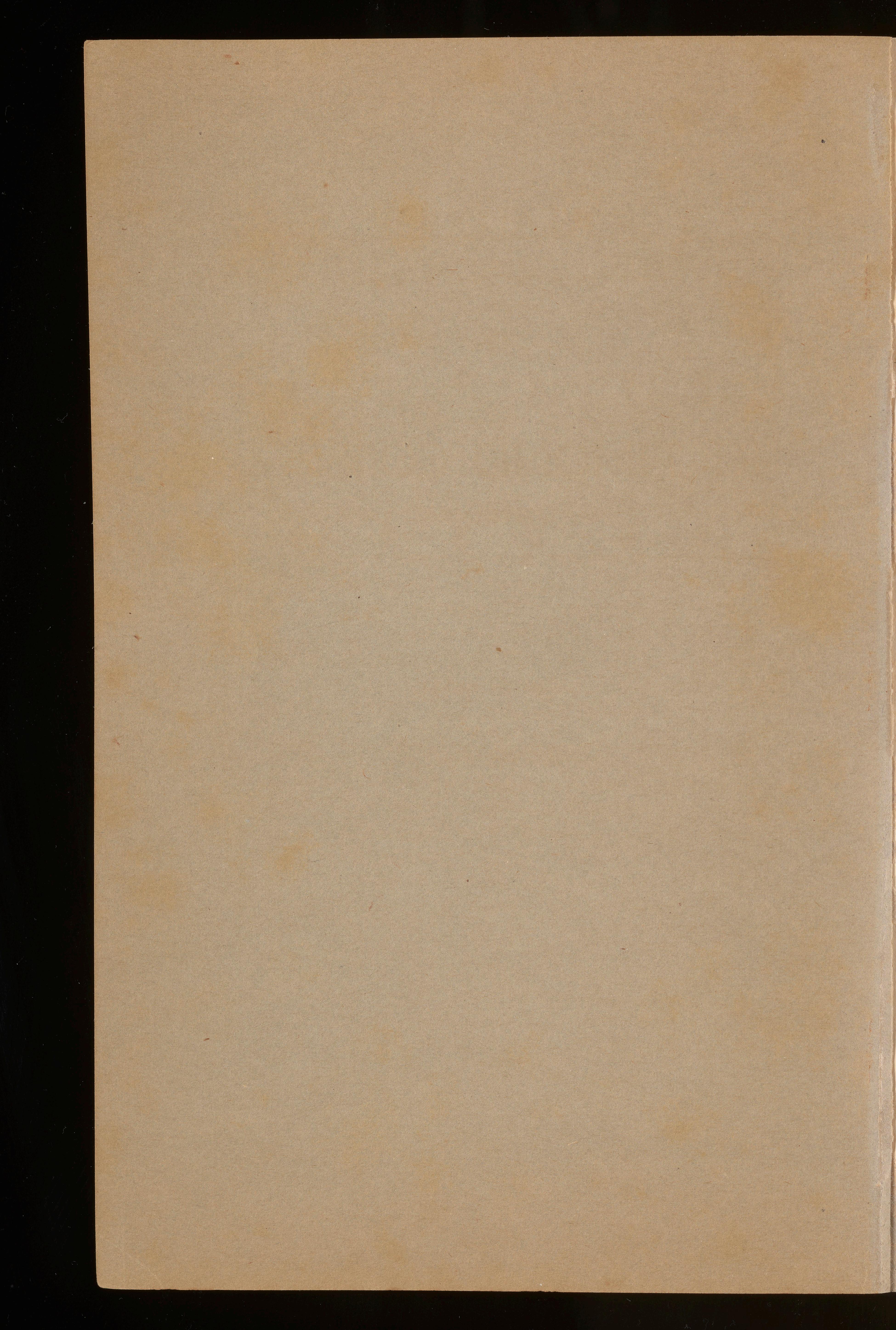


Published Q!!arterly
Entered at the Post Office at Richmond College, Va., as second-class mail matter.

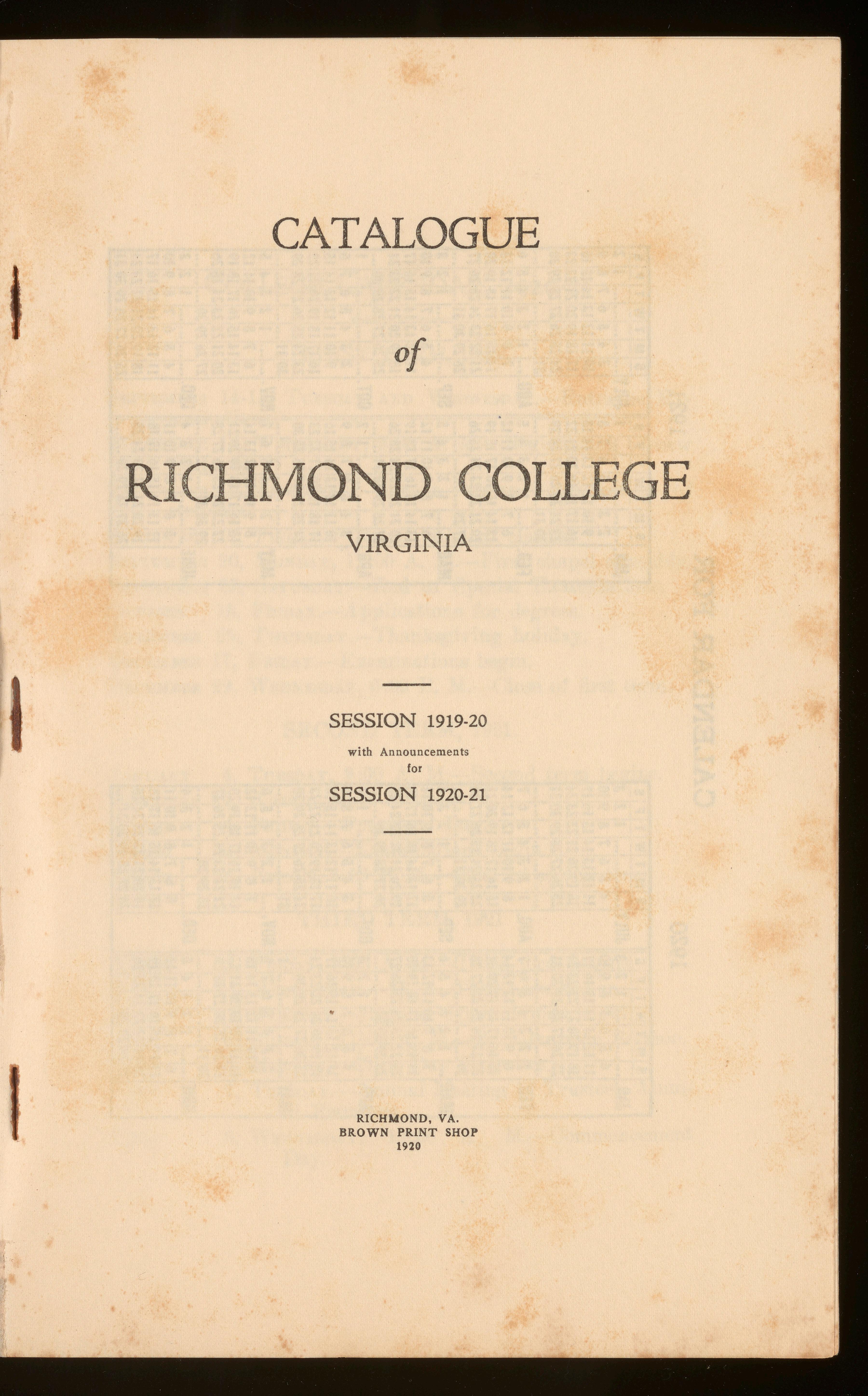
SESSION 1919-20 with Announcements for SESSION 1920-21
RICHMOND, VA.

SEPTEMBER14-15, TUESDAYAND WEDNESDAY.-Entrance Examinations.
SEPTEMBER15, WEDNESDAY, 9 :00 A. M.-Registration of new students.
SEPTEMBER16, TH URSDAY.-.Session begins; registration of students.
SEPTEMBER17, FRIDAY.-Organization .of classes.
SEPTEMBER20, MONDAY,11 :00 A. 1M.-First chapel assembly.
SEPTEMBER25, SATURDAY.-End of Special Examinations.
OcTOBER 15, · FnmAY.-Applications for degrees. NoVEMBER25, TnunsDAY.-Thanksgiving holiday.
DECEMBER17, FRIDAY.-Examinations begin.
DECEMBER22, WEDNESDAY, 6 :00 P. M.-Close of first term.
S .ECOND TERM, 1921.
JANUARY 4, TuESD'.AY, 9 :00 A. M.-Second term begins. FEBRUARY22, Washington's Birthday.
MARCH 4, F :RIDAY.-Founders' Da . y.
MARCH 14, MoNDAY.-Exa.mina.tions begin.
MARCH 18, FRIDAY,6 :00 P. M.-Close of second term.
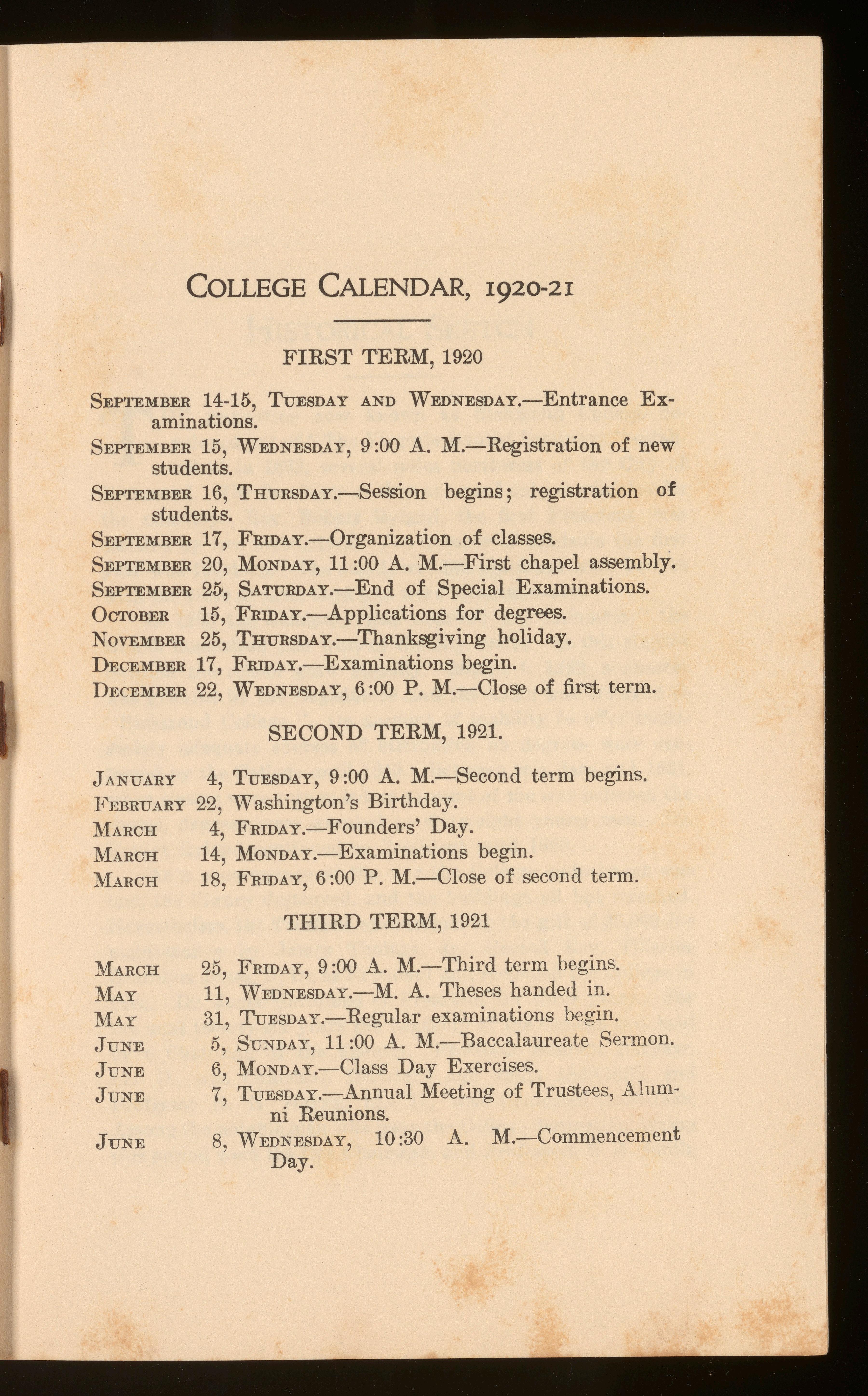
MARCH MAY MAY
JuN E
JUNE
JUNE
JUNE
25, FRIDAY,9 :00 A. M.-Third term begins. 11, WEDNESDAY.-M.A. Theses handed in. 31, TuESDAY.-Re gular examinations b,egin. 5, SuNDAY,11 :00 A. M.-Baccalaureate Sermon.
6, MoNDAY.-C1ass Day Exercises.
7, TUEsDAY.-Annual Meeting of Trustees, Alumni Reunions.
8, WEDNESDAY,10:30 A. M.-Commencement Day.


THE institution now known as Richmond C·ollege developed out of'' The Virginia Baptist Seminary,'' established in 1832, several miles northwest of the City ofRichmond. The .Seminary at first acceptecl only candidates for the ministry. Rev. Robert Ryland, the first President, was assisted by two instructors. The number of students the first year was f ourte-en. The small, wooden buildings were bought with the piece of farm land and w ,ere unsatisfactory.
In 1833 the Seminary was removed to ''Columbia,'' the Haxall homestead just west of the eity limits. In this eligible location the school grew steadily. March 4, 1840, a charter was grantecl by the Legislature and the name was changed to '' Richmond College.'' On accol1nt of inability to offer immediately adequate courses of ins-truction no degrees ,vere conferred by the College until 1849. Bet,veen this date and 1861, when classes were suspended on aceount of the ,var between the States, degrees were granted to sixty-eight young men. Dr. Robert Ryland continuecl as President, until 1866.
As a consequence of th-e war the College endo,vment was lost, the library destroyed, and the buildings all but wrecked. Nevertheless, the Trustees, enc,ouraged by the gift of $5,000 for maintenance by James Thomas, Jr., elected Rev. Tiberius Gracchus Jones, D.D., as President and reopened the College in 1866. Dr. Jones continuecl as President for three years. For the next twenty-six y-ears the headship of the College was held by a Ch.airman of the Faculty. Professor Bennett Puryear, LL. D., was Chairman 1869-1885 and again 1889-1895, and Professor H. H. Harris, LL. D., ,vas Chairman 1885-1889. Among the notable men who gave the C:ollege distinetion during this period were the two Chairmen, and Professors E. B. Smith,

RICHMOND OOLLEGE CATALOGUE
E dmund Harrison, J. L. M. Curry, A. B . Brown, W. D. Thomas, John Pollard, C. H. Winston and ;S,ecretary Charles H. Ryland. In 1873 and again in 1881 there were successful campaigns for money which provid .ed new buildings and ga-ye the nucleus of a new endowment. · In 1894 the Trustees, re..;established the presidency ,of the College, and elected to the position F. W. Boatwright, at that time the younges :t member of the faculty. Despite many rlifficulties there was steady growth. A science hall and a large dormitory were erected, and under the leader~hip of Dr. W. ·E. Hatcher, PresideDJt of the Board of Trustees, $100,000 was added to :the endowment.
In 1898 women were a<lmitted to College classes. The restrictions upon matriculation of women did not prevent a slow but constant increase in the number of w,omen students. It soon became evident tha:t better provision should be made for women students. A five-year campaign, undertaken jointly with the Virginia Baptist Education Commission, and with the co-operation of the General Education Board of New York, , anded half a million dollars to the resources . of the corporation. By 1910 th ·e Trustees began to build two co-ordinate Colleges in the western suburbs of Riehmond and to prepare for removal. The buildings w ·ere completed in 1914 and the first ses8ion of · the greater College began in s,eptember, 1914.
The new institution, still called '' Richmond College,'' embraces a college for m ,en, also called '' Richmond College,'' a • college for women, named ''Westhampton College,'' an<l the professional School of Law. These two schools are co-ordinate, having practically the same entrance and degree requirements and doing work of the same grade. There is no co-education · in either of the colleges, but a considerable number of the same professors teach classes in both. Each college has its own institutional life and both enjoy many advantages on account of the proximity and co-operation of the other. Among these a<lvantages are economy in administration, a larger and better paid faculty of instruction, protection against academic \Solation, and the enjoyment of a freer social and cultural life.
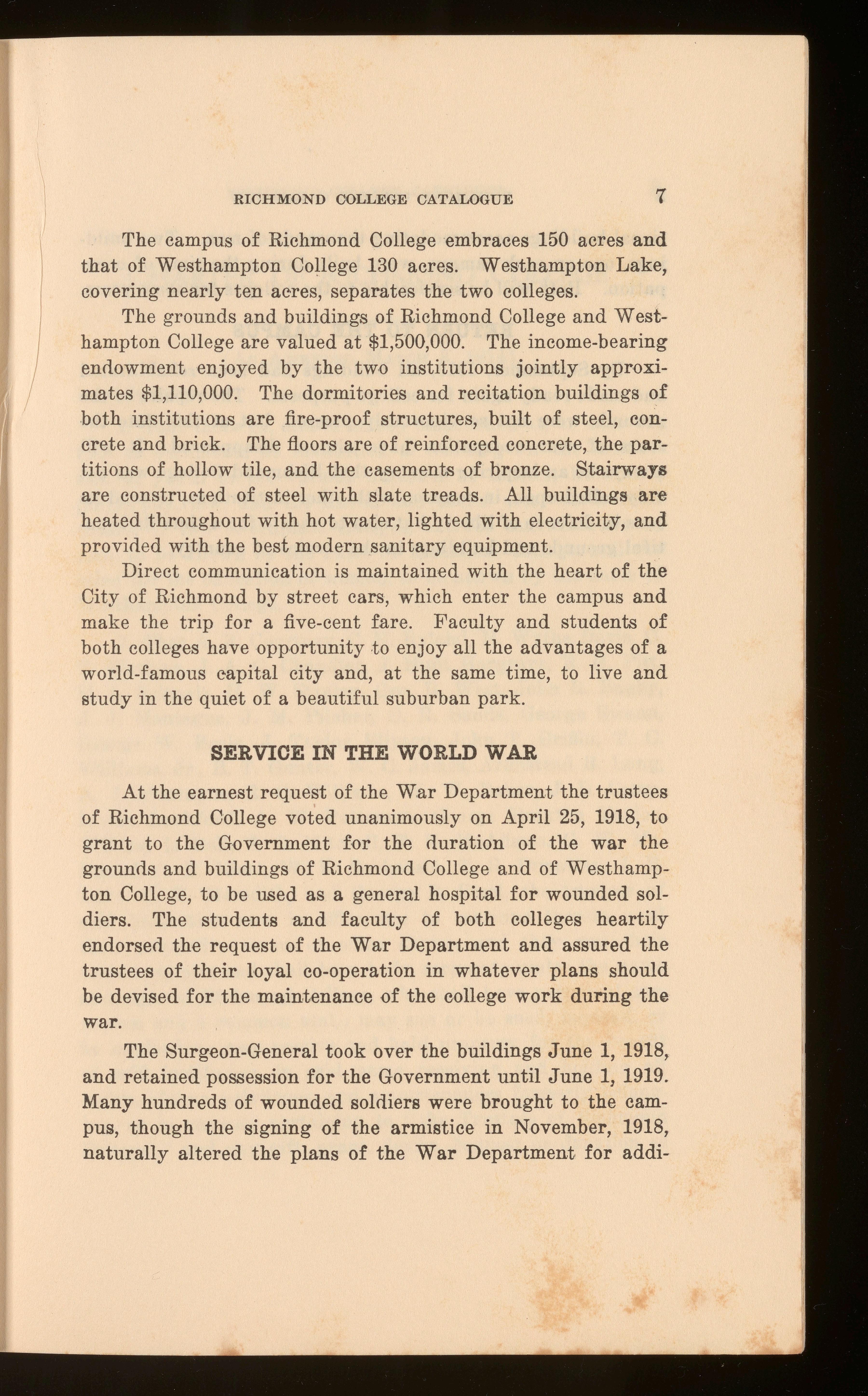
The campus of Richm ,ond College embraces 150 acres and that of Westhampton coilege 130 acres. Westhampton Lake, covering nearly ten aeres, separates the two colleges.
The grounds and buildings of Richmond College and Westhampton College are valued at $1,500,000. The income-bearing enrlowment enjoyed by the tw ,o institutions jointly approximates $1,110,000~ The dormitories and recitation buildings of both institutions are fire-proof structures, built of steel, concrete and brick. The floors are of reinforced concrete, the partitions of hollow tile, and the casements of bronze. Stairways are constructed of steel with slate treads. All buildings are heated throughout with hot water, lighted with electricity, and provirled with the best modern sanitary equipment.
Direct communication is maintained with the heart of the City of Richmond by street cars, which enter the campus and make the trip for a five-cent fare. Faculty and students of both colleges have -opp ,ortunity to enjoy all the advantages of a world-famous capital city and, at the same time, to live and study in the quiet of a beautiful suburban park.
At the earnest request of the War Department. the trustees of Richmond College voted unanimously on April 25, 1918, to grant to the Government for the duration of the war the grounds and buildings o~ Richmond College and of W esthampton College, to be used as a general hospital for wounded soldiers. The students and faculty of both colleges heartily endorsed the request of the War Department and assured the trustees of their loyal co-operation in whatever plans .should be devised for the maintenance of the college work during the war.
The Surgeon-General took over the buildings June 1, 1918, and retained possession for the Government until June 1, 1919. Many hundreds of wounded soldiers were brought to the campus, though the signing of the armistice in November, 1918, naturally altered the plans of the War Department , for addi-

tiQDal buildings accommodating thousands of men. Two buildings, one on each campus, were built during the time of oceu~ pation. Both will be service~ble to the colleges for some years.
By September, 1919, all buililings had been rehabilitated and made ready again for college purposes. The repairs to the grounds were not so vigorously pressed, but at this date the iscars of war occupation have almost disappeared. It will always be an inspiring memory that Richmond College was not only called upon, in common with other institutions, to send irbJ ,sons i:p.,defence of liberty but also to vacate for a time it,s beautiful grounds and buildings in the servic-e of country.
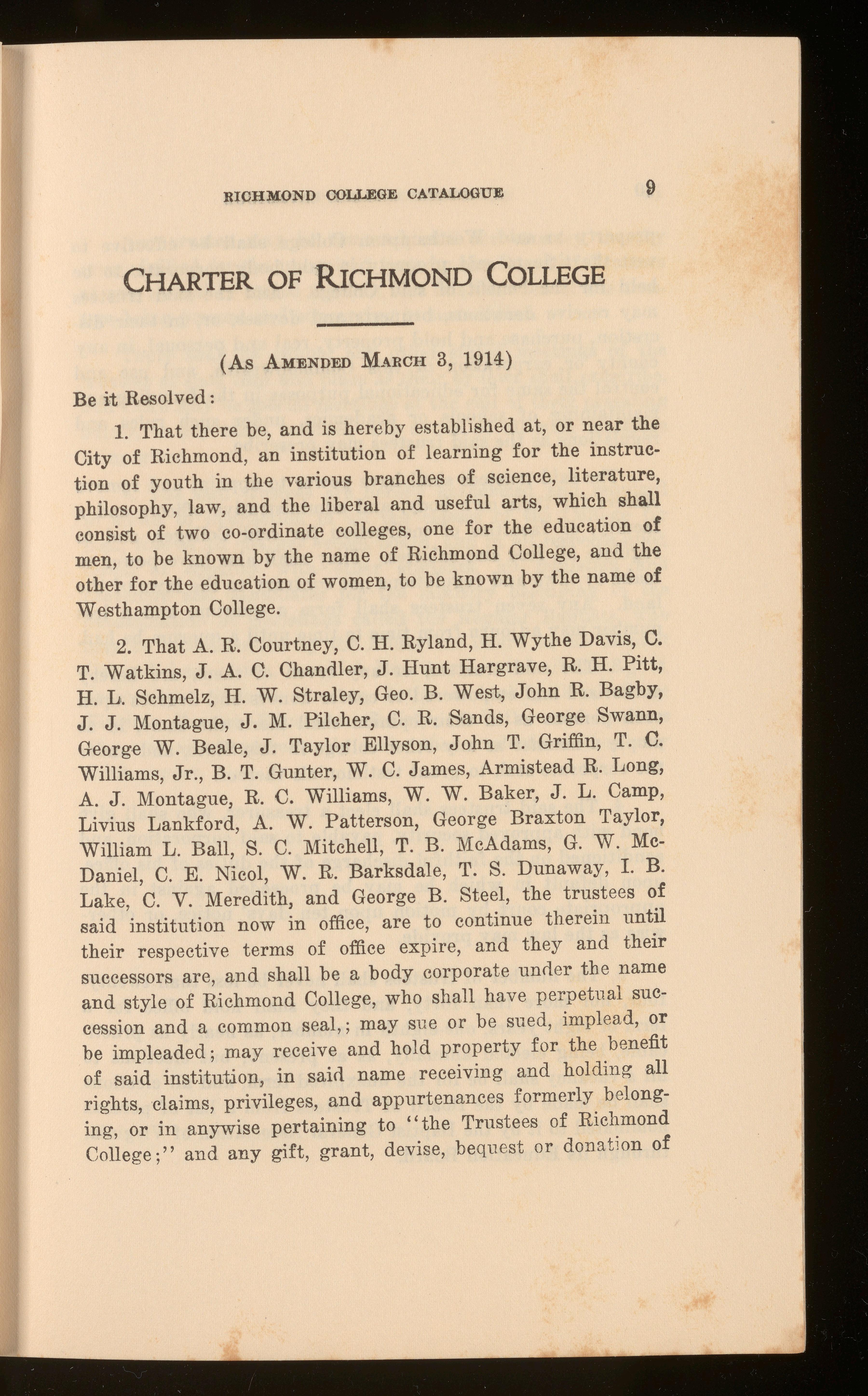
Be it Resolved: 9
(As AMENDED MARCI-I 3, 1914)
1. That there be, and is hereby established at, or near the City of Richmond, an institution of learning for the instruction of youth in the various branches of science, literature, philosophy, law, and the liberal and useful arts, which shall consis · t of two co-ordinate colleges, one for the education of men, to be known by the name of Richmond •College, and the other for the education of women, to be known by the name of W e.sthampton College.
2. That A. R. Courtney, C. H. Ryland, H. Wythe Davis, C. T. Watkins, J. A. C. Chandler, J. Hunt Hargrave, R. H. Pitt, H. Li. Schmelz, II. W. Straley, Geo. B. West, John R. Bagby, J. J. Montague, J. M. Pilcher, C. R. •S,ands, George swann, Georg e W. Beale, J. Taylor Ellyson, John T. Griffin, T. C. Williams, Jr., B. T. Gunter, W. C. James, Armistead R. Long, A. J. Montague, R. C. Williams, W. W. Baker, J. L. Camp, Livius Lankford, A. W. Patterson, George Braxton Taylor, William L. Ball, S. C. Mitchell, T. B. McAdams, G. W. McDaniel, C. E. Nicol, W. R. Barksdale, T. S. Dunaway, I. B. Lake, C. V. Meredith, and George B. Steel, the trustees of said institution now in office, are to continue therein until their respective terms of office expire, and they and their successors are, a11d shall be a body corporate unrler the name and style of Richmond College, who shall have perpetual succession and a common seal,; may sue or be sl1ed, jmplead, or be impleaded; may receive and hold property for the benefit of said institution, in said name receiving and holding all rights, claims, privileges, and appurtenances formerly belonging, or in anywise pertaining to "the Trl1stees of Richmond College;'' and any gift, grant, devise, bequest or donation of
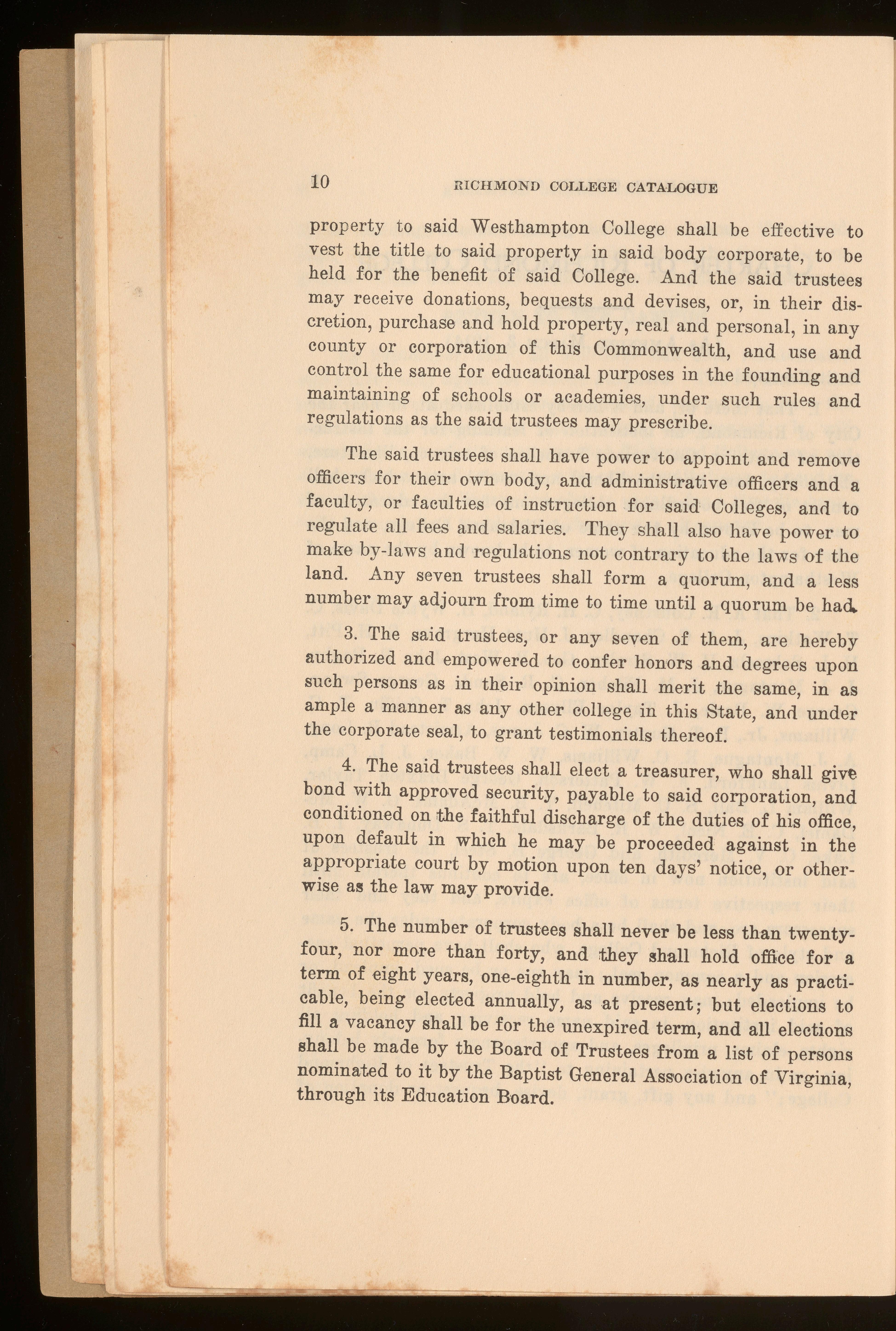
property to said Westhampton College shall be effective to vest the title to said propert.y in said body corporate, to be held for the benefit of said · College. An<l the said trustees may receive donations, bequests and devises, or, in their dis- cretion, purchase a.nd hold property, real and personal, in any county or corporation of this Commonwealth, and use and control the same for education.al purposes in the founding and maintaining of schools or academies, under such rules and regulations as the said trustees may prescribe.
The said trustees shall have power to appoint and remove officers for their own body, and administrative officers and a faculty, or faculties of instruction for said : Colleges, anrl to regulate all fees and salaries. They shall also have power to make by-laws and regulations not contrary to the laws of the land. Any seven trustees shall form a quorum, and a less number may adjourn from time to time until a quorum be had..
3. The said trustees, or any seven of them, are hereby authorized and empowered to confer honors and degrees upon such persons as in th eir opinion shall merit the same, in as ample a manner as any other college in this State, an<l under the corporate seal, to grant testimonials thereof.
4. The said trustees shall elect a treasurer, who shall giv~ bond ,vith approved security, payable to said corporation, and condition -ed on the ·faithful discharge of the duties of his office, upon default in which he may be proceeded against in the appropriate court by motion upon ten days' notice, or otherwise a3 the law may provide.
5. The number of trustees shall never be less than twenty- four, nor more than forty, and they shall hold office for a term ofeight years, on-e-eighth in number, as nearly as practicable, being elected annually, as .at pres ·ent; but elections to fill a vacancy shall be for the unexpired term, and all elections shall be made by the Board of Trustees from a list of persons nominated to it by the Baptist General Ass 1ociation of Virginia, through its Education Board.

Any trustee may be removed, and the vacancy thereby created filled for the unexpired term by the Board of Trustees at any annual or stated meeting, not less than ten of the trustees being present arid concurring in such action.
There shall be annual and other stated meetings of the trustees at such time and place as their by-laws shall prescribe, and there may be special meetings at the call of their presiding officer, or any three trustees, due notice of all such meetings being given.
6. The said trustees are hereby authorized and required to admit to instruction in all -the c•lasses of the 1College for men, free of all charges except board, and in all respects up on terms of equality with other students, all ministers and preachers :and candidates for the ministry belonging to the <lenomination of Christians called the Regular Baptists, who may be recommended by the Education Board of the Baptist General Association, in which Board are vested all the rights, properties, privileges, powers, duties and obligations of the Virginia Baptist Education Society; and the said trustees may also admit gratu,itously suc,h other stu<lents as they may think proper.
A. W. PATTERSON PRESIDENT
T. C. WILLIAMS, JR. VICE· PRESIDENT
B. WEST TABB SECBET.ARY
CLASS ONE
Term expires June, 1920
R. M. SMITH .•.•...•.•. Richmond
T. B. McADAMS..•..•.. Richmond
JuooE C. E. NICOL•.... Alexandria
L. T. WILSON,D.D., Knoxville, Tenn.
REV. J. T. -STINSON,Bluefield, W. Va.
CLASS TWO
Term expires June, 1921
JuDGE W. R. BARKSDALE .. Houston
I. B. LAKE, D. D ....... Upperville
C. V. MEREDITH........ Richmond
E. B. J AcKsoN, D. D .... Alexandria
B. P. WILLIS ...... Fredericksburg
CLASS THREE
Term expires June, 1922
J. A. C. CHANDLER,Ph. D., Rich'd
C. T. WATKINS ......... Richmond
rr. C. SKINNER, D. D .•.. Richmond
W. H. BAYLOR,D. D .... Baltimore
NORMAN H. WILLIAMS, Chase City
CLASS FOUR
Term expires June, 1923
J. HUNT HARGRAVE.•.... Chatham
R. H. PITT, D. D., LL. D., Rich'd
H. W. STRALEY,Princeton, W. Va.
\V. B. VEST........ Newport News
·w. J. PARRISH......... Richmond

CLASS FIVE
Term expires June, 1924
J. J. MONTAGUE.....•.•. Richmond
J. M. PILCHER, D. D .... Petersburg
PROF. GEo. SWANN •••••• Trenholm
D. H. PITTS .....••..•.. Scottsville
W. S. FORBES.•.•..••.. Richmond
CLASS SIX
Term expires June, 1926
JAMES D. CRUMP ••••••• Richmond
STUART McGUIRE, LL.D. Richmond
JNo. T. GRIFFIN ....... Portsmouth.
T. C. WILLI.AMS, JR ..... Richmond
CLASS SEVEN
Term expires June, 1926
A. J. MONT.AGUE,LL.D .. Richmond
R. C. WILLIAMS ........ Richmond
B. rr. GUNTER •••••••••••. Accomac
W. C. J.AMES, D. D ..... Richmond
A. R. LONG............ Lynchburg
CLASS EIGHT
Term expires June, 1927
J. L. CAMP.............. Franklin
A. W. PATTERSON ••••••. Richmond
GEo. B. TAYLOR,D. D ...... Hollins
C. J. BILLUPS ••.•••••.. Richmond
BURNLEYLANKFORD, M. D., Norfolk
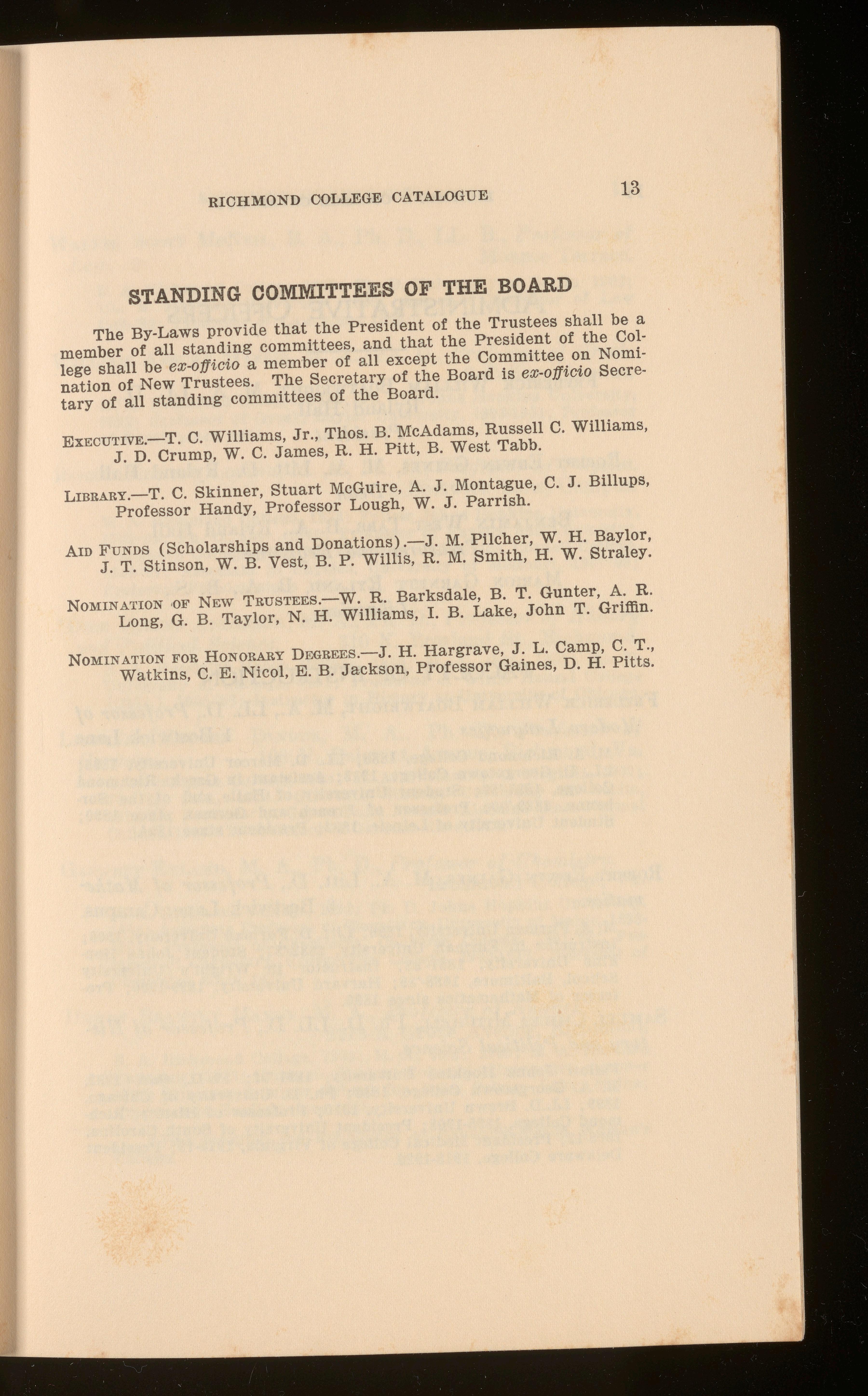
The By-Laws provide that the President of the Trustees shall be a member of all standing committees, and that the President of the College shall be ex-officio a mem ber of all except the Committee on Nomination of New Trustees. The Secretary of the Board is ex-officio Secretary of all standing committees of the Board.
ExECUTIVE.-T. C. Williams, Jr., Thos. B. McAdams, Russell C. Williams, J. D. Crump, W. C. James, R. H. Pitt, B. West Tabb.
LIBRARY.-T. C. Skinner, Stuart McGuire, A. J. Montague, C. J. Billups, Professor Handy, Professor Lough, W. J. Parrish.
AID FUNDS ( Scholarships and Donations) .-J. M. Pilcher, W. H. Baylor, J. T. Stinson, W. B. Vest, B. P. Willis, R. M. Smith, H. W. Straley.
NOMINATION•OF NEW TRUSTEES.-W. R. Barksdale, B. T. Gunter, A. R. Long, G. B. Taylor, N. H. Williams, I. B. Lake, John T. Griffin.
NOMINATIONFORHONORARYDEGREES.-J. H. Hargrave, J. L. Camp, C. T., Watkins, C. E. Nicol, E. B. Jackson, Professor Gaines, D. H. Pitts.
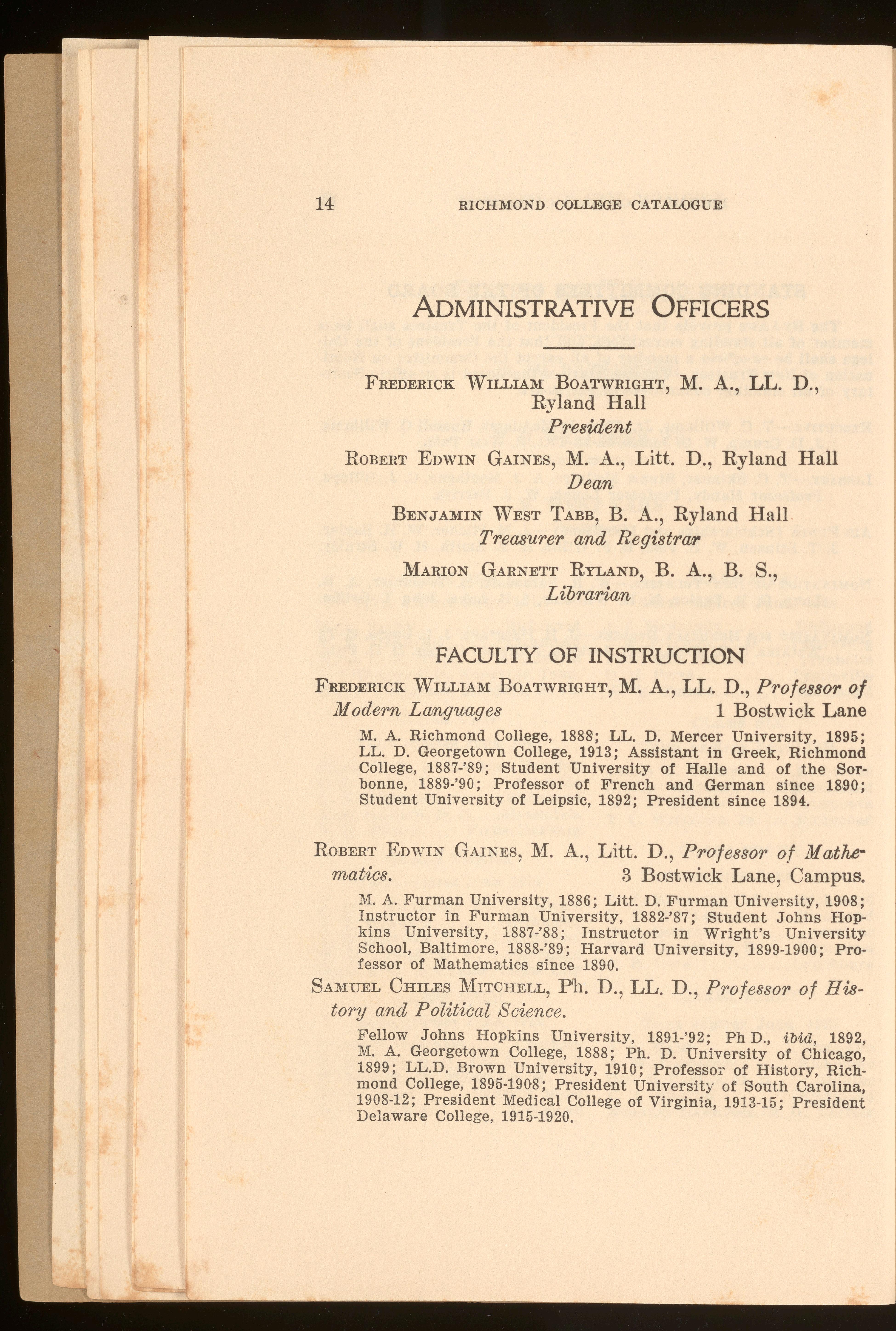
RICHMOND COLLEGE CATALOGUE
FREDERICK WILLIAl\'I BOATWRIGHT, M. A., LL. D., R,y land Hall President
RoBERT EDWIN GAINES, M. A., Litt. D., Ryland Hall Dean,
BENJAMIN WEST TABB, B. A., Ryland Hall Treasurer and Registrar
MARION GARNETT RYLAND, B. A., B. s., Librariarn
FREDERIC!{ vVILLIAl\I BOATWRIGHT, M. A., LL. D., Professor of Modern Lan,giia,ges l Bostwick Lane
M. A. Richmond College, 1888; LL. D. Mercer University, 1895; LL. D. Georgetown College, 1913; Assistant in Greek, Richmond College, 1887-'89; Student University of Halle and of the Sorbonne, 1889-'90; Professor of French and German since 1890; Student University of Leipsic, 1892; President since 1894.
RonER1.,En,vIN GAINES, M. A., Litt. D., Professor of Mathe· matios. 3 Bostwick Lane, Camp us.
M. A. Furman University, 1886; Litt. D. Furman University, 190.8; Instructor in Furman University, 1882-'87; Student Johns Hopkins University, 1887-'88; Instructor in Wright's University School, Baltimore, 1888-'89; Harvard University, 1899-1900; Professor of Mathematics since 1890.
SAl\IUEL CHILES MITCHELL, Ph. D., LL. D., Professor of Htfstory and Political Science.
Fellow Johns Hopkins University, 1891-'92; PhD., ibid, 1892, M. A. Georgetown College, 1888; Ph. D. University of Chicago, 1899; LL.D. Brown University, 1910; Professo:r of History, Richmond College, 1895-1908; President University of South Carolina, 1908-12; President Medical College of Virginia, 1913-15; President Delaware College, 1915-1920.

WAL'rER ScoTT McNEIL, B. A., Ph. D., LL. B., Professor of Law. Monroe Terrace.
B. A. Richmond College, 1899; Ph. D. University of Berlin, 1902; LL. B. Harvard University, 1905; Associate Professor of Law 1905-'09; Professor of Law since 1909.
1,rrLLIAM AsBURY HARRIS, M. A., Ph. D., Professor of Greek. 2 College A venue.
M. A. Richmond College, 1886; Ph. D. Johns Hopkins University, 1892; Professor of Greek, Baylor University, 1893-1901; Profes sor of Greek since 1901 .
. ROBERT EDWARD Lov1No, M. A., Ph. D., Profes sor of Physics. 2 Bostwick Lane, Campus.
M. A. Richmond College, 1898; Fellow Johns Hopkins University, 1901-'02; Ph. D., ibid., 1905; Professor of Physics and Chemistry, Blackburn College, 1905-'0 ,6; Professor of Physics, Cornell College, 1906-'07; Associate in Physics, University of Missouri, 1907-'08; Professor Physics since 1908.
*DICE RoBINs ANDERSON, M. A., Ph. D., Professor of History a:nd Political Science. 310 N. Rowland St., Richmond.
B. A. Randolph-Macon College, 1900; M. A., ibid., 1901; Ph. D. University of Chicago, 1913; President of Willie Hansel College (Okla.), 1905-'06; Instructor in History at University of Chicago,
LEONIDAS REUBEN D1Nous, M. A., Ph. D., Professor of Ger'l'fl.an. 108 N. Belmont Avenue, Richmond, Va.
B. A. Milligan College, 1894; M. A. University of Virginia, 1907; Ph. D., ibid., 1914; Graduate Student University of Berlin, 1912-'14; Professor of German and French, Alabama State Nor1nal College, 1907-'12; Professor of German since 1914.
GARNETT R ,YLAND, · M. A., Ph. D., Professor of !Chemistry. Richmond College, Va.
M. A. Richmond College, 1892; Ph. D. Johns Hopkins University, 1898; Associate Professor of Chemistry, University of Maine, 18981901; Professor of Chemistry, Converse College, 1901-'03; Professor of Chemistry, Georgetown College, 1903-1917; Professor of Chemistry since 1917.
HENRY BRANTLY HANDY, M. A., Professor of English. 2218-A Grove Avenue, Richmond.
B. A. Richmond College, 1906; M. A., ibid., 1909; M. A. Harvard University 1913; Graduate Student Columbia University, summer 1915; Director Summer School for Boys, Sebago Lake, Maine; Professor of English since 1918.
* Has accepted the Presidency of Randolph-Macon Woman's College.
RICHMOND COLLEGE CATALOGUE
DANIEL BUNYAN BRYAN, M. A., Pd. D., Professor. of Edru- cation and Soaiology. 9 Dooley Ave., Richmond. B. A. University of North Carolina, 1911; Graduate student Colum- bia University, 1912-'14; M. A., ibid., 1914; Helen Gould Fellow in Education, New York University, 1914-'15; Ph. D., ibid., 1915; Professor of Secondary Education, University of North Carolina, summer session, 1915; Professor of Education and Sociology since 1915.
HORACE EDWIN I-IAYDEN, JR., M. A., B. A., Pr'ofessor of Biol- ogy. 1108 W. Grace St., Richmond, V a. A. B. Princeton, 1905; M. A. Virginia, 1907; Graduate in the School of Biology, Virginia, 1910. Instructor in Biology, A. and M. College of Texas, 1910-'12; Assistant Professor, ibid., 1912-17; Associate Professor, ibid., 1917-Feb. 1918; Instructor in Biology, New York University, Feb.-June, 1918; Acting Professor of Bi - ology, College of William and Mary, 1918-19; Professor of Biolo gy, William and Mary Summer Session, 1918, 1919. Professor of Biology, Richmond College, 1919.
JAMES G. RANDALL, A. M., Ph. D., Professor of History. 1810 Floyd Avenue, Richmond. A. B., Butler College, 1903; A. M., University of Chicago, 1904; Ph. D., ibid., 1911; Instructor in History and Political Science, Illinois Coll ege, 1907-'08; Assistant in History, University of Michigan, 1908-'09; Fellow in History, University of Chicago, summer and fall, 1909; Instructor in History and Political Science, Syracuse University, 1910-'ll; Acting Professor of His- tory, Butler College, 1911-'12; Professor of History and Economics, Roanoke College, 1912-'18; Harrison Research Fellow in History, University of Pennsylvania, 1916-'l 7; Professor of American His- , tory, University of Illinois, summer session, 1918; Historian, U. S. Shipping Board 1 1918-'19; Professor of History since 1919.
FRANK M. DOBSON, Athletic Director.
2310 Floyd Avenue, Richmond, Va. Coach Rose Polytechnic Institute, 1907; Coach University of Geor- gia, 1908; Athletic Director Clemson College, 1909-'12; Athletic Director Richmond College, 1913-'17; Athletic Director Camp Jack- son, S. C , 1918-'19; Athletic Director Richmond College, 1919.
RoBERT ARMISTEAD STEWART, M. A., Ph. D., Aetin.g Professor of Roman-ce Languages.
1106 W. Franklin St., Richmond, Va. lVLA. University of Virginia, 1899; Professor of Modern Languages Wofford College, 1899-1900; Instructor in Modern Languages Uni- versity of Virginia, 1900-'01; Ph. D. University of Virginia, 1901; Assistant in French Tulane University of La., 1901-'02; Associate Professor of Romance Languages Richmond College, 1903-'12; Professor of Romance Languages Richmond College, 1912-'17; As-


sociate in Romance Languages in Johns Hopkins University,, 1917-'19; Professor of Romance Languages Richmond College,. 1919-'20.
CASSIUS MONCURE CHICHESTER, B. A., LL. B., Associate Plf'of essor of Larw. 108 North Fifth Street, Richmond. B. A. William and Mary College; LL. B., University of Virginia; Instructor in Law, University of \ 7 irginia; Associate Professor of Law since 1912.
THOMAS JusTIN MooRE, B. A., LL. B., Associate Professor of Law. 1920 Grove Avenue, Richmond.
B. A., Richn1ond College~ 1908; LL. B., Harvard University, 1913; Instructor in Richmond Academy, 1908-'10; Associate Professor of Law since 1913.
Ownil TS HARRIS WILLIS, B. S., Acting Professor of PhyB'ics. 2 Bostwick Lane, Campus.
B. S., Richmond College, 1914; B. S. in Engineering, Johns Hopkins University, 1916; Labor8tory Assistant in Physics, Richmond College, 1912-'13; Instructor in Mathematics, ib ,id., 1913'14; Associate Professor of Physics and Mathematics, ibid., 1916'l 7.
V. E. AYRE, B. S., E. E., Assodate Profess01 " of J.1/athem ,atics and Physics. Richmond College, Va.
B. S., Virginia Polytechnic Institute, 1910; E. E., Virginia Polytechnic Institute, 1911; Instructor of Mathematics and Assistant Commandant Virginia Polytechnic Institute, 1914-'16; Graduate Student of University of Virginia, 1917; Instructor of Physics,. Lehigh University, 1917-'18; Assistant, Bureau of Standards, 1918-'19.
BoBER'I' LowE How ARD, A. B., M. S., As8'ociate Professor of Orga nic and AnalyticaZ Chemistry. Richmond College, Va.
A. B., UniTersity of South Dakota, 1917; M. S., State University of Iowa, 1919; Instructor in Chemistry, State University of Iowa, 1917-'19.
ARCH IE G. R YLAND, B. A.i Assista.n ,t Pro/essor of En,glish and French - 2214 Grov:_eAvenue, Richmond, Va.
B. A., Richmond College, 1908; Principal Cheriton High School, 1908-'10; Instructor, Latin and Modern Languages, Chatham Training School, 1910-'13; Graduate Student Harvard University,, 1913-14; Instructor English and French, Richmond Academy, 1914-'17; S-ecretary King and Queen County Chapter American Red Cross, 1917-'19.
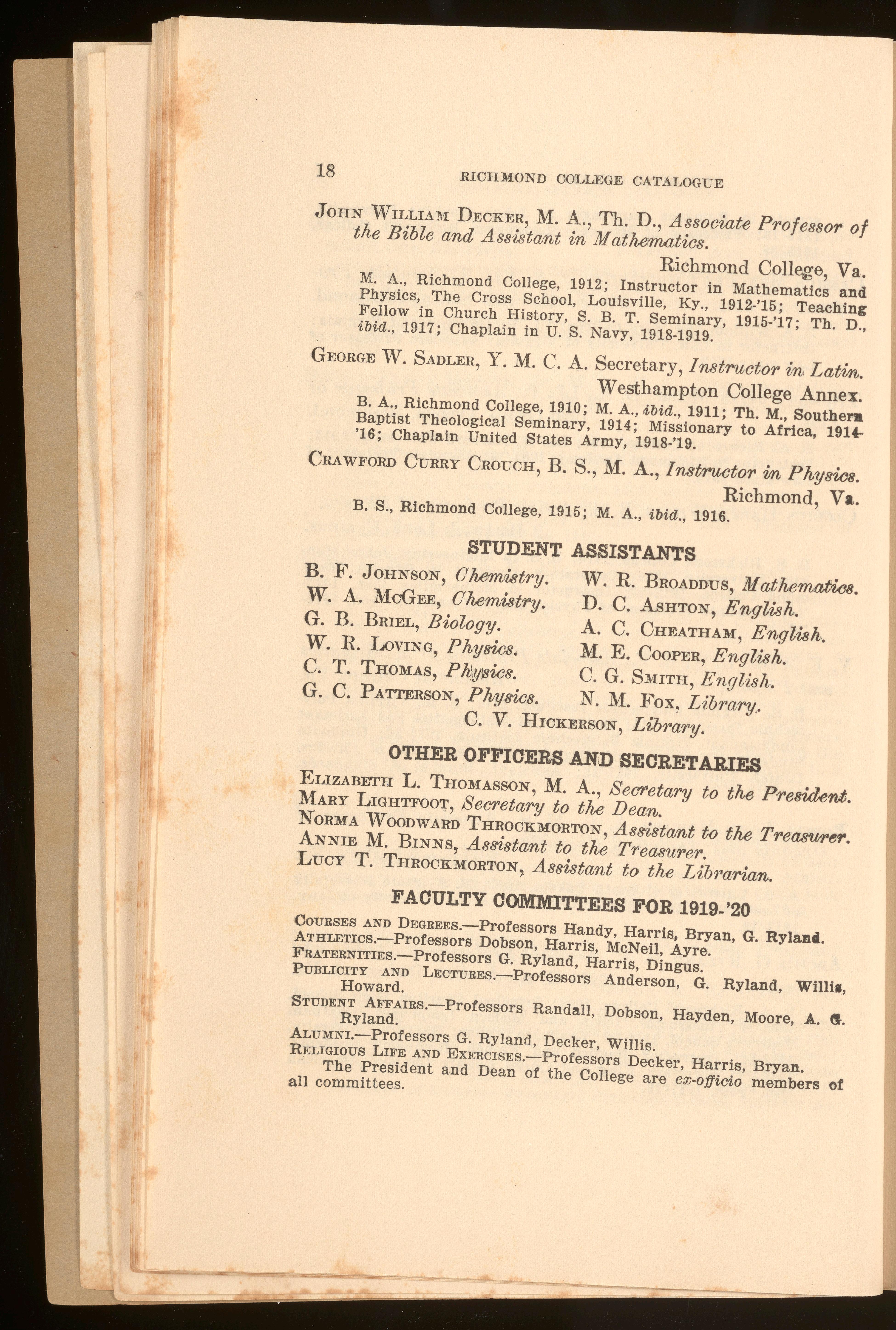
RICHMOND COLLEGE GATALOGUE
JOHN Wn..LIAM: DECKER, M. A., Th. D., Associate Professor of 'the Bible and Assistant in M aithemzatics.
Richmond College, Va. M. A., Richmond College, 1912; Instructor in Mathematics and Physics, The Cross School, Louisville, Ky., 1912-'15; Teaching Fellow in Church History, S. B. T. Seminary, 1915-'l 7; Th. D., ibid., 1917; Chaplain in U. S. Navy, 1918-1919.
GEORGE W. SADLER, Y. M. C. A. Secretary, Instructor im, Lat-in. Westhampton College Annex. B. A., Richmond College, 1910; M. A., tibid., 1911; Th. M., Southera Baptist Theological .Seminary, 1914; Missionary to Africa, 1914- '16; Chaplain United States Army, 1918-'19.
CRAWFORD CuRRY CRoucn:, B. S., M.A., Instructor 1/TI,Phy8W8. Richmond, Va. B. S., Richmond College, 1915; M. A., ibid., 1916.
B. F. JOHNSON, 01,,,etm;i,stry. W. R. BROADous, Mathe~. W. A. McGEE, OhemUJtry. D. C. AsHTON, Engli,sh. G. B. BRIEL, Biology. A. C. CHEATHAM, EnglUJh. W. R. Lovrna, Ph.y8W8. M. E. COOPER, English. C. T. THOMAS, Phty'IJics. C. G. SMITH, English. G. C. PATTERSON, P/vy8Ws. N. M. Fox, Library,. C. V. HICI{ERSON, Librarry.
ELIZABETH L. THOMASSON, M. A., Searetary to the Presiden;t. MARYLrGHTFoor, Secretary to the Dean.
NORMA WOODWARD THROCKMORTON, Ass-istant to the Treasurer.
ANNIE M. BrNNs, Assistant to the Treasurer.
Luer T. THROCKMORTON, AssUJtant to the Librarimn.
COMIY.[IT·TEESFOR 1919-'20
Cou&sEs .ANDDEGREEs.-Professors Handy, Harris. Bryan, G. Rylantl.
ATHLETics.-Professors Dobson, Harris, McNe il, Ayre. F&ATERNITIES.-Professors G. Ryland, Harris, Dingus. PuBLICITY .AND LECTURES.-Professors Anderson, G. Ryland, Willi•, Howard.
STUDENTAFF.Ams.-Professors Randall, Dobson, Hayden, Moore, A. Cl. Ryland.
ALUMNI.-Professors G. 'Ryland, Decker, Willis. RELIGIOUSLIFE .ANDEXEROISEs.-Professors Decker, Harris, Bryan.
· The President and Dean of the College are ex-officio members of all committees.
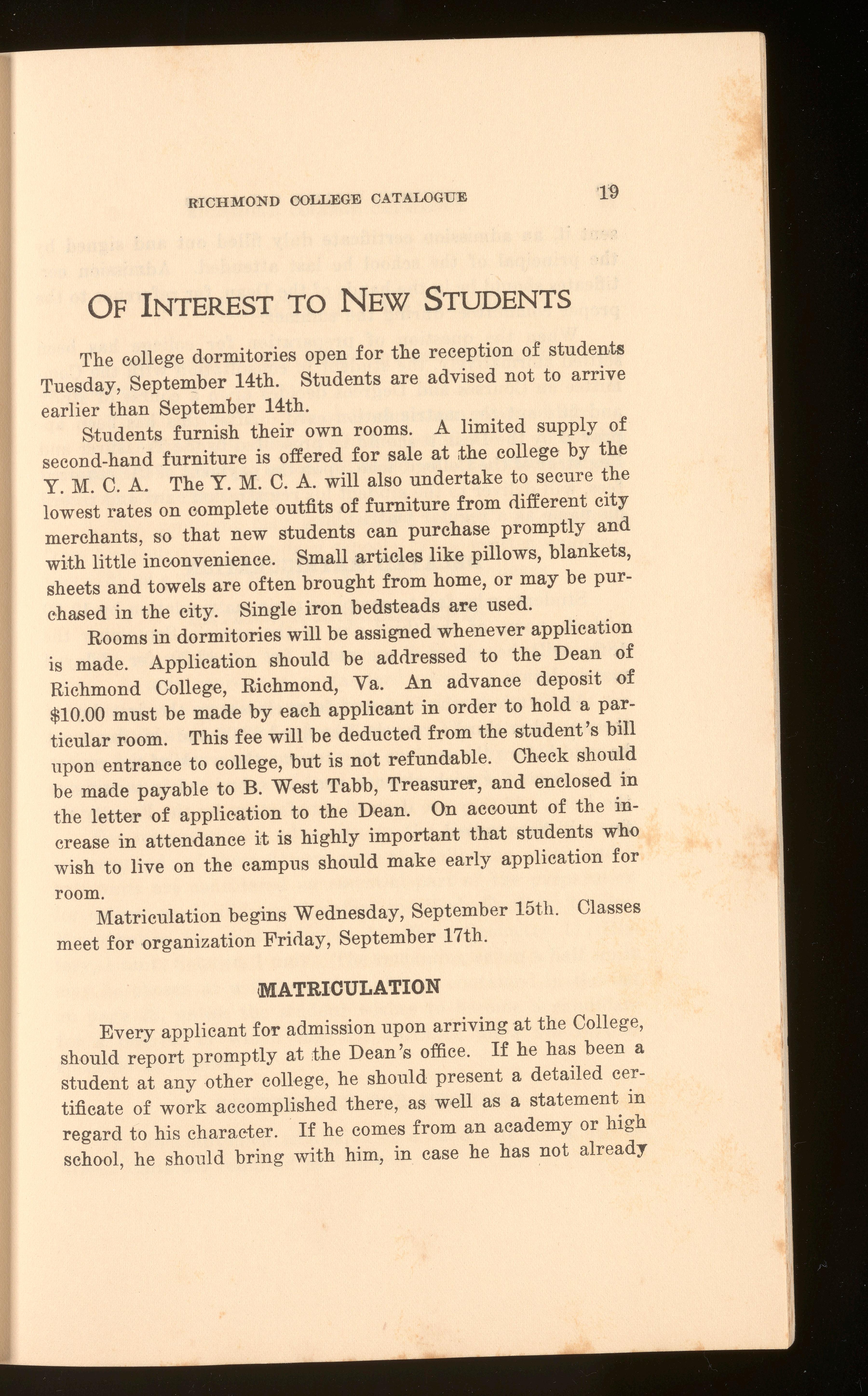
The c-ollege dormitories open for the reception of students Tuesday, Septell!ber 14th. Students are advised not to arrive earlier than September 14th. S,tudents furnish their own rooms. A limited supply of second-hand furniture is offered for sale at rthe college by the Y. M. C. A. The Y. M. C. A. will also undertake to secure the lowest rates on complete outfits of furniture from ilifferent city merchants, so that new students can purchase promptly and with little inconvenience. 'Small ·articles like pillows, blankets, sheets and towels are often brought from home, or may be purc-hased in the city. Single iron bedsteads are used. Rooms in dormitories will be assigned whenever application is made. Application should be adilressed to the Dean ,of Richmond College, Richmond, Va. An advance deposit of $10.00 must be made by each appliC'ant in order to hold a particular room. This fee will be deducteil from the student's bill upon entrance to college, but is not refundable. Check should be made payable to B. West Tabb, Treasurer, and enclosed in the letter ,of applic·ation to the D ,ean. On account of the increase in attendance it is highly important that students who wish to live on the campus should make early application for room.
Matriculation begins Wednesday, September 15th. Classes meet for organization Friilay, September 17th.
Every applicant f oir admission upon arriving at the College, sh,ould report promptly at the Dean's office. If he has been a student at any other college, he should present a detailed certificate of work accomplished there, as, well as a statement in regard to his character. If he come-s from an academy or high school, he should bring with him, in case he has not already

sent it, an admission certificate duly filled out and signed by th ·e principal of the school he last attended. Admission cer- tificates should be in the hands of the Dean, for reference to the proper committee, during the summer.
When the question of preparation for college has been settled affirmatively, the student in consultation with the Com- mittee on Courses and Degrees dec,ides upon a course of sturly and fills out the matriculation card. After this has been ap- proved by the Dean it should be presented to the Treasurer and Registrar of the CollBge, who, upon the p.ayment of the required fees, will deliver to the student his registration card and record • his name as a regular matriculate.
Students wh -o fail to complete their matriculation by 12 :00 o'clock, noon, of the ,third day of the session, September the 18th, will be charged an extra fee of $2.00 for delayed ma tri cul ation.
Any student vvho is absent from classes on the first day of the second or third terms shall be fined $2.00 and this fine must be paid before the student may resume the work of the eourse. The reasons for such absence may be submitted in writing to the Dean. If they are deemed satisfactory by the Faculty the fine vvill be returned.

For admission to the College the general conditions are as follows:
1. The applicant must be at least sixteen years of age.
2. The applicant should present a certificate of honorabl dismissal fro1n the last school attended or other sufficient evidence of good character.
3. The applicant may be admitted on: (1) A certificate from an accredited secondary school; (2) a written examination; (3) as a special student; ( 4) from other colleges.
The requirements for admission to College are stated in units. A unit represents a standard session's study in any subject in an aceredited secondary school and constitutes approximately a quarter of a year's work. The necessary preparation for college entr.ance may be .evidenced by a diploma of graduation from any standard four-year high school of the State.
For unconditioneil admission to the C·ollege fifteen units are required; of these fifteen units the following seven and a half units are considered an essential part of the preparation for college work and are the ref ore specified: English, 3 units; Mathematics, 2½ units (Algebra 1-½,Plane Geometry 1) ; History, 1 unit; Scienee, 1 unit. The remaining seven a half units may be chiosen at will from the subjects contained · in the list on page 23, unless the student wishes to become a candidate for a degree, in which case his entrance units are further specified as. follows :
For unconditioned admission as a candidate for a degree fifteen 11nits are required as follows:

RICHMOND COLLEGE CATALOGUE
1. As- Candidate for the B. A. Degree.-English, 3 units; 1\fathen1atics, 2½ units (Algebra 1½, Plane Geometry 1) ; History, 1 unit; Science, 1 unit; Latin, 4 units or Q-reek, 2 units. The remaining units are elective.
2. As Candidate for the B. S. Degree.-English, 3 units; Mathematics, 2½ units (Algebra 1-½,Plane Geometry 1) ; History, 1 unit ; Science, 1 unit; l\riodern Languages (French, German, Sp.anish), 2 units. The remaining units are elective.
F.or conrlitioned admission to the College thirteen units are required with the understanding that the remaining two units are it.o be made up within two years. The thirteen units must include (1) the seven and a half specified units: English, 3 units; Mathematics, 2½ units, History, 1 unit; Science, 1 unit, and (2) a sufficient number of units in Foreign Languages to enable the student to remove all eonditions in language within 'I ~wo years after entrance. These conditions may be removed by private study and certified examinations, or by taking certain courses* in the College, or in an approved summer sch,ool. No course taken to remove a condition may be counted for credit toward a degree.
Conditioned students will be admitted only when, in 1the judgment of the De.an and Faculty, circumstanees seem to warrant such concession.
Students who are twenty years of age or older and who have not as many as thirteen units, but who give -satisfactory evidence of fitness to pursue college studies, may be admitted as special students.
A conditioned student, or a special student, may become a eandid.ate for a degree only bysatisfying the requirements for admission to degree courses as specified above. In all cases of entrance, ,vhether unconditional or conditional or special, the *French 1, German 1, Spanish 1, Greek 1, may be used tor removing entrance conditions.
general regulations are those prescribed by th ·e Association of Colleges and Seeondary Schools of the Southern States, · oi which Richmond Cnllege is a me1nber.
The following is a partial list ~dmission and their values in units. 11nits follow the table: of subjec,ts accepted for Fuller definitions of the
Subjects
English
Mathematics

History
Latin
0reek
French
German
lpanish
Science
Drawing
Selections from English Literature.
History of English and American Literature.
Algebra to Quadratic Equations ............
1 Quadratics, Progressions, etc.
I Mediaeval and 1\/I:odern History.
English IIistory
American History
Gra1nmar, Composition, Translation.
l
Caesar's Gallic War, I-IV; Gram., Composition.. 1 Cicero's Orations ( 6) ; Grammar, Composition. . 1
I' Virgil's Aeneid I-VI; Grammar Composition. 1
, Gramm~r, Composition, Translation.
l
·Xenophon's Anabasis, I-IV; Gram., Composition. 1 Grammar, Composition, Translation ............ · 1 Translation, Grammar, C'Omposition ............ f 1 Advanced Classics, Composition, Conversation.. 1 Advanced Classics, Composition, Conversation. . 1 I Grammar, Composition, Translation.
r Translation, Grammar, Composition.
1
1
Advanced Classics, Composition, Conversation. . 1 Advanced Classics, Composition, Conversation. . 1 f Grammar, Composition, Translation.
l Translation, Grammar, Composition.
I Physical Geography
1
1
1 Chemistry, with Experiments.
Physics, with Experiments.
1
1 Botany
Zoology

The following statement indicates the amount of prepara- tion expected in each subject:
1. English-Four units; 3 required:
The English requirements may be divided as follows:
(a) English Grammar and Grammatical Analysis. One unit.
(b) Composition and Rhetoric, with special en1phasis upon punctuation, sentence structure, and para .. graphing. One unit.
( c ) Careful reading and study of selections from Eng. lish Literature. One u11it.
( rl ) rrhe IIistory of ~Jnglish and American Literature. One unit.
The aim of this course is to foster in the student the habit of intel- ligent reading and to develop a taste for good literature, by giving him a first hand knowledge of some of the best specimens. He should read the books carefully, but his attention should not be so fixed upon details as to cause his missing the main purpose and charm of what he reads.
With a view to a great freedom of choice, the books provided for reading are arranged ill the following groups, from which at least ten :selections are to be made-two from each group:
Group I: CLASSICSIN TRANSLATION.The Old Testament, compris- ing at least ' the chief narrative episodes in Genesis, Exodus, Joshua, .Judges, Samuel, Kings, and Daniel, together with the books of Ruth and Esther; The Odyssey, with the omission, if desired, of l3ooks I, II, III, IV, V, XV, XVI, XVII; The Iliad, with the omission, if desired, of Boou XI, XIII, XIV, XV, XVII, XXI; The .lEneid. The Odvssey, Iliad and .lEneid should be read in English translations of recognized literary excellence.
(For any selections from this group a selection fron1 any other group may be substituted.)
Group 2: SHAKII~SPEARE.Shakespeare's A Midsummer Night's J)ream, The Merchant of Venice, ~s You Like It, Twelfth Night, Th e 1 1 c1npest, Romeo and Juliet, King John, Richard II, Richard III, Henry V, Coriolanus, Julius Caesar, Macbeth, Hamlet (if not chosen for study un 1er B).
Group 3: P~osE FICTION. Malory's Morte cl/Arthur (about 108 pages) ; Bunyan's Pilgrim's Progress, Part I:,· Swift's GulUver' s Travels ( voyages to Lilliput and to Brobdingnag) ; Defoe's Robinson Crusoe, Pa1·t I; Goldsmith's Vicar of Wakefield; Frances Burney's Evelina; any one of Scott's Novels; any one of Jane Austen's Novels; Maria Edge- ,vorth's Castle Rackrent, or The Absentee:,· and one of Dickens' Novels; any one of Thackeray's Novels; any one of George Eliot's Novels; Mrs. Gaskell's Cranford; Kingsley's Westward Ho! or Hereward, the Wake:,· ·Reade's The Cloister and the Hearth:,. Blackmore's Lorna Doone :,.
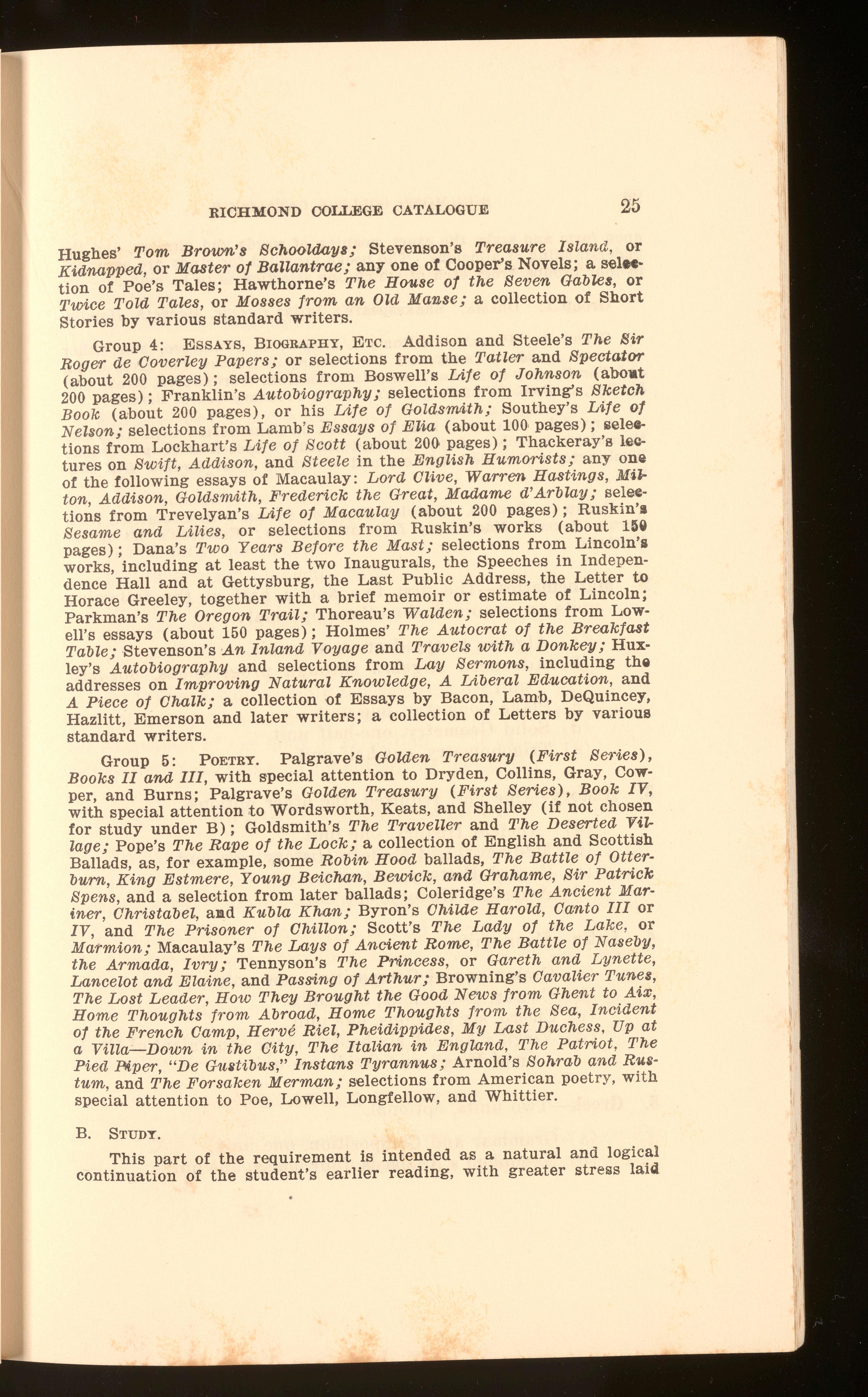
Hughes' Tom Br()Wlfl,'8 Schooldays; Stevenson's Treasure Island, or Kidnapped, or Master of Ballan -trae; any one of Cooper's Novels; a selee• tion of Poe's Tales; Hawthorne's The H o,use of the Seven Gabl.es, or Twice Told Tales, or Mosses from an Ola Ma11,se;a collection of Short Stories by various standard writers.
Group 4: EssAYS, BIOGRAPHY,ETc. Addison and Steele's The Bir RogeJr de 1Coverley Papers; or selections from the Tatler and Spectator ( about 200 pages) ; selections from Boswell's I.Ate of Johnson ( abo11t 200 pages); Franklin's Autobiography; selections from Irving's Sketch Book (a bout 200 pages), or his Life of Goldsrwi.th; Southey's Life of Nelson; selections from Lamb's Essays of Elia ( about 100, pages) ; seleotions from Lockhart's Life of Scott (about 200 pages); Thackeray's leotures on Swift, Addis'On, and Steele in the English Humorists; any one of the following essays of Macaulay: Lord Olive, Warren Hastings, MiJton, .Addison, Goldsmi-th, Frederick the Great, Madame d' Arb lay; selections from Trevelyan's Life of Macaulay (about 200 pages); Ruskin's Sesame and Lilies, or selections from Ruskin's works (about 15i pages) ; Dana's Two Years Before the Mast; selections from Lincoln's works, including at least the two Inaugurals, the Speeches in Independence Hall and at Gettysburg, the Last Public Address, the Letter to Horace Greeley, together with a brief memoir or estimate of Lincoln; Parkman's The Oregon Trail; Thoreau's Walden_; selections from Lowell's essays (about 150 pages); Holmes' The Autocrat of the Breakfast Table; •Stevenson's :.An Inland Voyage and Travels with a Donkey; Huxley's Autobiography and selections from Lay Sermons, including the addresses on Improving Natural Knowledge, A Liberal Education, and .A Piece of Chalk; a collection of Essays by Bacon, Lamb, DeQuincey, Hazlitt, Emerson and later writers; a collection of Letters by various standard writers.
Group 5: POETRY. Palgrave's Golden Treasury (First Series), Books II and III, with special attention to Dryden, Collins, Gray, Cowper, and Burns; Palgrave's Golden Treasury (First Series), Book IV, with special attention to Wordsworth, Keats, and Shelley (if not chosen for study under B) ; Gold •smith's The Traveller and The Deserted Village; Pope's The Rape of the L -ock; a collection of English and Scottish Ballads, as, for example, some Robin Hood ballads, The Battle of Otterbwrn, King Estmere, Young Beichan, Bewick, and Grahame, Sir Patrick Spens, and a selection from later ballads; Coleridge's The Ancient lsfariner, Christabel, a:m.dKubla Khan; Byron's Ohilde Harold, Canto III or IV, and The Prisoner of Ohillon; Scott's The Lady of the Lake, or Marmion; Macaulay's The Lays of Ancient Rome, The Battle of Naseby, the .Armada, Ivry; Tennyson's The Pmncess, or Gareth and Lynette, Lancelot and Elaine, and Passing of Arthur; Browning's Cavalier Tune,, The Lost Leader, Hoiv They Brought th .e Good News from Ghent to A.ix, Home Thoughts from Abroad, Home Thoughts from the Sea, Inciaen ,t of the French Camp, Herve Riel, Pheidippides, My Last Duchess, Up at a Villa- - Down in • the City, The Italian in England, The Patriot, The Pied PJlper, "De Guatibus," Instans Tyrannus; Arnold's Soh-rab and Ruitum, and The Forsalcen Merman; selections from American poetry, with special attention to Poe, Lowell, Longfellow, and Whittier.
B. STUDY.
This part of the requirement is intended as a natural and logical continuation of the student's earlier reading, with greater stress laicl
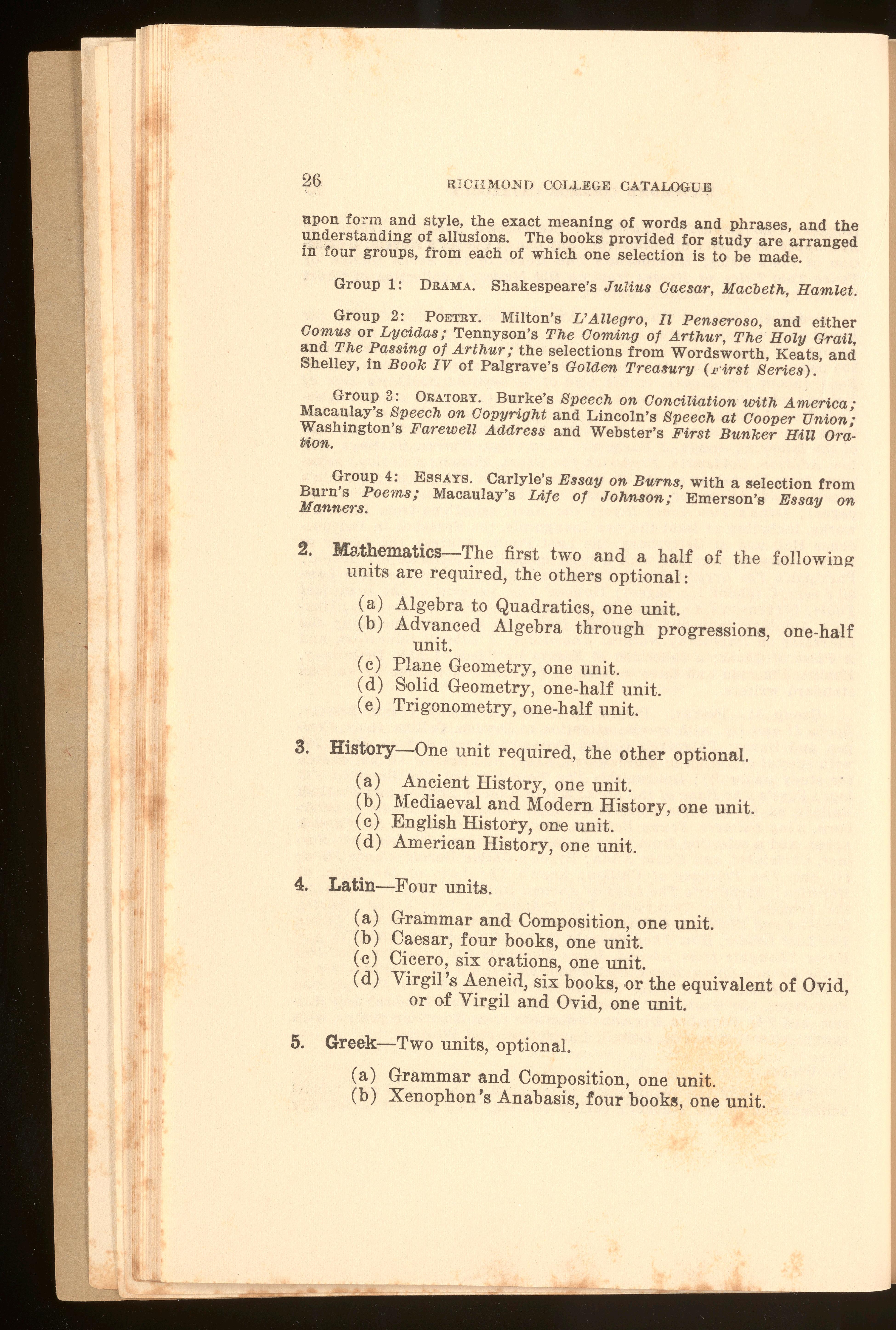
upon form and style, the exact meaning of words and phrases, and the understanding of allusions. The books · provided for study are arranged in · four groups, from each of which one selection is to be made.
Group 1: DRAMA. Shakespeare's Julius Caesar, Macbeth, Ham let.
Group 2: POETRY. Milton's L' Allegro, Il Penseroso, and either Oomus or Lycidas; Tennyson's The Corning of Arthur, The Holy Grail, and The Passing of Arthur; the selections from Wordsworth, Keats, and Shelley, in Book IV of Palgrave's Golden Trea8ury (1:'irst Series).
Group 3: ORATORY.Burke's Speech on Conciliation · with America; Macaulay's Speech on Copyright and Lincoln's Speech at Cooper Union; Washington's Farewell Address and Webster's First Bunker Hdll Ora- tion.
Group 4: Ess.AYs. Carlyle's Essay on Burns, with a 3election from Burn's Poems; Macaulay's Life of Johnson; Emerson's Essay on Manners.
2. Mathematics-The first two and a half of the following units are required, the others optional:
(a) Algebra to Quadratics, one unit.
(b) Advanced Algebra through progression -~, one-half unit.
( c) Plane Geometry, one unit.
( d) Solid Geometry, one-half unit.
( e) Trigonometry, one-half unit.
3. History-One unit required, the other optional.
(a) Ancient History, one unit.
(b) Mediaeval and Modern History, one unit.
( c) English History, one unit.
( d) American History, one unit.
4. Latin-Four units.
(a) Grammar and Composition, one unit.
(b) Caesar, four books, one unit.
(-0) Cicero, six orations, one unit.
( d) Virgil's Aeneirl, six books, or the equivalent of Ovid, or of Virgil and Ovid, one unit.
5. Greek-Two units, optional.
(a) Grammar and Composition, one unit.
(b) Xenophon's Anabasis, four boob, one unit.
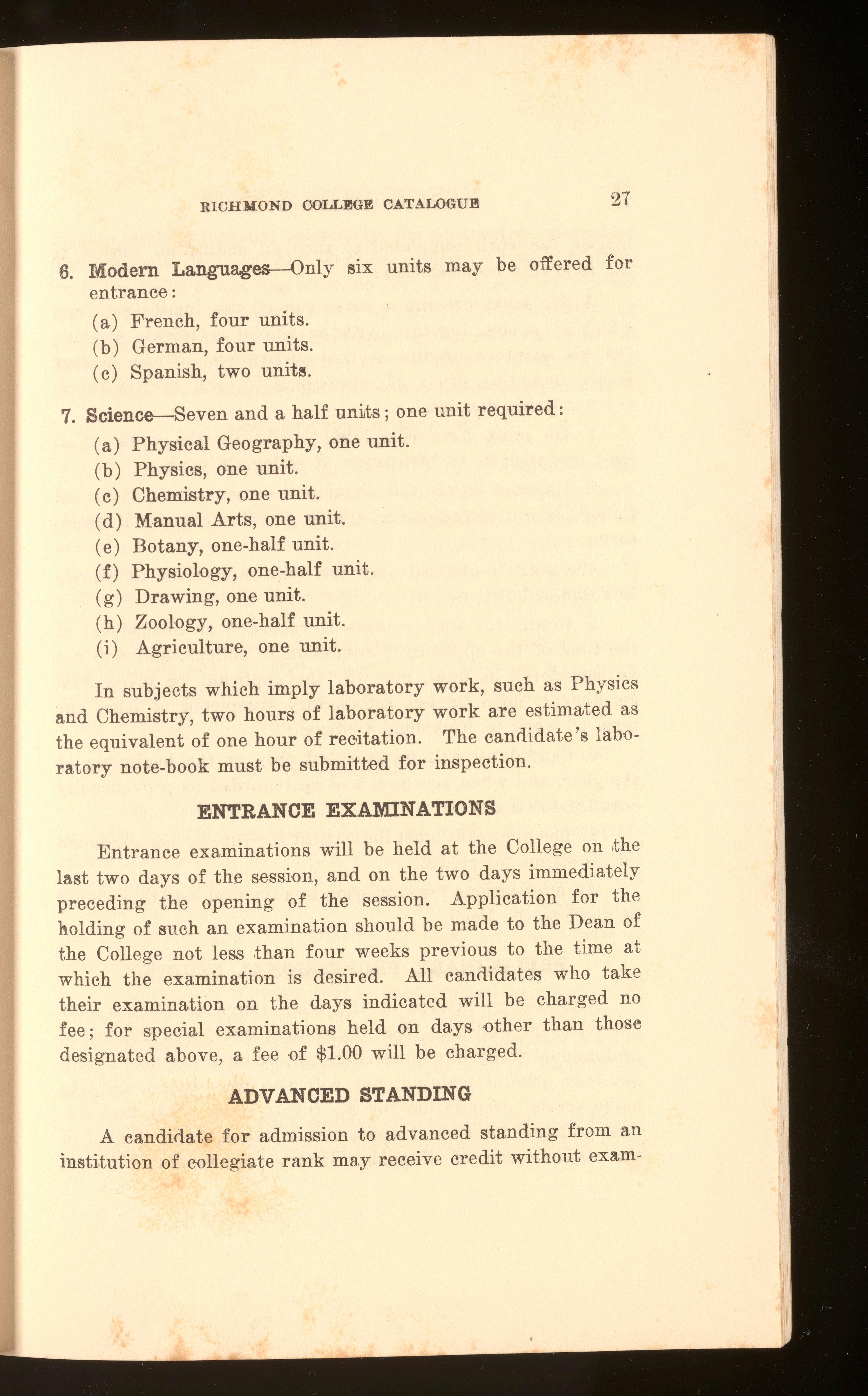
6. Modern Language&--Only six units may be offered for entrance:
(a) French, four units.
(b) German, four units.
( c) Spanish, two unit~.
7. Scienc~S 1even and a half units; one unit required:
(a) Physical Geography, one unit.
(b) Physics, one unit.
(
c) Chemistry, one unit.
( d) Manual Arts, one unit.
( e) Botany, one-half unit.
(f) Physiology, one -half unit.
(g) Drawing, one unit.
(h) Zoology, one-half unit.
( i) Agriculture, one unit.
In subjects which imply laboratory work, such as Physics and Chemistry, t,vo hours of laboratory work are estimated ·as the equivalent of one hour of re0itation. The canrlidate 's lab-oratory note-book must be submitted for inspection.
Entrance examinations will be held at the College on ,the last two days of the session, and on the two days immediately preceding the opening of the session. Application for the holding of such an examination should be made to the Dean of the College not less .than four weeks previous to the time at which the examination is desired. All canrlidates who take their examination on the days indicated will be charged no fee; for special examinations held on days other than those designated above, a fee of $1.00 ,vill be charged.
A candiilate for admission to advanced standing from an institution of eollegiate rank m.ay receive credit without exa . m-
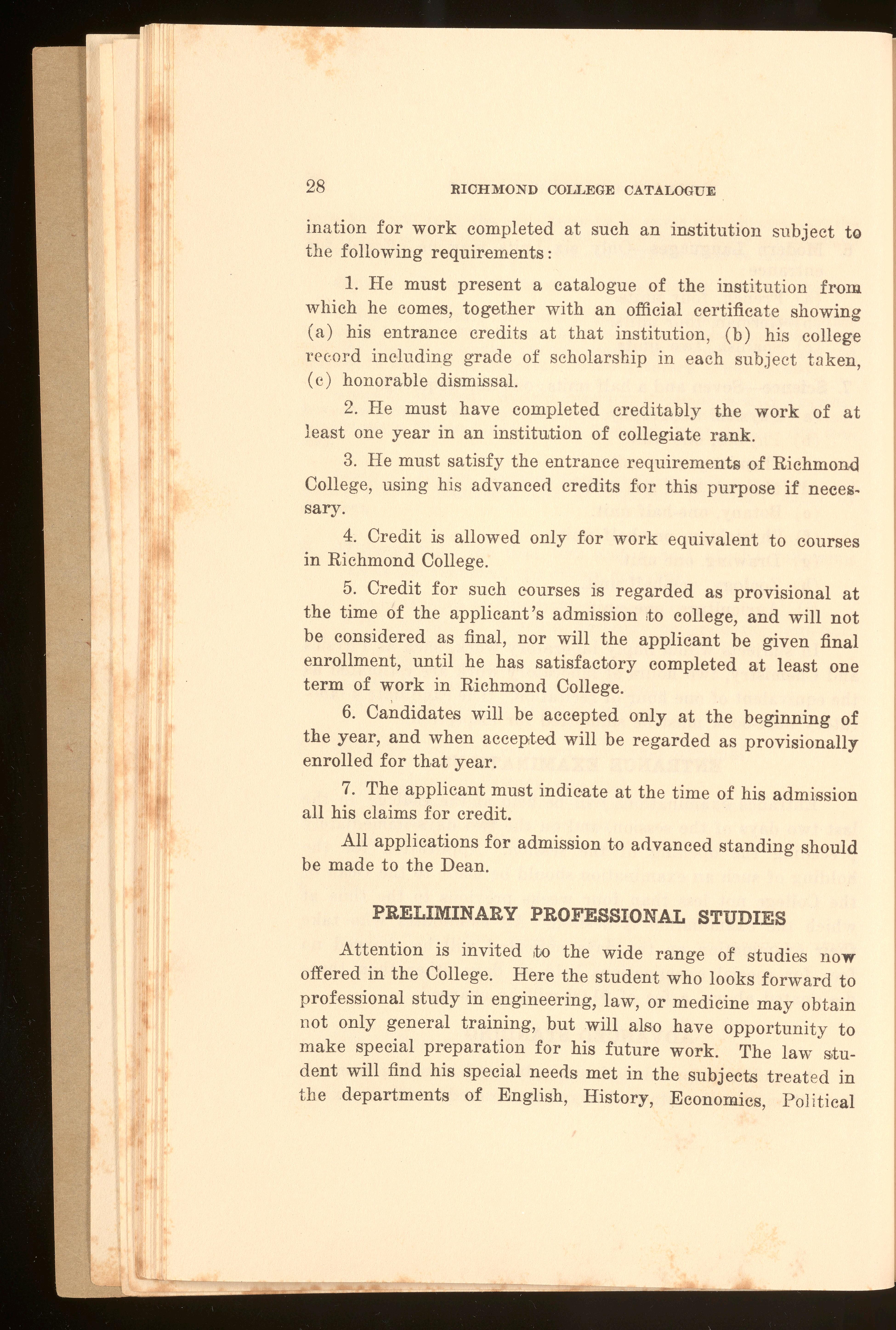
ination for work completed at such an institution subject to the f ollo,ving requirements :
1. I-le must present a catalogue of the institution from ,vhich he comes, together with an official certificate showing (a) his entrance credits at that instit11tion, (b) his college reeord including grade of scholarship in each subject taken, ( c) honorable dismissal.
2. He must have completed creditably the work of at least one year in an institution of collegiate rank.
3. He must satisfy the entran ·ce requirements of Richmond College, using his advancerl credits for this purpose if neces sary.
4~ Credit is allowed only for work: equivalent to courses in Richmond College.
5. Credit for such eourses is regarded as provisional at the time of the applicant's admission to college, and will not be considered as fin.al, nor will the applicant be given final enrollment, until he has satisfactory completed at least one term of work in Richmond College.
6. Candidates will be accepted only at the beginning of the year, and when accepted will be regarded as provisionally enrolled for th.at year.
7. The applicant must indicate at the time of his admission all his claims for credit. ·
All applications for admission to advanced standing should be made to the Dean.
Attention is invited rbo the wide range of studies now offered in the College. Here the student who looks forward to professional study in engineering, law, or medicine may obtain not only general training, but will als-o have opportunity to make special preparation for his future work. The la,v s,tudent will find his special needs met in the subjects treated in the departments of English, History, Economics, Political
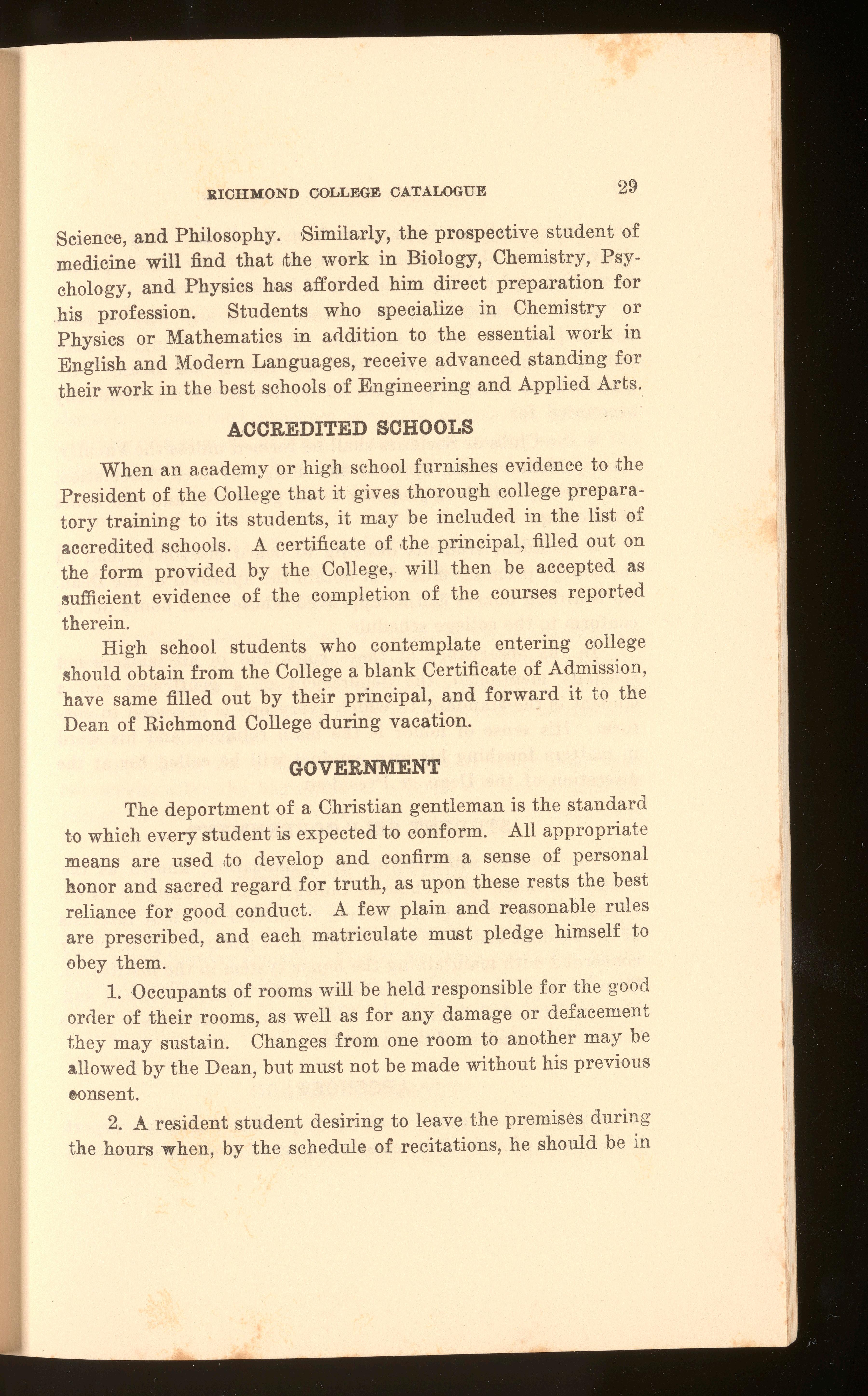
Scienc-e, and Philosophy. ,Similarly, the prospective student of medicine will find that 1the work in Biology, Chemistry, Psychology, and Physics has afforded him direct preparation for his profession. Students who specialize in Chemistry or Physics or Mathematics in arldition to the essential work in English and Modern Languages, receive advanced standing for their work in the best schools of Engineering and Applied Arts.
When an academy or high school furnishes evidenc-e to ,the President of the College that it gives thorough college preparatory training to its students, it may be includerl in the list of accredited schools. A certificate of ithe principal, filled out on the form provided by the C'Ollege, will then be accepted as 8ufficient evidenc~ of the completion of the courses reported therein.
High school students who contemplate entering college should obtain from the College a blank Certificate of Admission, have same filled out by their principal, and forward it to the Dean of Richmond College during vacation.
Th •e deportment of a Christian gentleman is the standard to which every student is expected to conform. All appropriate means are used 1to rlevelop and confirm a sense of personal honor and sacred regard for truth, as upon these rests the best relianc-e for good conduct. A few plain and reasonable rules are prescribed, and each m.atriculate must pledge himself to obey them.
1. ·Occupants of rooms will be held responsible for the good orrler of their rooms, as w ·ell as for any damage or defacen1ent they may sustain. Changes from one room to another may be allowed by the Dean, but must not be made with·out his previous wnsent.
2. A resident student desiring to leave the premises during the hours when, by the schedule of recitations, he should be in
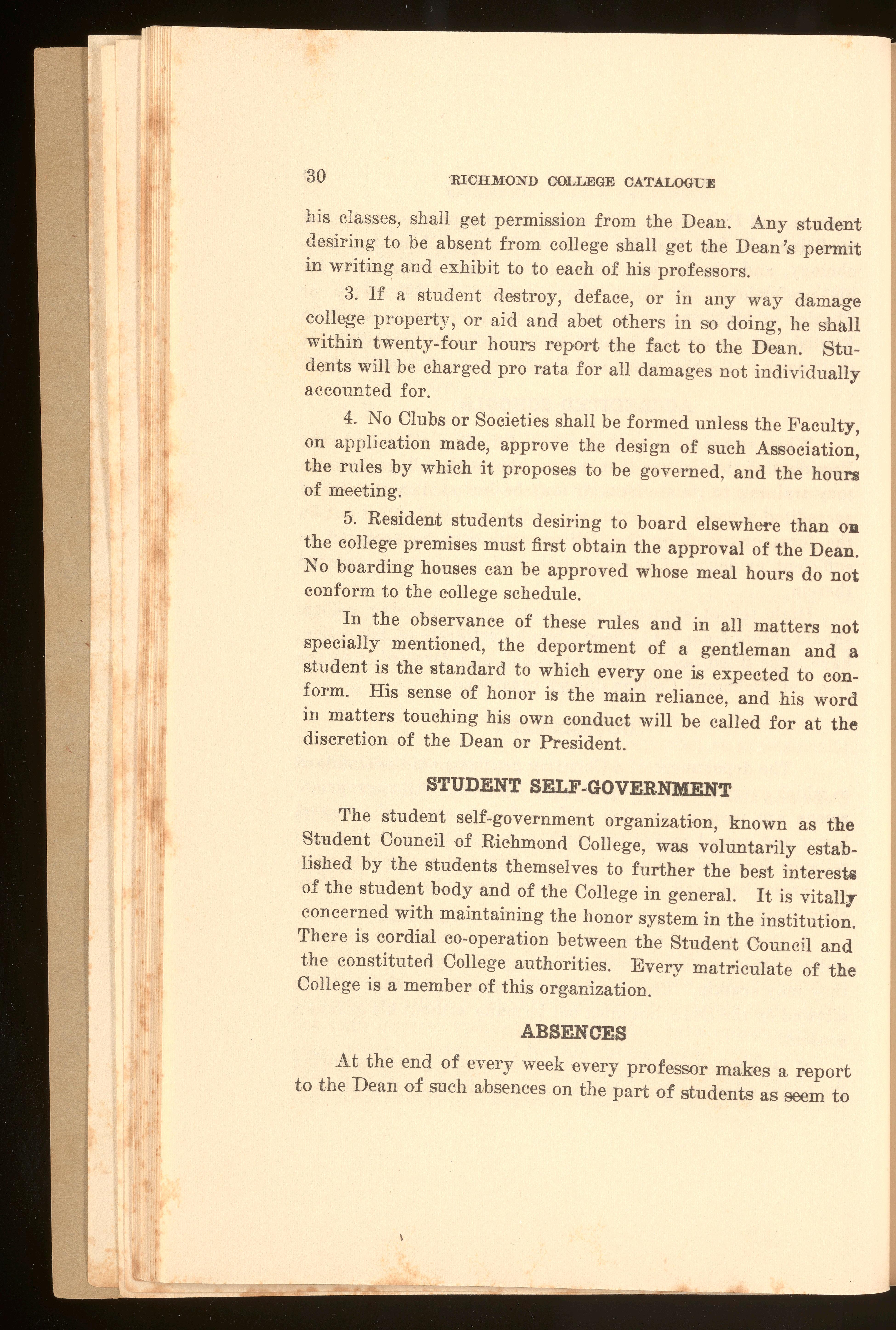
his classes, shall geit permission from the Dean · . Any student desiring to be . absent from college shall get the De.an 's permit in writing and exhibit to to each of his professors.
3. If a student rlestroy, deface, or in any way dama.ge college property, or aid and abet others in so doing, he shall within twenty-four hours report the fact to the Dean. Students will be charged pro rata for all damages not individually accounted for.
4. No Clubs or Societies shall be formed unless the Faculty, on application made, approve the <lesign of such Association, the rules by which it proposes to be governed, and the houn of meeting.
5. Resident students desiring to board elsewhere than 011 'the college premises must first obtain the approval of the Dean. No boarding houses can be approved whose meal hours do not conform to the eollege schedule.
In the observance of these n1les and in all matters not specially mentionerl, the deportment of a gentleman and a student is the standard to which every one is expected to con- form. His sense of honor is the main reliance, and his word in matters touching his own conduct will be called for at the discretion of the Dean or President.
The student self-governm .ent organization, known as the Student Council of Ric,hmonrl College, was voluntarily estab- lished by the students themselves to further the best interests of the student body and of the College in general. It is vitally concerned with maintaining the honor system in the institution. There is cordial co-operation between the Student Council and the constituterl College authorities. Every matriculate of the College is a member of this organization.
At the end of every week every professor makes a report to the Dean of such absences on the part of students as seem to

call for the Dean's attention. In ease a student has a proper explanation for absence from class, he should present it either to the professor himself or to the Dean. Permission to be absent from College should be obtained from the Dean in. advance.
E ·xcuses for unexpected but neeessary absences should be obtained from the Dean within a week from the date of such absence. Unexcused absences seriously reduce the seholastie standing of a student, and may cause failure on the work of the month or term. A student who systematically absents himself from class will be dropped from the College rolls. The Faculty regards this form of neglect of College duties as particularly serious, both because of its interference with scholastic- standing and its detrimerut·al effect on character.
If a student ·desires to make a change in his course of study he should make his application in person to the Dean, who will advise him in the matter. No student is permitted either to drop a study or to take up a study without the advice anfl approval of the Dean.
Application for a change in a course of study later thu. two weeks after the beginning of a term will not be granted exeept in rare cases and then only upon the payment of a fee of $1.00.
Students have easy access to all ithe advantages afforded by the various city and suburban churches, with their Bible classes and Sunday schools. Prayer meetings conducted by the students themselves are held once, or oftener, every week. On.
Sundays ·at 7 :15 P. M., Richmond College and Westhampton College unite in a Vesper Service for praise and prayer and a brief spiritual message.
For !twenty minutes (11 :00 to 11 :20) each day, Monday to Friday inclusive, all classes are suspended for chapel assembly.__

Exercises are conducted by the President, Dean, or some other member of the Faculty; from time to time specially invited speakers may be heard on educational, civic, and religious themes. Attendance is required of all stuclents in the College of Liberal Arts unless specially excused. Absences from chapel amounting rto one-tenth of the number of assemblies eac-h term are allowed.
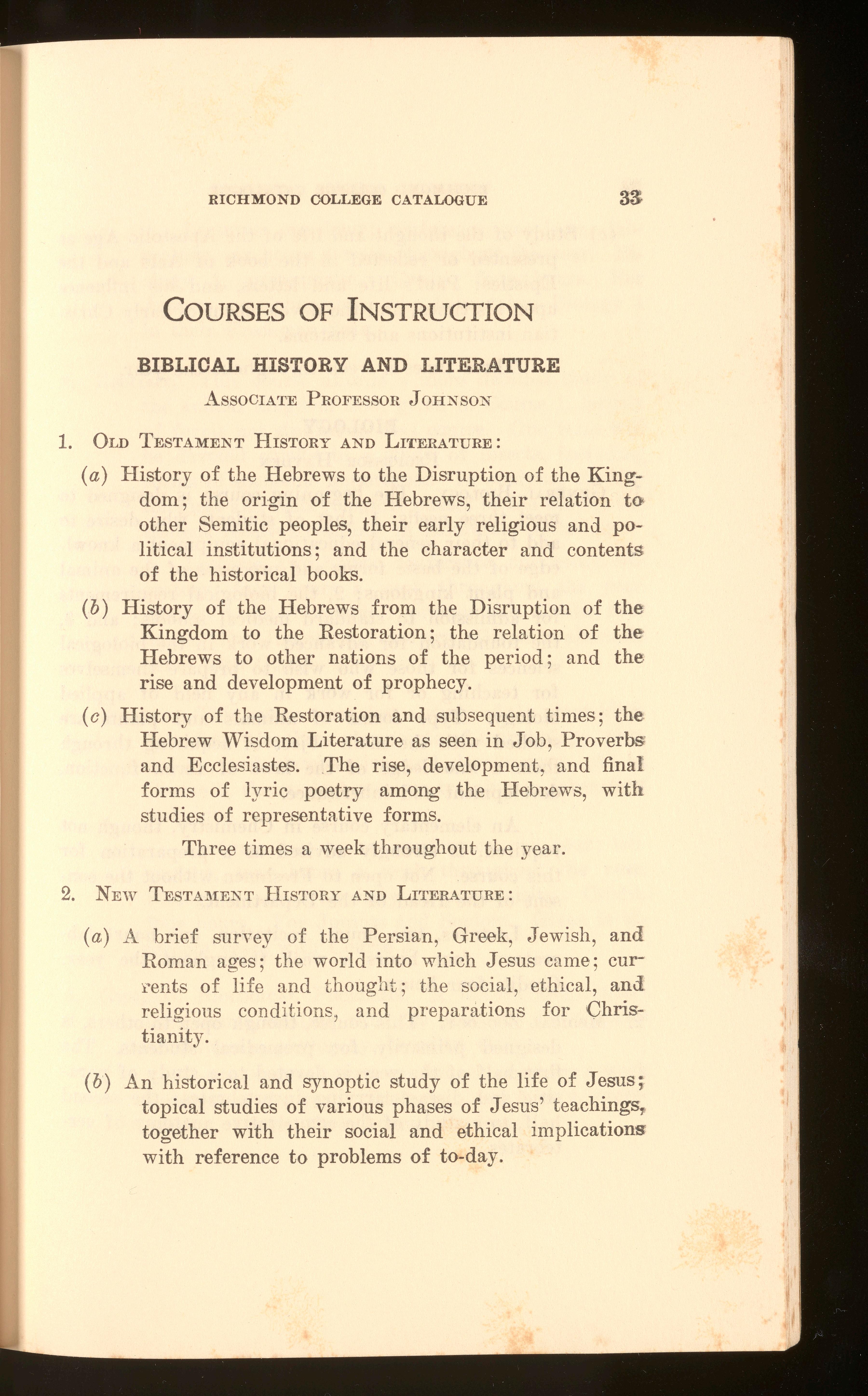
BIBLICAL HISTORY AND LITERATURE
AssocrATE PROFESSOR Jor-INSON
1. Ow TESTAMENT HrsTORY AND LITERATURE :
(a) History of the Hebrews to the Disruption of the Kingdom; the origin of the Hebrews, their relation to other Semitic peoples, their early religious and political institutions; and the character and contents of the historical books.
(b) History of the Hebrews fro:µi the Disruption of the Kingdom to the Restoration; the relation of the Hebrews to other nations of the p ·eriod; and the rise and development of prophecy.
( c) History of tl1e Restoration and subsequent times; the Hebrew Wisdom Literature, as seen in Job, Proverbs and Ecclesiastes. The rise, development, and final forms of lyric poetry among the Hebrews, with studies of representative forms.
Three times a week throughout the year.
2. NE,v TESTAl\IENT I-IrsTORYAND LITERATURE:
( a.) A brief survey of tl1e Persian, Greek, Jewish, and Roman ages; the world into ,vhich Jesus came; cur:t~ents of life and thought; the social, ethical, and : religious conditions, and preparations for Christianity.
(b) An historical and synoptic study of the life of Jesus; topical studies of various phases of Jesus' teachings, together with their social and ethical implications with reference to problems of to-day.

( c) Study of the thought and life of the Apostolic Age as presented or reflected in the book of Acts and the Epistles; Paul's life and letters, and his influence upon his times; and the development of early Christian institutions and customs.
Three times a week throughout the year.
1~ GENERAL BIOLOGY.The beginning course is designed to meet three needs: 1, that of students who desire to add to their general educational equipment a knowledge of the basic f or1ns and processes of the animal and plant kingdoms; 2, the biological requirements for admission to standard. medical schools ; and 3, the foundation for advanced work in the biological sciences for those who wish to prepare themselves for teaching or for work in any field of applied biology. Type forms of animals and plants are studied with the main object of acquiring through them a knowledge of the laws of form, function, development and inheritance.
An elementary course in Chemistry, though not required, is stron · gly advised as a preparation for this course. Not open to Freshmen without the consent of the Head of the Department.
Lectures, two hours; recitation, one hou · r; laboratory, four hours a weel{ throughout the year. Credit, four hours.
2. MEDICAL ZooLOGY. This course, though open to others, is designed primarily for premedical students. The first half of the year is devoted to a study of parasitic and disease-carrying invertebrates; the second half, to a study · of the comparative , anatomy of vertebrates.

Lectures, one hour ; conference, one hour ; laborator·y, six hours a wee·k throughout the year. Biology 1, prerequisite. Credit, four hours. For Juniors, or Sophomores who have taken Biology 1 in their Freshman year.
3. ZooLOGY. This course a:ffords a more detailed study of the animal kingdom than given in Course 1, largely of forms not studied in that course. One term will be devoted chiefly to a study of insects, including forms of economic importance. In studying the histological and embryological phases of the subject the student receives training in laboratory technique.
Lectures, two hours; conference, one hour ; laboratory, four hours a week throughout the year. Biology 1 and ,Chemistry 1, prerequisite. Credit, four hours. For Juniors and Seniors. Given in alternate years with Course 4.
4. BoTANY. This course comprises a study of the plant kin,gdom from the three viewpoints of morphology, physiology, and classification and development. As in Course 3, the student receives training in laboratory technique. '
Lectures, two hours; conference, one hour; laboratory, four hours a week throughout the year. Biology 1 and Chemistry 1, prerequisite. Credit, four hours. For Juniors and ,Seniors. Given in alternate years with Course 3.
5. GENERAL BIOLOGICAL PROBLEMS. A lecture and conference course, dealing with the problems and theories of ontogeny, p,hylogeny, heredity, etc.
Lectures, two hours; conference, one hour a week throu · ghout the year. Biology 1 and 3 or 4, prerequisite. C'redit, three hours. Seniors.
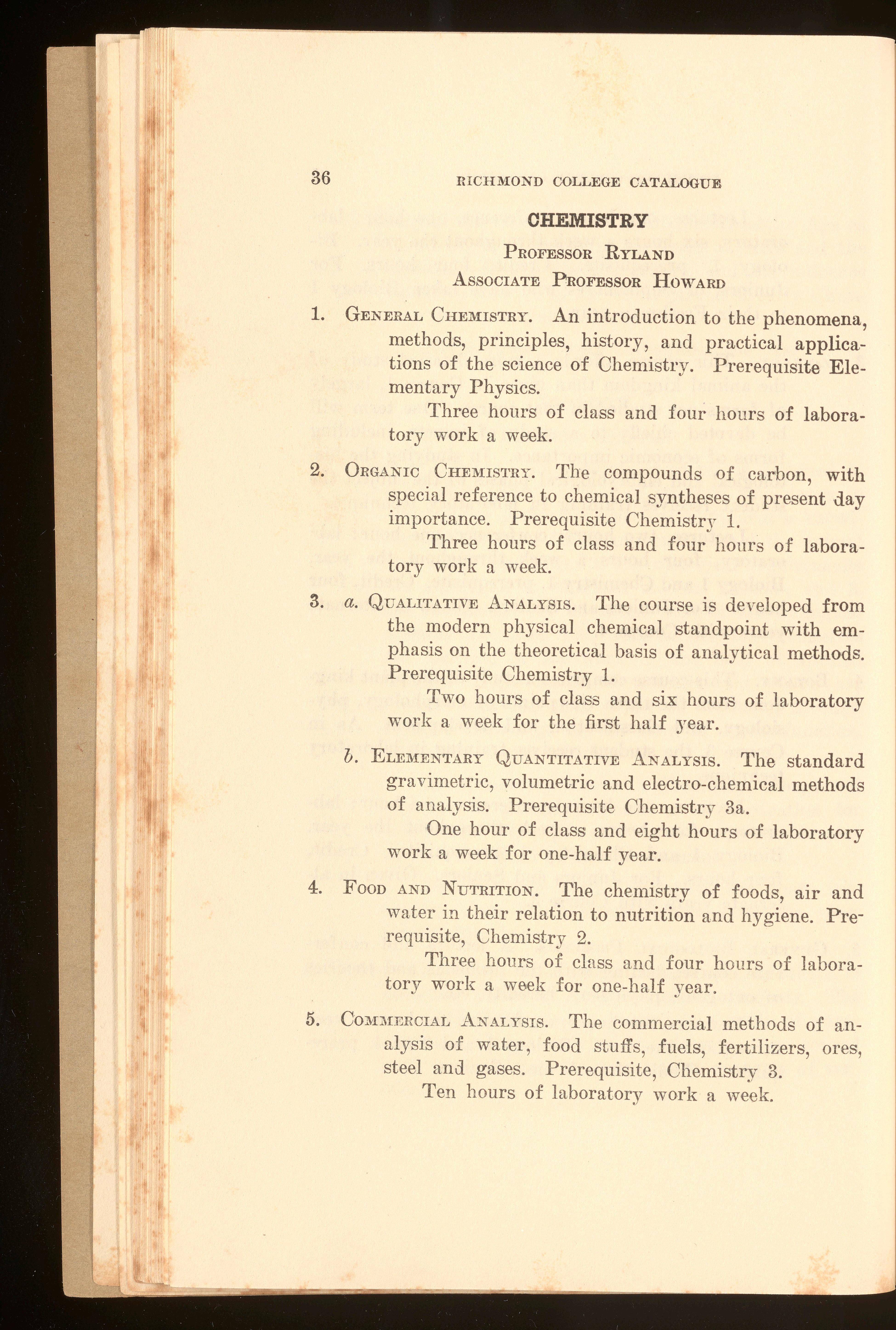
RICHMOND COLLEGE CATALOGUE.
CHEMISTRY
PROFESSORRYLAND
AssocIATE PRoFEssoR HowARD
1. GENERAL C1IEMISTRY. An introduction to the phenomena, methods, principles, history, and practical applica.tions of the science of Chemistry. Prerequisite Elementary Physics.
'I,hree hours of class and four hours of laboratory work a week.
2. ORGANIC CHEJ.\,IIS'l'RY.'The compounds of carbon, with special reference to chemical syntheses of present •day importance. Prerequisite Chemistry 1.
Three hours of class and four hours of laboratory work a ,veek.
3. a. QUALITATIVEAN ALYsrs. The course is developed from the 1nodern physical chemical standpoint with emphasis on the theoretical basis of analytical methods. Prerequi$ite Chemistry 1.
Two hours of class and six hours of laboratory ,vork a week : for the first half year.
b. ELEMENTARYQUANTITATIVEANALYSIS. The standard gravimetric, volumetric and electro-chemical methods of analysis. Prerequisite Chemistry 3a.
,One hour of class and eight hours of laboratory ,vork a week for one-half year.
4. Foon AND NuTRITION. The chen1istry of foods, air and water in their relation to nutrition and hygiene. Prerequisite, Chemistry 2.
Three hours o:f class and four hours of laboratory work: a week for one-half year.
5. Col\,Il\.fERCIAL..c\.NALYSIS.The commercial methods of analysis of water, food stuffs, fuels, fertilizers, ores, steel and gases. Prerequisite, Chemistry 3.
Ten hours of laboratory ,vork a week.
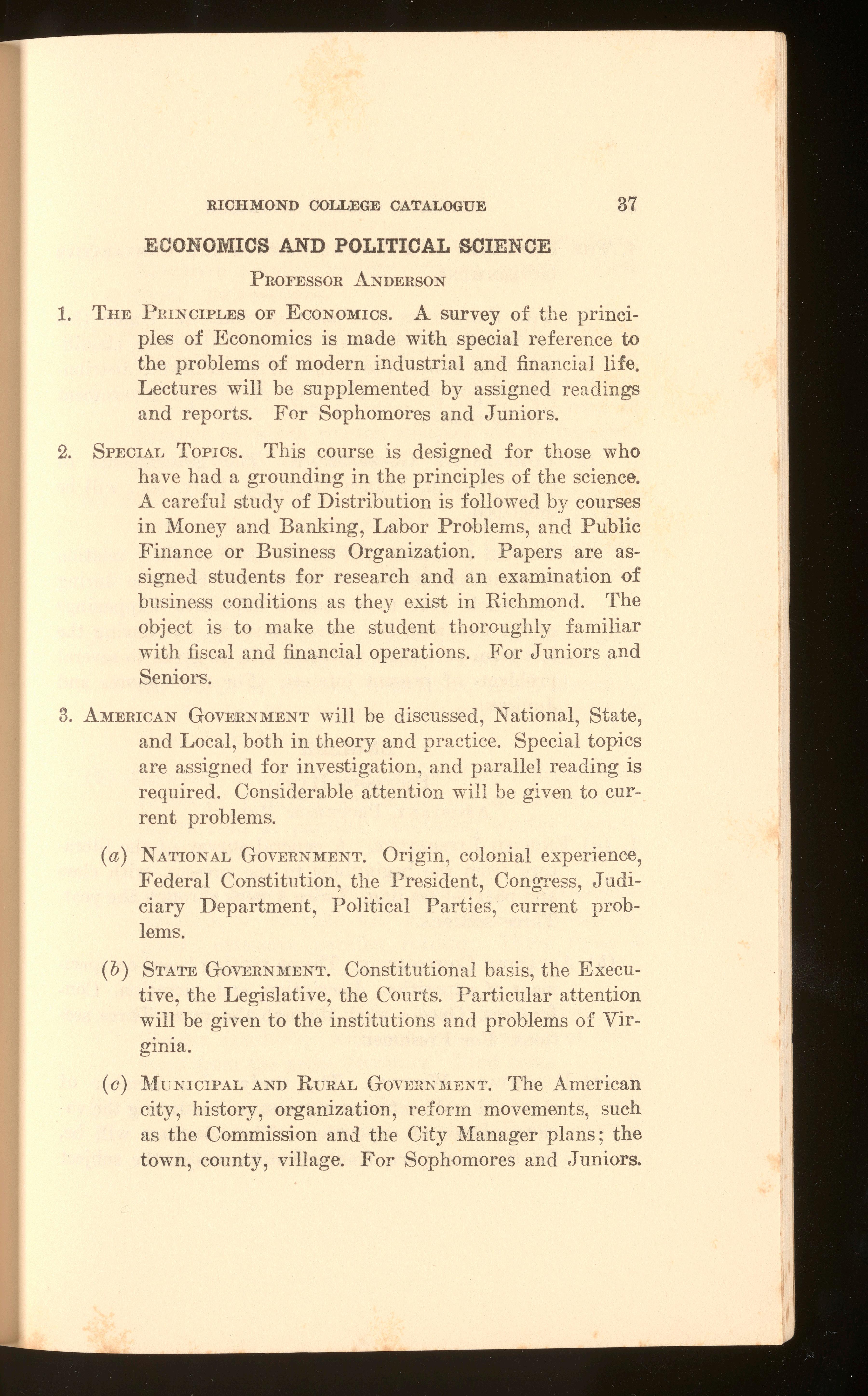
RICHMOND COLLEGE CATALOGUE
PROFESSOR ANDERSON
1. THE Pn1NCIPLES OF E ,coNOMics. A survey of the principles of Economics is made with special reference to the problems of modern industrial and financial life. Lectures will be supplemented by assigned readings and reports. For Sophomores and Juniors.
2. SPECIAL ToPICs. This course is designed for those ,vho have had a groundin •g in the principles of the science. A careful study of Distribution is followed by courses in Money and Banking, Labor Problems, and Public Finance or Business Organization. Papers are assigned students for researcl1 and an examination of business conditions as they exist in Richmond. The object is to make the student thoroughly familiar with fiscal and financial operations.. For Juniors and Se.niors.
3. AMERICAN GovERNMENT will be discussed, National, State, and Local, both in theory and practice. Special topics are assigned for investigation, and parallel reading is required. C·onsiderable attention will be given to current problems.
(a) NAri 1IONAL GovERNMENT. Origin, colonial experience, Federal Constitution, the President, Congress, Judiciary Department, Political Parties, current problems.
(b) STATE GoVE.RNMENT. C;onstitutiona1 basis, the Executive, the Legislative, the Courts. Particular attention will be given to the institutions and problems of Vir. . g1n1a.
(c) l\fu -NICIPAL A:Nn RuRAL GovERNl\IENT. The American city, history, organization, reform moveme.nts, such as the ,Commission and the City ~fanager plans; the town, county, village. For Sophomores and Juniors.
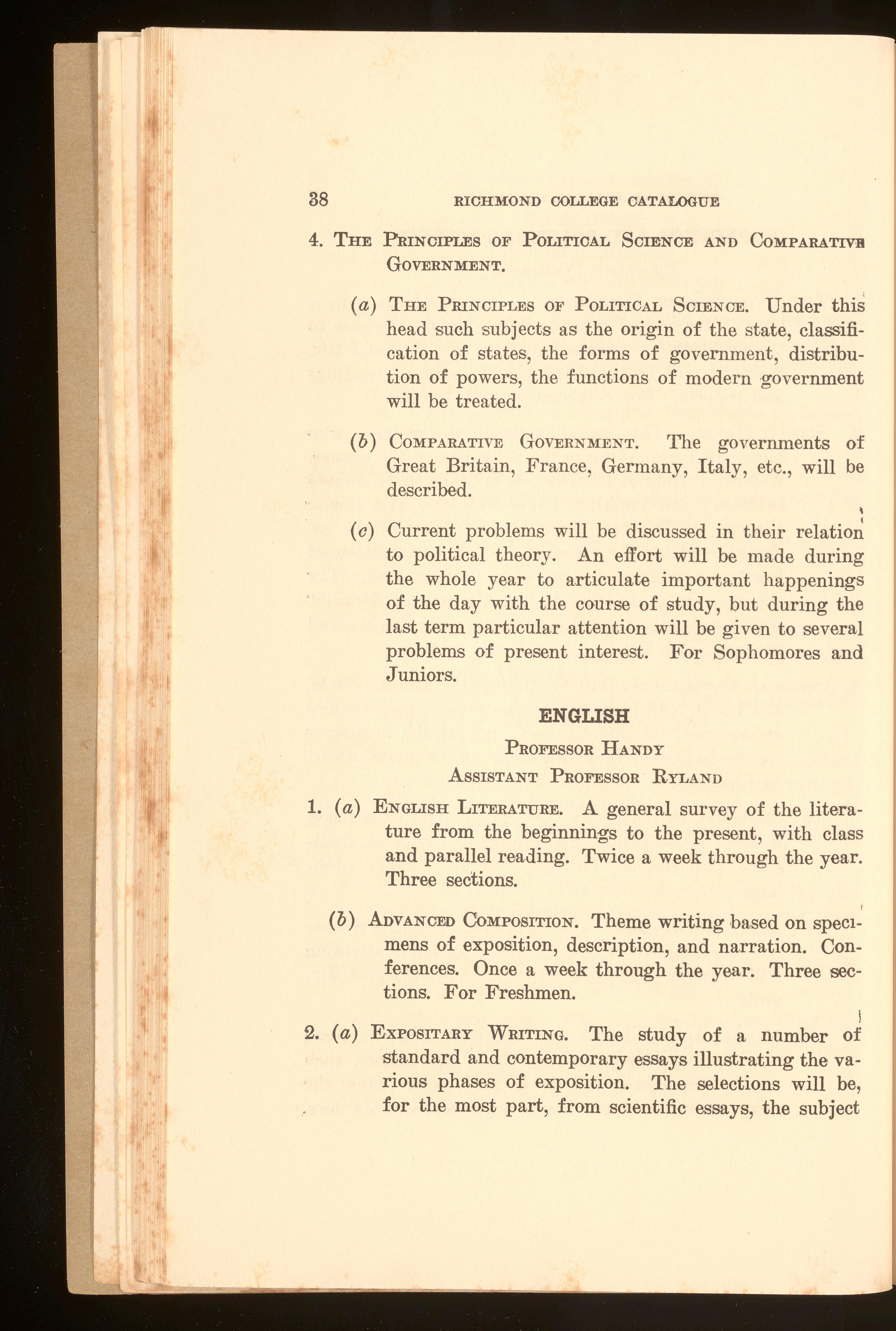
4. THE PRINCIPLES OF PoLITICAL ScIENCE AND CoMPARATIVB GOVERNMENT.
(a) THE PRINCIPLESOF POLITICALSCIENCE. Under this head such subjects as the origin of the state, clas~~ification of states, the forms of government, distribution of powers, the functions of modern •government will be treated.
(b) COMPARATIVEG oVERNMENT. The governments of Great Britain, France, Germany, Italy, etc., will be described.
4
( c) Current problems will be discussed in their relation to political theory. An effort will be made during the whole year to articulate important happenings of the day with the course of study, but during the last term particular attention will be given to several problems of present interest. For Sophomores and Juniors.
ENGLISH PROFESSORH ANDY ASSISTANTPROFESSORRYLAND
1. (a) ENGLISH LITERATURE. A general survey of the literature from the beginnin•gs to the present, with class a.nd parallel re 1a.ding. Twice a week through the year. Three sections.
i (b) ADVANCEDCOMPOSITION.Theme writing based on specimens of exposition, description, and narration. Conferences. Once a week through the year. Three sections. For Freshmen.
2. (a) E ,xPOSITARYWRITING. The study of a number of sta . ndard and contemporary essays illustrating the various phases of exposition. The selections will be, for the most part, from scientific essays, the subject

RICHMOND COLLEGE CATALOGUE 39·
n1atter of which is of intrinsic interest to students. Extensive parallel rea.ding, written reports. First term. Two sections.
(b) SHAKESPEAnE.The study of three plays with a view to dramatic technique, the growth of Shalrespeare as an artist, and the chief characteristics of the Elizabethan period. A number of other pla .ys will be read as parallel, on which written analyses will be required. Second term. Two sections.
(
c) AMERICANLITERATURE.Studies in the chief American poets, with extensive parallel readin•g in the prose writers, following a. rapid survey of the Colonial and Revolutionary periods. Third term. Two sections. For Sophomores.
3. (a) TnE ENGLISHNOVEL. The development of the English Novel fron1 Dickens to Hardy. Parallel reading in the works of Dickens, Thackeray, Eliot, Meredith, and Hardy. Two typical novels will be analyzed in class. First term.
(b) TENNYSONAND BROWNING.Some of the representative · poems of Tennyson and Browning studied in class, others read as parallel. Lectures; written reports. Second term.
(a) AMERICANPROSE. A few of the principal American novelists or essayists will be studied. Written reports; extensive parallel reading. Three times a week. For Juniors a nd Seniors.
4. (a) ANoLo-SAxoN PROSE. Old English Grammar and Reader (Smith's), with collateral reading of selections from the prose literature. 'First term.
(b) ANGLO-SAXONPoETRY. Beowulf (Wyatt's edition) read entire, and several hundred lines critically studied. Second term.
BICI-IMOND COLLEGE CATALOGUE
(c) CHAUCER. Several of the Canterbury Tales will be studied and others, along with the shorter poems, read as parallel. Third term.
:5. (a) THE SHORT STORY. 'l,he development and technique of the short story. Wide readin · g of classic and contemporary short stories, and exercise in story writing. First term.
(b) THE ROMANTIC POETS. Several of the Romantic poets of the earlier nineteenth century (Wordsworth, Byron, Shelley, J(eats) will be studied. The beginnings of the Romantic movement will be traced. Lectures, reports, parallel reading. Third term.
( e) THE CoN'l'EMPORARY DRAMA. Recent and contemporarj dra.1natists ,.vill be studied jn class, with Dickinson's "Contemporar y Dramatists" as a text, supplemented by ,vide parallel reading and the preparation of papers on assigned topics. T11ird term. For Juniors and Seniors.
Courses 3 and 5 are given in alternate years. For 1920-'21 course 3 will be given.
'
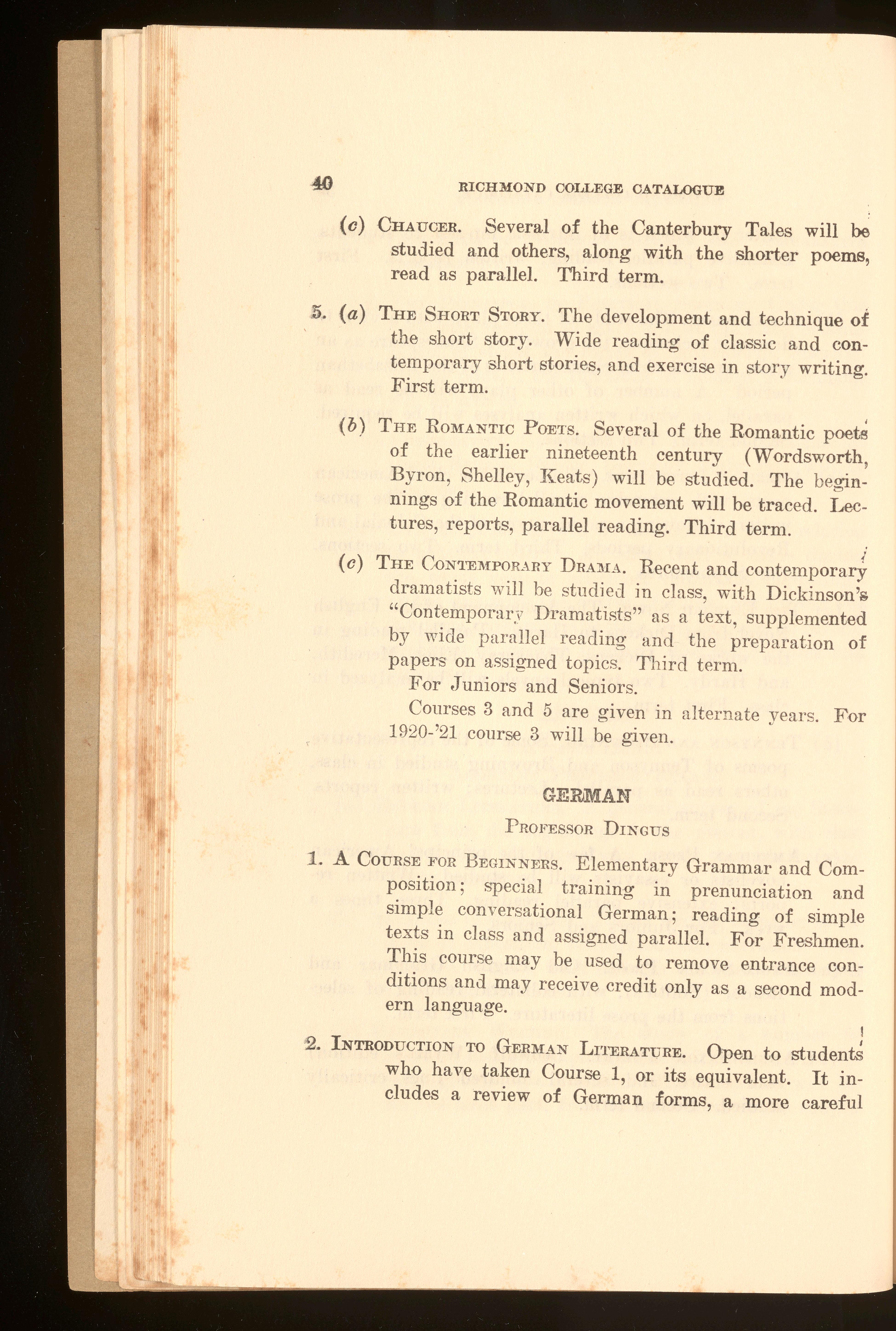
PROFESSOR DINGUS
. A CouRsE FOR BEGINNERS. Elementary Grammar and Composition; special trainin • g in prenunciation and simp1e conversational German; reading of simple texts in class and assigned parallel. For Freshmen. This course may be used to remove entrance conditions and may receive credit only as a second mod- ern language. I '
:2. INTRODUCTION TO GERl\ilAN LITERATURE. Ope in to students who have taken Course 1, or its equivalent. It includes a review of German forms, a more careful
. '•
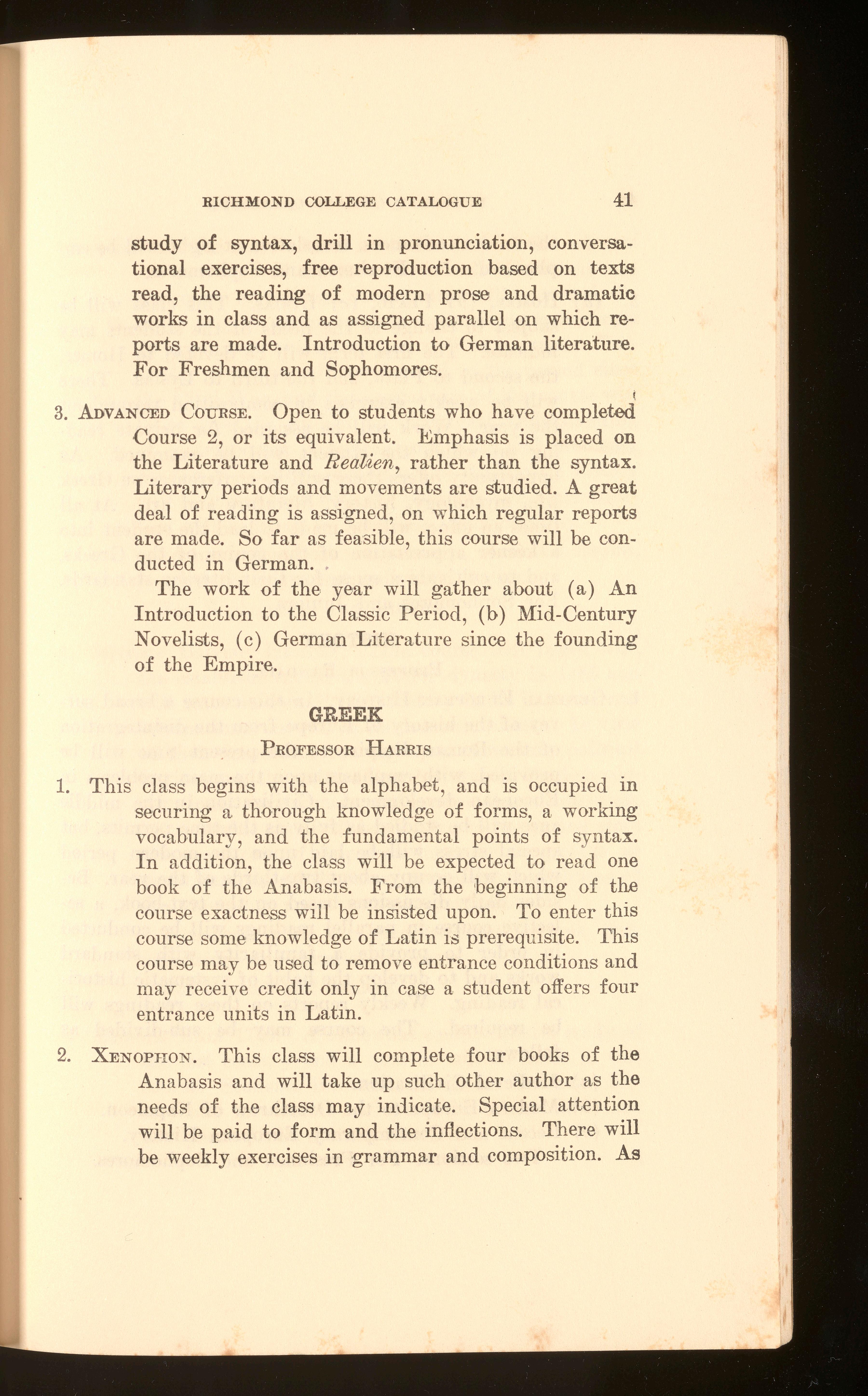
study of syntax, drill in pronunciation, conversational exercises, free reproduction based on texts read, the reading of modern prose and dramatic works in class and as assigned parallel on which reports are ma de. Introduction to German literature. For Freshmen and Sopho1nores. (
3. ADVANCED CouRsE. Open to students who have completed Course 2, or its equivalent. 1£mphasis is placed on the Literature and Realien, rather than the syntax. Literary periods and move1nents are studied. A great deal of reading is assigned, on which regular reports are made. So far as fea-sible, this course will be conducted in German. .
The work of the. ye 1ar will gather a.bout (a) An Introduction to the Classic Period, (b) Mid-Century Novelists, ( c) German Literature since the founding of the Empire.
PROFESSOR HARRIS
1. This class begins with the alphabet, and is occupied in securing a thorou·gh knowledge of forms, a working vocab,ula.ry, and the fundamental points of syntax. In addition, the class will be expected to read one book of the Anabasis. From the beginning of the course exactness will be insisted upon. To enter this course some knowledge of Latin is prerequisite. This course may be . used to re.move entrance conditions and may receive credit only in case- a student offers four entrance units in Latin.
2. XE NOPJ-ION. This class will complete four books of the Anabasis and will take up such other author as the needs of the class may indicate. Special attention will be paid to form and the inflections. There will be weekly exercises in ·grammar and composition. As

the stude11t advances, t~anslation at sight will be emphasized. For Freshmen and Sop • homores. _
a. (a) HOMER, ( b) PLATO, (a) LYSIAS. This-class will be subject to change as the needs of the students may indicate. The first term will be devoted to Homer, the second to Plato, and the third to Lysias. There will be weekly exercises in composition throughout the year. Work will be assigned for private reading on which the student will be examined. As opportunity offers there will be conferences on Greek life, mythology, l1istory, literature and art. At all times an effort will be made to lead the student into a keener appreciation of the genius of the Greeks, and to cultivate a sense for their literary standards. For Sophomores and Juniors.
1. GENERAL EUROPEANHISTORY.In this course a broad survey of the history of Europe from the disintegration of the Roman Empire to the present time will be provided, with emphasis upon the main problems in European development. Civilization in the middle ages will be studied as fully as the time permits, but special stress will be laid upon the modern period which will occupy about two-thirds of the year. Be- · sides daily discussions based on the text-book, a selective course in p ,arallel readings will be conducted in order to provide a familiarity with standard works and to deve,lop the habit of systematic historical reading. Weekly reports on these readings will be required. The . course may be su,b-divided as follows:
(a) Medieval Civilization.
(b) ~1odern E ,urope to the Overthrow of Napoleon.
(c) Recent and Contempora·ry European History. Two sections. For Freshmen and Sophomores.

2. AMERIOAN H1sTORY. After a brief survey of the colonies the problems of the Revolution will be studied a.nd the course of national development will be traced. In order to give prominence to outstanding movements an organized, topical method will be pursued. Particular a.tte,ntion will be devoted to the period since the Civil War, and the special aim of the course will be to give the student an intelligent understandin·g of contemporary American conditions a.nd problems . So far as possible, economic and diplomatic history will be interwoven with the political, and some, attention will be given to American historiography.
Lectures, text-book assignments, class discussions, parallel readings, and individual topics.
For Sophomores and Juniors.
3. lfooERN BRITISH HTSTORY.This course will begin with the establishment of the Tudor dynasty in 1485 and will trace modern British history in its imperial and international as well as its domestic phases. In view of their important bearing upon American political institutions, the outstandin·g features of E . nglish constitutional develop • ment will receive special attention. Considerable time will be devoted to the period since the overthrow of Napoleon in order to provide an understanding of the many complicate ·d problems of the nineteenth and twentieth centuries.
Text-book work with supplemental lectures., class discussions and parallel readings.
],or Juniors and Seniors.
4. EuROPES·INCE1789. A somewhat comprel1ensive study of the last century and a quarter will be made in this course. Students interested in recent European history and movements will profit by tak:ing this class. The year will be divided between: I.I
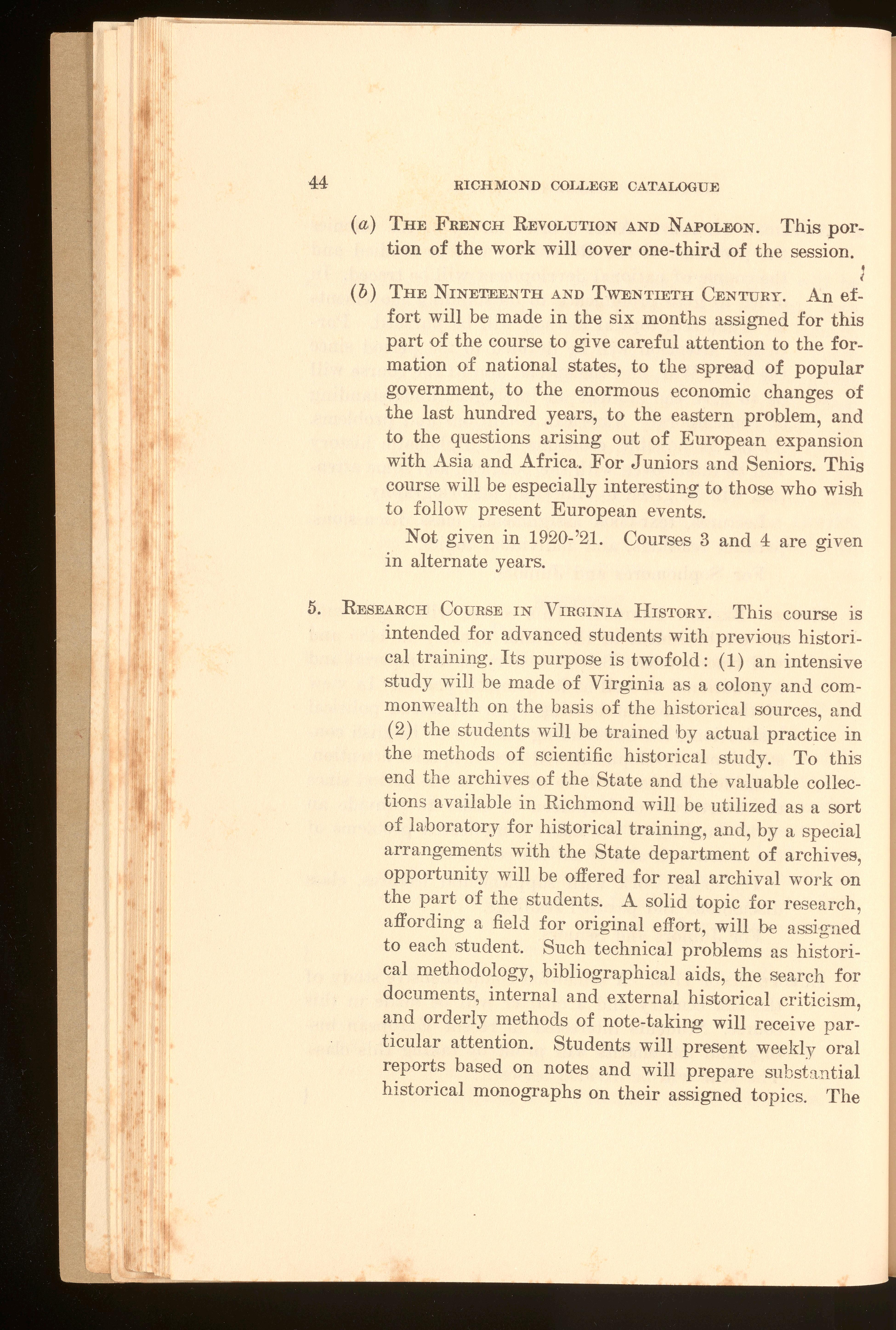
RICHMOND COLLEGE CATALOGUE
(a.) THE FRENCH REVOLUTION AND NAPOLEON. This portion of the work will cover one-third of the session.
(b) THE NINETEENTH ANDTWEN TIETH C ,EN'l"URY. An effort will be made in the six months assigi1ed for this part of the course to give careful attention to the formation of national states, to tl1e sp ,read of popular government, to the enormous economic changes of the last hundred years, to the eastern problem, and to the questions arising out of European expansion with Asia and Africa.. For Juniors and Seniors. This course will be especially interestin ,g to those who wish to follow present European events.
Not given in 1920-'21. Courses 3 and 4 are given in alternate years.
. This course is intended for advanced students with previous historical training. Its purpose is twofold: (1) an intensive study will be made of Virginia as a colony and commonvvealth on the basis of the historical sources, and (2) the students will be trained by actual pract~ce in the methods of scientific historical study. To this end the archives of the State and the valuable collections available in Rich n1ond will be utilized as a sort of laboratory for historical training, and, by a special arrangements with the State department of archives, opportunity will be offered for real archival work on the part of the students. A solid topic for research, a:ffording a field for original effort, will be assigned to each student. Such technical problems as historical methodology, bibliographical aids, the search for documents., internal and external historical criticism, and orderly methods of note-taking will receive particular attention. Students will present weelrly oral reports based on notes and will prepare substantial historical monographs on their assigned topics. The

course will be suitable for students pursuing graduate work.
For Seniors a.nd Graduate Students.
ASSOCIATEPROFESSOR------
Students who have less than the required preparation in Latin and who wish to continue this study, may upon the payment of a small fee obtain instruction in Latin in a coaching class conducted by a student under the general direction of the Professor of Latin.
F 'our units of the standard entrance requirements as published in the catalogue are required f qr entrance to the first course. The following courses are given in the department:
1. (a) R ,EADING. Livy ( Selections from Books I., II. and XXI.) ; Selections from Lyric Poets; Horace ( Odes and Epodes).
Conferences will be held on Roman Historiography and Roman Lyric Poetry.
( b) PROSE COMPOSITION.Weekly exercises, b ,ased on Livy and Cicero; occasional original ·compositions.
(e) RoMAN PRIVATE LIFE. Text-book work, accompanied by lectures on Roman Private Life as illustrated b , y Roman literature , and archaeology. For Freis;hmen or Sophomores.
2. (a) READING. Tacitus ( Germania. and Agricola) ; Pliny (Selected Letters); Juvenal or l-Iorace (Select Satires) ; Martial ( Select Epigrams) ; Pla.utus (Menaechmi) ; Terence 1 ( Self-Tormeintor).
The reading will be supplemented by lectures on Roman Historiograp · hy during the classical period of the E :mpire, Roman Epistolography, Biography, the
4G

RICHMOND QOLLEGE CATALOGUE
rise and development of Roman Comedy, Satire, and the Epigram.
( b) PROSE CoMPOSITION.The work will consist of •original composition, and the translation into Idion1atic Latin of typical passages of English literature, representing different subjects and different styles.
(o) LATIN LITERATURE. ...~general survey of the classical literature of the Romans. The study of a text-book will be supplemented by appropriate lectures. For Sophomores or Juniors.
3. ( a.) READING. Tncitus (Dialogus de Oratoribus) ; Cicero (Brutus); Selections from Lucretiu'S; llorace (Ars Poetica) ; Quintilian (Book X.).
The reading will be supplemented by lectures on Roman Oratory, Epic Poetry, and Literary Crit. 1c1sm.
(b) PnosE COMPOSITION.The composition of this course will be given on the same plan as that of Course 2. The exercises will be adapted to the advancement of the individual student.
(a) Special reports on assigned topics dealing with Roman life and literature. For Juniors or Seniors.
PROFESSOR GAINES
ASSOCIATE PROFESSORS AYRE AND DECKER
1. (a) COLLEGEALGEBRA. A course designed to follow the work of a good high school, beginning with quadratic equations, and including such subjects as the pro•gressions, permutations and combinations, mathematical induction~ binominal theorem, inequalities, logarithms, theory of equations, and infinite series. First term.
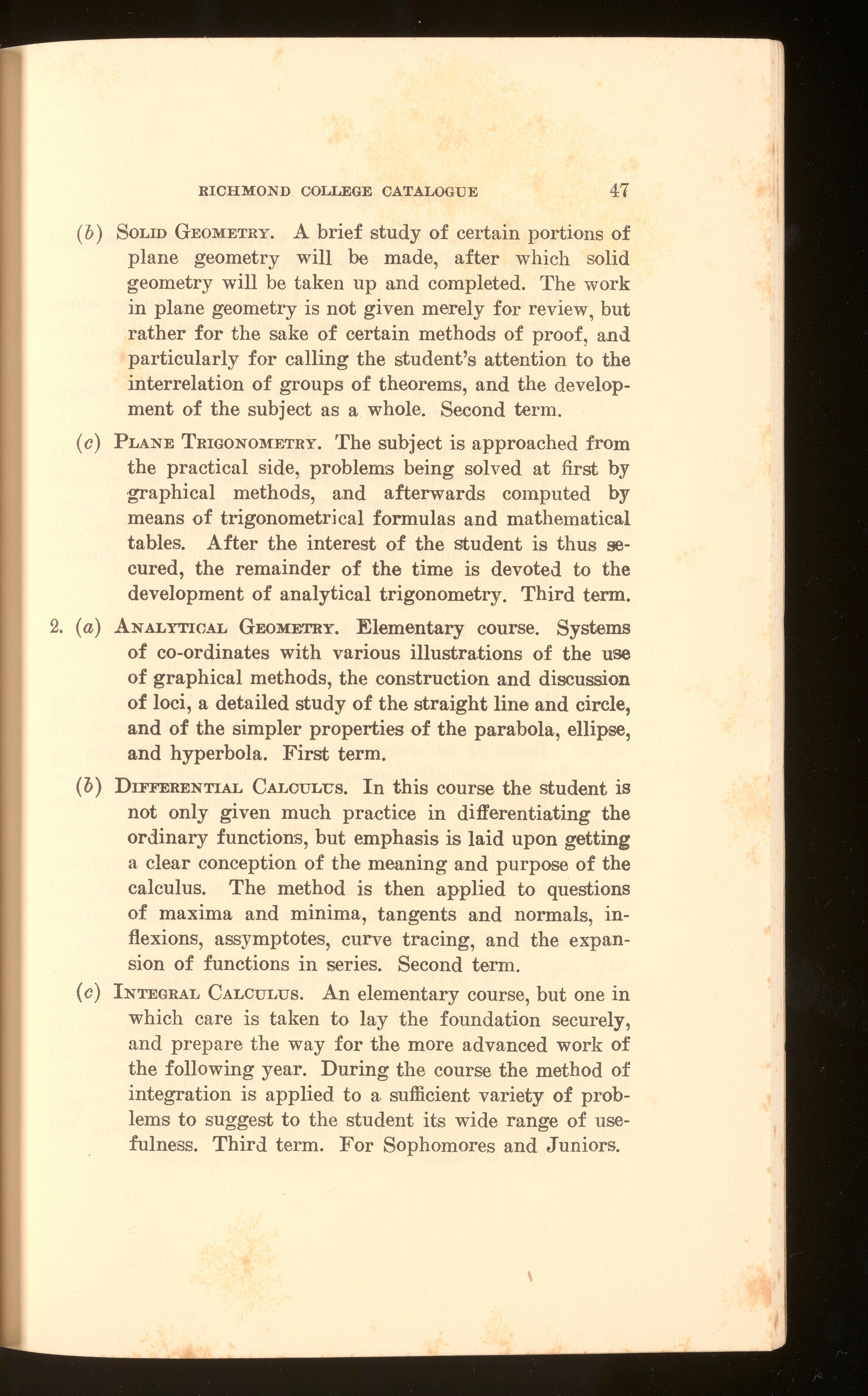
(b) SOLID GEOMETRY.A brief study of certain portions of plane geometry will be made, after which solid geometry will be taken up and completed. The work in plane geometry is not given merely for review, but rather for the sake of certain methods of proof, and particularly for calling the student's attention to the interrelation of groups of theorems, and the development of the subject as a whole. Second term.
(a) PLANE TRIGONOMETRY.'fhe subject is approached from the practical side, problems being solved at first by •graphical methods, and afterwards co1nputed by means of trigonometrjcal formulas a nd matl1ematical tables. After the interest of the student is tl1us secured, the remainder of the time is devoted to the development of analytical trigonometry. Third term.
2. (a) ANALJ."TICALGEOMETRY. Elementary · course. Systems of co-ordinates with various illustrations of the use of graphical methods, the construction and discussion of loci, a detailed study of the straight line and circle, and of the simpler properties of the parabola, ellipse, and hyperbola. First term.
(b) DIFFERENTIALCALCULUS.In this course , the student is not only given much practice in differentiating the ordinary functions, but emphasis is laid upon getting a clear conception of the meaning and purpose of the calculus. The method is then applied to questions of maxima and minima, tangents and normals, inflexions, assymptotes, curve tracing, and the expansion of functions in series. Second term.
(a) INTEGRALCALCULUS.An elementary course, but one in whicl1 care is taken to lay the foundation securely, and prepare the way for the more advanced work of the following year. During the course the method of integration is applied to a. sufficient variety of problems to su·ggest to the student its wide range of usefulness. Third term. For Sophomores and Juniors.
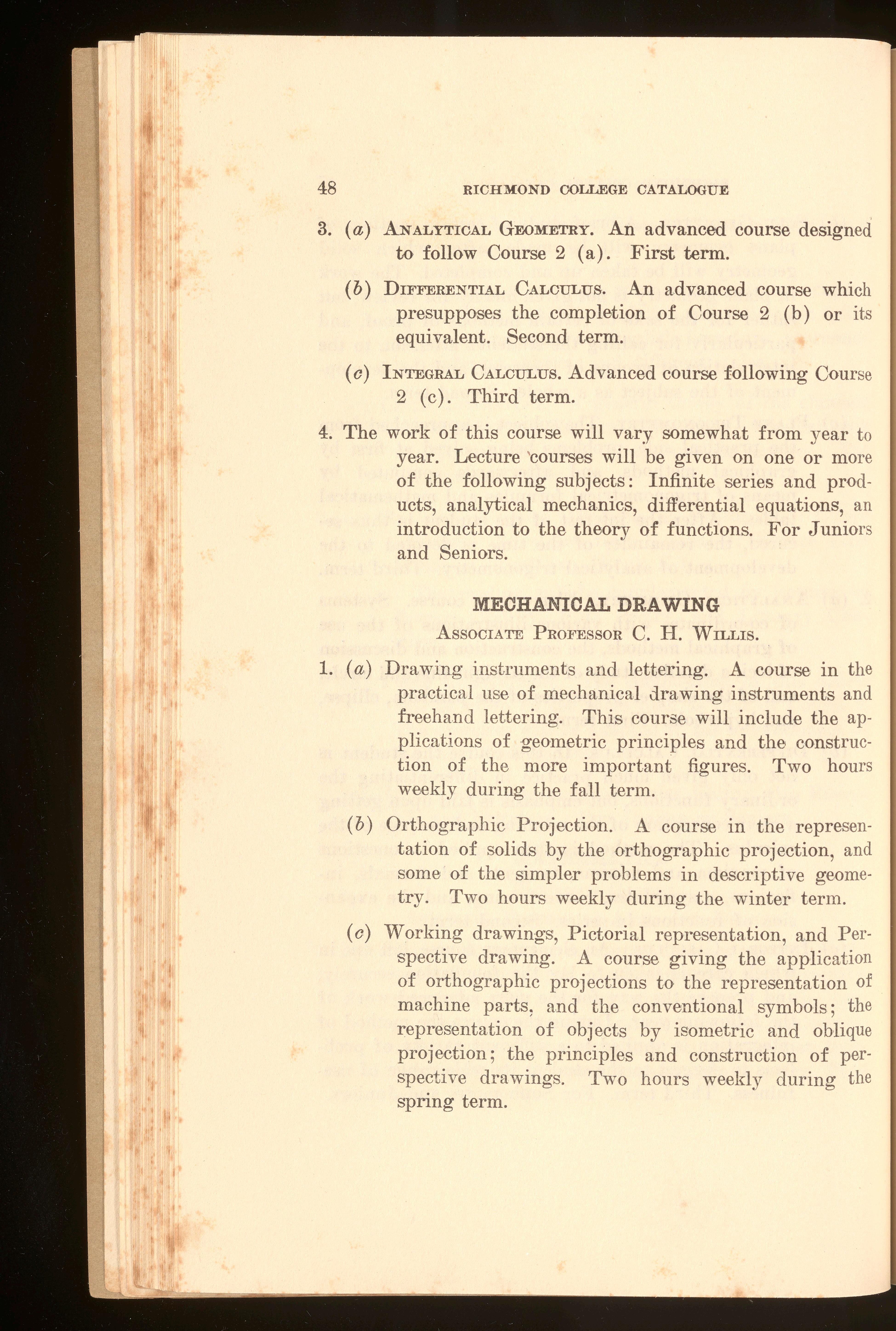
3. (a) ANALYTICALGEOMETRY. An advanced course designed to follow Course 2 (a) . First term.
(b) DIFFERENTIAL C·ALCULus. An advanced course which presupposes the completion of Course 2 (b) or its equivalent. Second term.
(o) INTEGRAL CALCULUS.Advanced course following Course 2 ( c) . Third term.
4. The work of this course will vary somewhat from year to year. Lecture 'courses will be given on one or more of the following subjects: Infinite series and products, analytical mecha nics, differential equations, an introduction to the theory of functions. For Juniors and Seniors.
AssocIATE PROFESSORC. H. WILLIS.
1. (a) Drawing instruments and lettering. A course in the practical use of mechanical drawing instruments and freehand lettering. This cours.e will include the applications of ·geo1netric principles and the construction of the. more important figures. Two hours weekly during the fall term.
(b) Orthographic Projection. A course in the representation of solids by the orthographic projection, and some of the simpler problems in descriptive geometry. Two hours weekly during the winter term.
( o) Working drawin·gs, Pictorial rep •resentation, a nd Perspective drawing. A course giving the application of orthographic projections to the representation of machine parts~ a.nd tl1e conventional symbols.; the representation of objects by isometric and oblique projection; the principles and construction of pe,rspe.ctive dra,vings. Two hours weel{ly during the spring term.

PROFESSOR BRYAN
AssocIATE P'RoFEssoR
1. LOG IC. This course is intended to acquaint t he young student with the principles of clear, cons i stent thinking. Exercises are given from hi st orical and scientific essa y s to acquaint the stud en t a t first hand with specimens of correct express i on. F rom time to time professors in the various departments of science are invited to deliver popular lectures on specific themes in their seve 1ral fields. These with illustrations a.nd parallel reading in the history of natural science enable the young student to decide for himself along what lines his scientific interests lie, and at the same time clear away the confusion which often besets the beginner in science. This course is, therefore, especially recommended to Freshmen.
· (a) DEDUCTIONis studied to show the principles of Inference in its relation to Definition, Classification, Hypothesis and its verification, and formation of subsidiary laws of natural science. The syllogism is reviewed as a form of consistent thought.
(l!) INDUCTIONis given in reference to Observation, and the canons of experimental methods in the physical science~. Description and Explanation, Terminology and Nomenclature, Theory a.nd Fact, the His• torical and Statistical methods are treated 1n connection with methods of observation.
{c) '.METHODOLOGY is studied in relation to the first principles of positive science, as well as Evolution and other methods of the Biological and " of the Normative sciences. Popular lectures and parallel reading in the history of science.
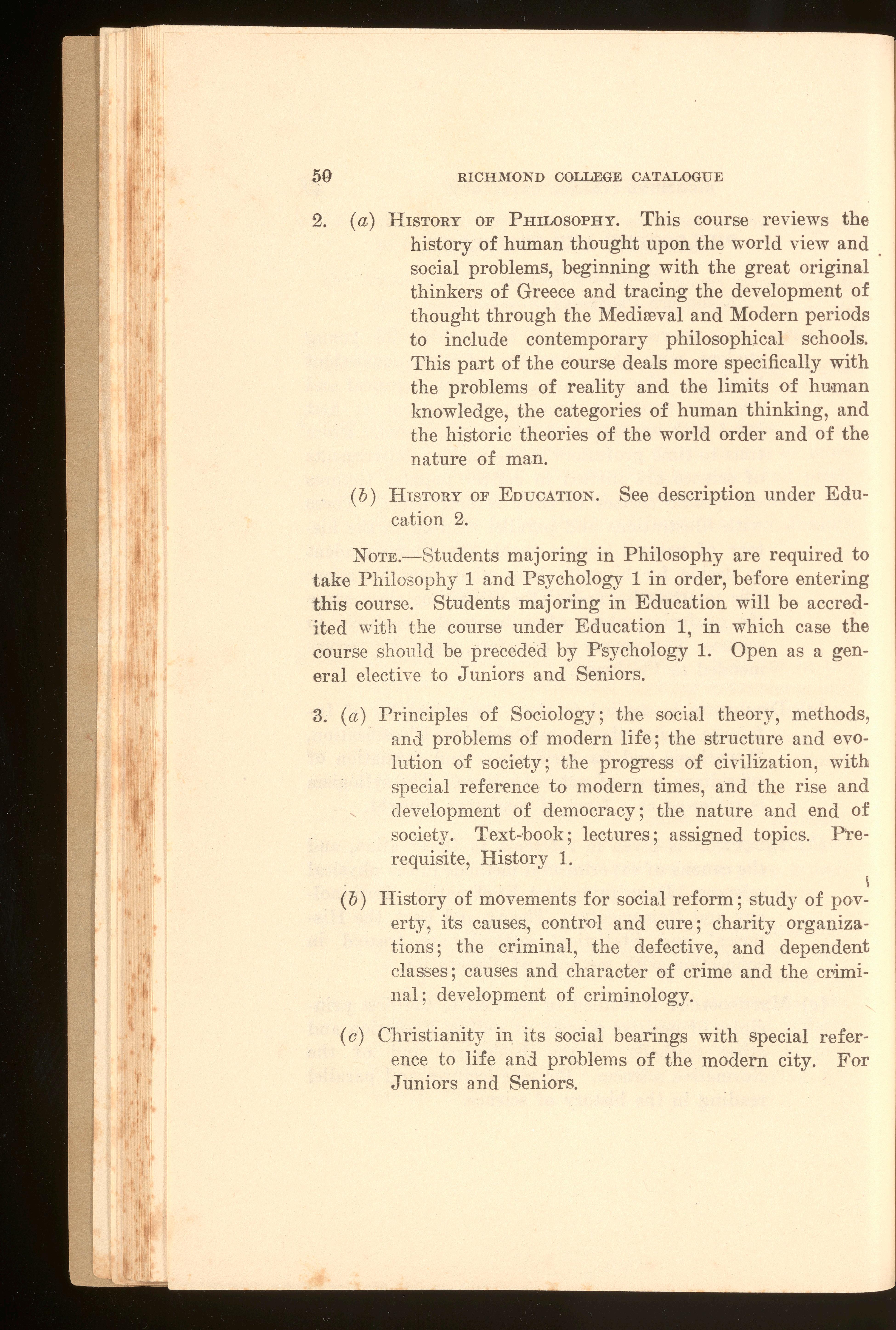
2. ( a.) HISTORY OF PHILOSOPHY. This course reviews the history of human thought upon the world view and social problems, beginning with the great original thinkers of Greece and tracin•g the development of thought through the Medireval and Modern periods to include contemporary philosophical schools. This pa.rt of the course deals more specifically with the problems of reality and the limits of human knowledge, the categories of human thinkin g, and the historic theories of the world order and of the nature of man.
(b) HISTORYOF EoucATION. See description under Edu ... cation 2.
NoTE.-Students majoring in . Philosophy are required to take Philosophy 1 and Psychology 1 in order, before entering this course. Students majoring in Education will be accredjted with the course under Education 1, in which case the course should be preceded by P'sychology 1. Open as a general elective to Juniors and Seniors.
3. (a) Principles of Sociology; the social theory, methods, and problems of modern life; the structure and evo1ution of society; · the progress of civilization, with special reference to modern times, and the rise and development of democracy; the nature and end of society. Text-book; lectures; assigned topics. Prerequisite, History 1.
\
. (b) History of movements for social reform; study of poverty, its causes, control and cure; charity organizations; the criminal, the defective, and dependent classes; causes and character of crime and the cPiminal; development of criminology.
( c) Christianity in its social bearings with special reference to life and problems of the modern city. For Juniors and Seniors.
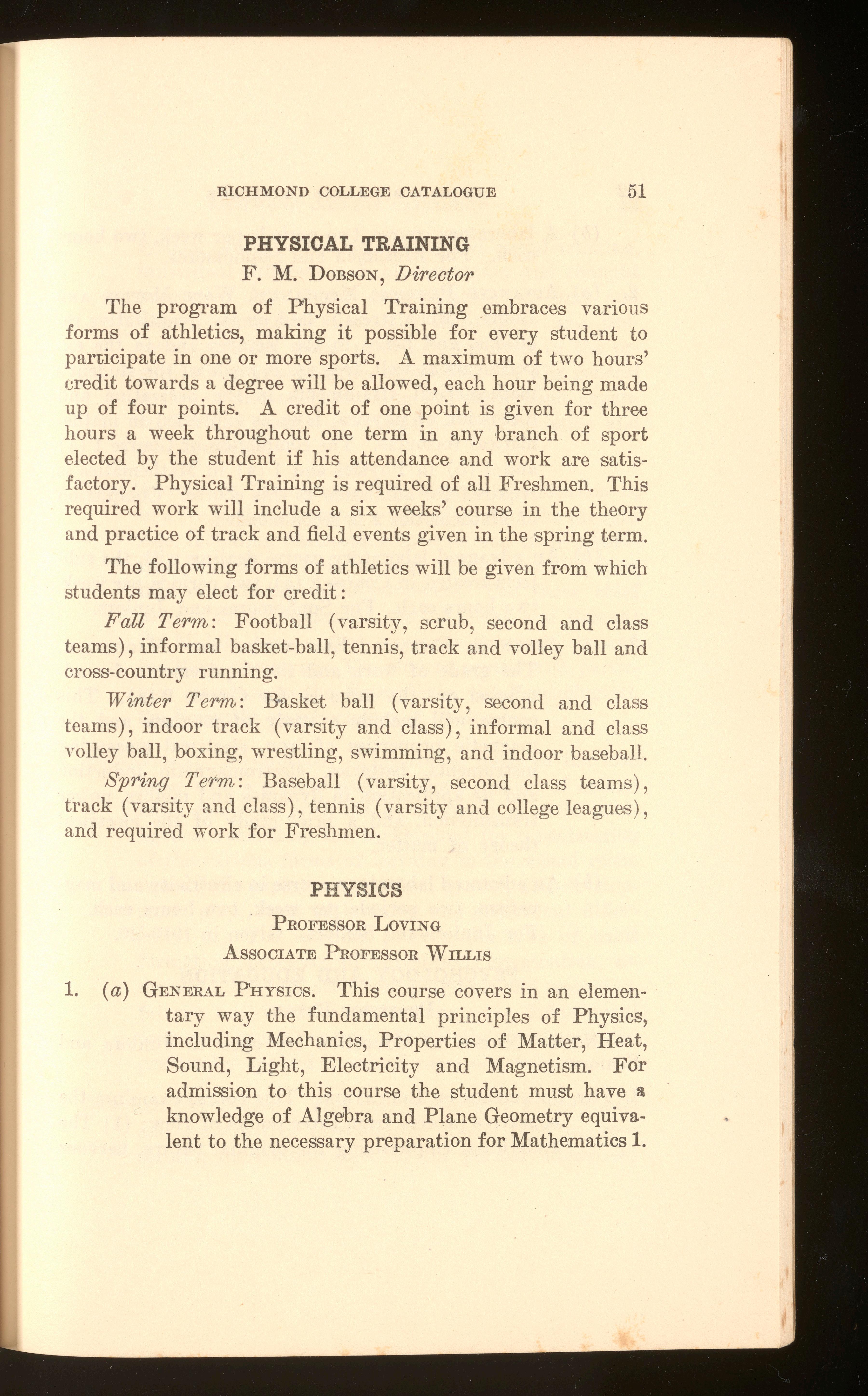
F. M. DoBsoN, Director
The program of Physical Training embraces various forms of athletics, making it possible for every student to participate in 0110 or more sp ·orts. A maximum of two hours' credit towards a degree will be allowed, each hour being made up of four points. A credit of one point is given for three hours a week throughout one term in any branch of sport elected by the student if his attendance and work a.re satisfactory. Physical Training is required of all Freshmen. This required work will include a six weeks' course in the theory and practice of track and field. events given in the spring term.
The following forms of athletics will be given from which students may elect for credit :
Fall Term.: Football (varsity, scrub, second and class teams), informal basket-ball, tennis, track and volley b·all and cross-country running.
Winter Term: B~asket ball (varsity, second and class teams), indoor track ( varsity and class), informal and class volley ball, boxin •g, wrestling, swimming, and indoor baseball.
Spring Term: Baseball (varsity, second class teams), track ( varsity and class), tennis ( varsity and college leagues), and required work for Freshmen.
1. (a) GENERALP'HYSICS. This course covers in an elementary way the fundamental principles of P 'hysics, including Mechanics, Properties of Matter, Heat, Sound, Light, Electricity and Magnetism. For admission to this course the student must have a knowle~·ge of Algebra and Plane Geometry equiva.-lent to the necessary preparation for Mathematics 1.

(b) A laboratory course, two periods per week, two hours each. For Freshmen and Sophomores.
2. (a) ADVANCEDP11Ysics : MECHANrcs, WA VE MoTION AND LIGHT. Much stress is laid on the quantitative relations, a.nd hence in the lectures and in the experiments as well, free use is made of the student's mathe :matical attainments in the derivation and discussion of physical laws as expressed in mathematical formulae. The completion of Course 1 (a) and 1 (b) in Physics and 1 ( a.) in Mathematics is required for admission to this course. Completion of Mathematics 2 is recommended.
(b) An advanced laboratory course dealing with the subjects treated in Course 2 (a), two periods per week, two hours each. For Sophomores and Juniors.
3. (a) Aov ANCED PHYSICS: ELECTRICITY AND MAGNETISM. The grade of work and the . requirements for admission are the sa.me as for Course 2 (a) . This course will include a study of magnets and the magnetic properties of iron, electrical measuring instruments, batteries, electromagnetic induction and its application in dynamos and motors, powet~ transmission, and a brief study of the electrical theory of matter.
(b) An advanced laboratory course in electricity and magnetism, two periods per week, two hours each. For Juniors and Seniors. Give.n in 1919-'20.
NoTE.-Courses in Education are open to Juniors and Seniors.
1. THE PRINCIPLES OF EoucA'rION. This course examines the educative process from three points of view: (1) The Individual emphasizing the original nature, nervous

system, sensory training, motor a.nd moral training, individual differences, habit forn1ation a~d thought processes; ( 2) Social determination of aims and values, democratic demands, institutions and processes , and the social principles involved in the or·ganizations of a progra1n of studies; (3) The general nature of method in teaching and supervision, organization and standards of instruction, evaluation and measurements.
2. THE HISTORYOF EoucATION. The history of education is, in a sense, the history of civilization from the thought side, including philosophic theories and their institutional practices. It is the aim of this course to show this relationship in development The three chief periods to be emphasized are the Greek and Roman; the Middle Ages, noting especially Schola.sticism and the Renaissance; and The Modern period with particular attention to the Naturalistic, the Psychological, the Scientific and Sociological tendencies.
3. EDUCATIONALPsYCI-IOLOGY.This course deals in the first place with a genetic study of the evolution of animal mind compared with the development of child intelligence, furnishing the background for consideration of the various forms of learning in the school room. Among the topics are: instinct, growth and development, play, types of learning and individual difference. (2) The learning process, the laws of habit formation, processes of perception, imagination, association, interest, attention, judgment and reasoning, fatigue and transfer of learning. _ (3) Educational tests a n d me a surements historically developed and prac t ic a lly applied in school room observation.
4 GENERALPs YCI-~OLOGY.This course will give a systematic and con structi v e presentation of the theories, con-cerning the consciousness of the normal human in-
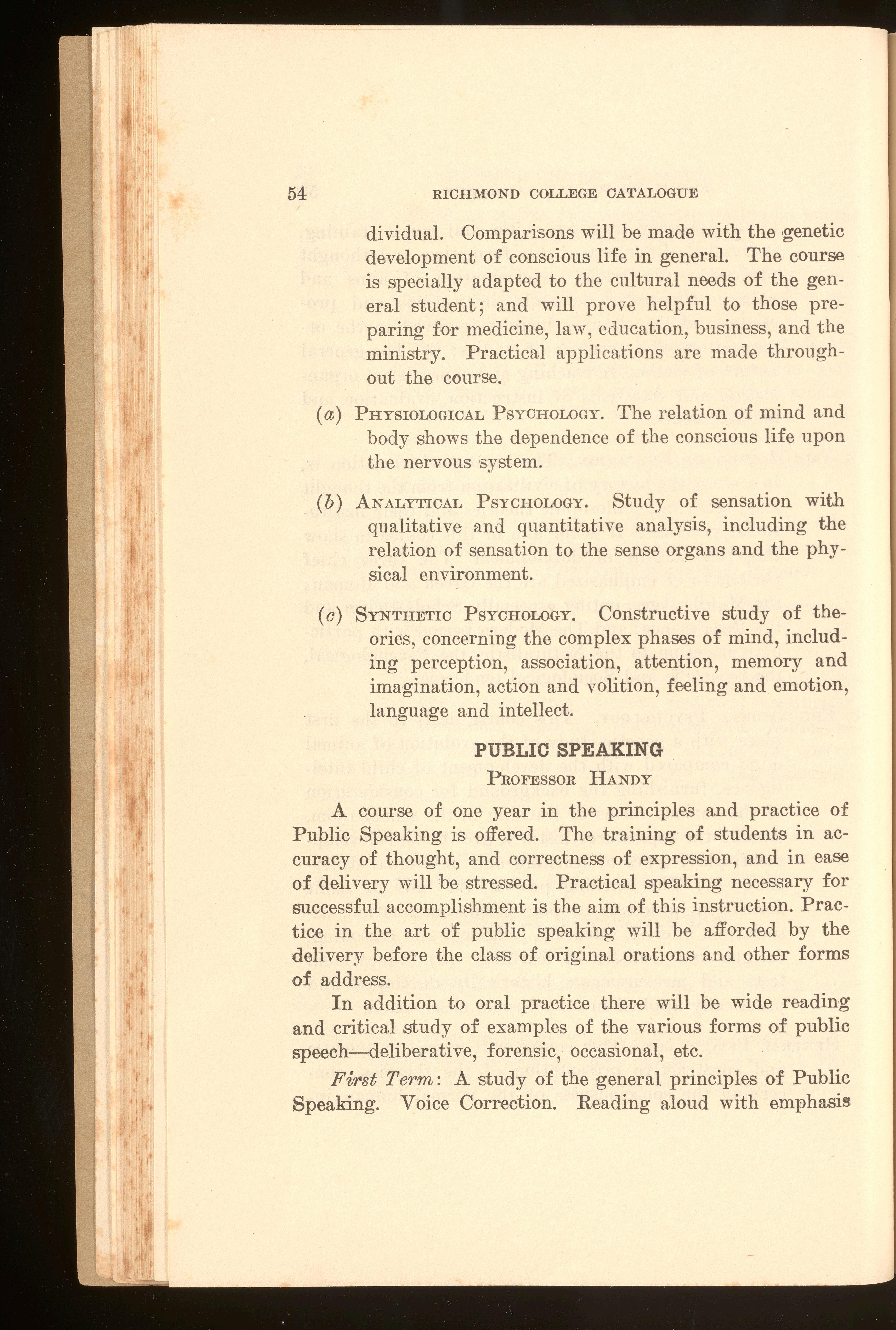
dividual. Comparisons will be made with the ,genetic development of conscious life in general. The course is specially adapted to the cultural needs of the general student; and will prove helpful to those preparing for medicine, law, education, business, and the ministry. Practical applications are made throughout the course.
(a) PHYSIOLOGICALPsYCHOLOGY.'The relation of mind a.nd body shows the dependence of the conscious life upon the nervous system.
(b) ANALYTICALPsYCHOLOGY. Study 0£ sensation with qualitative and quantitative analysis, including the relation of sensation to the sense organs and the physical environment.
(c) SYNTHETICPsYCHOLOGY.Constructive study of theories, concerning the complex phases of mind, including perception, association, attention, memory and imagination, action and volition, feeling and emotion, language and intellect.
A course of one year in the principles a.nd practice of Public Speaking is o:ffered. The training of students in accuracy of thought, and correctness of expression, and in ease of delivery will be stressed. Practical speaking necessary £or successful accomplishment is the aim of this instruction. Practice in the a.rt of public spe 1aking will be a:fforded by the delivery before the class of original orations and other forms of address.
In addition to oral practice there will be wide readin ,g and critical study of examples of the various forms of public speech-· deliberative, forensic, occasional, etc.
First Term: A study of the general principles of Public Speaking. Voice Correction. Reading aloud with e.mphasis

upon proper breathing. Daily practice in the delivery of short n1emorized selections.
Winter Term: The oration as a form. Analytical study of a number of modern orations as to structure, style and diction. Writing of two original orations and delivery of them before the class.
Sprin.g Te1'1n.: Other forms of Public Address. E •xtempore and Impromptu .Speaking. S•pecial types of short talks neces sary in the social world of toda . y.
This course is for Sophomores and Juniors.
French
ACTING PROFESSORSTE,VART ASSISTANTPROFESSORRYLAN[)
1. A CouRsE FOR BEGINNERS. Grammar, composition, and translation. This class presupposes a knowled ·ge of English grammar and of the elements of Latin. For Freshmen. This course may be used to remove entrance conditions, and ma 1 y reaeiv e credit only a-s · a second modern langua :ge.
2. GENERALINTRODUCTIONTO TI-IE STUDY OF FRENCI-ILITERATURE. Conversation. The course consists of (a) Composition, (b) F rench Literature, ( c) R eadings. from Hugo, Daudet, Canfield, Rostand, and Fontaine. For Freshmen and Sophomores.
3. This class will be conducted in French, and students are expected to ta.ke notes and answer questions in French.
(a) L .ectures on history of French literature from the earliest times to the present day.
(b) Studies in French style, composition, etc.
( e) The 1reading will include selected classics of the seventeenth century, examples of Romanticism and Real-

' ism in the nineteenth century, and selections from contemporary literature.
4. This class will be conducted in French. In 1919-'20 there will be offered a course in the French Short Story. Original compositions in French required. Tµree hours a week throughout the year.
1. A CouRsE FORBEGINNERS.Elementary grammar, composition, and translation of easy Spanish texts. A&5igned parallel reading. This course may be used to remove entrance requirements and may receive credit only as a second modern langua,ge. ·
2. SPANISH LITERATUREAND CoNVERSATION.The course consists of (a) Composition, (b) Spanish Literature, ( c) Readings from selected Spanish authors. Assigned parallel in Spanish history and current South American magazine articles.
-3. This course will be conducted in Spanish and the students are expected to take notes a.nd ask questions in Spanish. (a) Lectures on Spanish Literature and history, (b) Studies in Spanish style, composition, etc., ( c) Readings from selected Spanish classics, and also from present day writers.
~!.IARION G. RYLAND, B. A., B. S., Librarian
Lucy T. THROCKMORTON, Ass-istant to the LibrarU1111 N. M. Fox AND C. V. HICKERSON Student Assistants
The I.iibrary occupies the southern ,ving of Ryland IIall. The interior is panelled in oak, and the book-cases arranged in alcove plan. There is, at each end, a five-fold Gothic window of striking size and beauty, and in each alcove a casement window, the whole affording natural light at all hours of the

d ay. In convenience and harmony of effect, the Library is t he culmination of the collegiate Gothic, that exquisite perp endicular type made f a.miliar by the -English colleges, to which all the College buildings strictly conform.
It contains about twenty-five thousand volumes, not including pamphlets, arranged and catalogued by the Dewey System. The most recent and useful bibliographical aids are pr ovided, and the best periodicals and reviews, daily and weekly p a per s are currently received. As a depository of the · Un ited S t a tes Government, the I""ibrary acquires annually hun d r ed s of publications especially valuable for reference in social a nd political science. The students have direct access to t he shelves during ten hours each day, and the Librar i an and a ssistants are always on hand to give help in any line of read ing or research.
For the convenience of the undergraduates of Westhampto n College, there is also maintained in the Reading R .oom at We sthampton College a well selected reference library . The College counts itself peculiarly fortunate in having nea rby several great collections of books which materially increase its library resources. Through the courtesy of the officials, the one hundred thousand volumes of the Virginia Sta te Library and the unique collection of the Virginia I-I ist-0rical Society have been ma.de accessible to our ·stude n ts, bot h for consultation and withdrawal. These afford exceptiona l facilities for research, not only in general subjects, but especially in Virginia and American history. It should also be mentioned ·that our nearness to Washington en ables stude n ts to make constant · use of the Congressional Library, from wh ich rare books and pamphlets invaluable for theses an d debates ca.n be quickly obtained.
These Lectures are provided for by "The Thomas Museum Lecture Endowment'' of $11,000 donated by his fam i ly in memory of the late president of the corporation , James Th omas, Jr. They are delivered annually by eminent men

RICHMOND COLLEGE CATALOGUE
of our own a.nd foreign countries on Science, Philosophy, Art or Literature, and by special provision are open to the public without charge. The following distinguished scholars have delighted large audiences and greatly stimulated literary anJ scientific research :
Charles A. Young, Ph.D., of Princeton; H. Newell Martin, Ph. D., of Johns Hopkins University; W. T. Harris, LL , D., United States Commissioner of E ,ducation; P 'resident D. C. Gilman, LL. D., of Johns H 1opkins University; Plrofessor Robert Y. Tyrrell, M. A., Unive.rsity of Dublin, Ireland j Horace H. Furness, Ph. D., LL. D., of Philadelp • hia ; Pro,, fessor C. T. Winchester, A. M., of Wesleyan University; Professor Albion W. Small, Ph. D., of Chicago University; Presi, deint G. Stanley I-Iall, Ph . . D., LL. D., of Clark University; Professor J. Henry Breasted, Ph. D., of C·hicago University; President Woodrow Wilson, Ph. D., LL. D., of Princeton University; President Benjamin Ide Wheeler, Ph. D., LL . D., of the University of California; Hamilton Wright Mabie~ LL. D., of New York; Sir Robert Ball, of Oxford; Professor Henry Van Dyke, LL. D., of Prince iton; Mr. Lora.Jo Taft~ of Chicago; Professor Arlo Bates, of the Massachu'Setts Institute of Technology; Professor John B. ·Clarke, LL. D., of Columbia University; Professor Josiah Royce, Ph. D., LL D., of Harvard University; Professor W. P. Trent, LL. D.~ of Columbia University; Professor B. L. Gildersleeve, Ph. D.~ LI.J. D., of the Johns Hopkins University; Mr. Walter H Page, editor of the World's Work; Professor H. Morse St~ phens, LL. D., of the University of California; Professor Bliss Perry, L. H. D., editor of The Atlantic Monthly; Pro• fessor Francis W. l{elsey, Ph. D., President of the Archaeo• logical Institute of America; Professor J. Howard Gore, Ph. D., LL. D., of Washington; Professor Edouard Meyer, Ph . D., of the University of Berlin; Mr. F. M. Chapn1an, Curator of Ornithology, Metropolitan Museum of New York; Pro ... fessor R. G. Moulton, Ph. D., of the University of Chicago; Dr. Harvey W. Wiley, of Washington; Professor William Lyon Phelps, Ph. D., of Yale University; President George

E . Vincent, Ph. D., of the University of Minnesota; Jacques Loeb, Ph. D., Sc. D., ~f. D., of the Rockefeller Institute, and Pr ofessor Jeremiah W. Jenks, Ph. D., LL. D., of New York Uni versity; Professor Robert A. Millikan, Ph. D., D. Sc., of the University of Chicago; Professor Charles William Wal-· lace, Ph.D., University of Nebraska; John R. Mott, LI~. D. , New York City; A. C. McLaughlin, LL. D., University of Chicago.

Two literary societies, known as the Mu Sigma Rho and the Philologian, are maintained by the students. They are provided with attractive halls on the top floor of the Administration Building, where they hold weekly meetings for declamation, debate, and other literary exercises. Besides the joint oratorical conteiSt and the joint debate held in the spring each society holds at least one public debate during the session. A generous rivalry is maintained between the two organizations by the joint offer of an orator's medal and a writer's medal, and among the individual members by the offer in each society of a medal for declamation or improvement in debate, and for the best debater.
The literary societies hold membership in the Virginia State Inter-Collegiate Oratorical Association, which is composed of the societies of the leading colleges and universities of Virginia. The inter-collegiate oratorical contest is held annually in the late spring. Inter-collegiate debates are annually held between representatives of the College and representatives from other colleges in and out of Virginia.
The following publications are issued by the students:
The Richmond College llf essenger.-A monthly magazine published directly under the supervision of the literary societies and devoted to the development of literary activity among the students. In this periodical are published short stories, poems, essays, alumni news, and editorials on questions of local academic interest. This magazine has for over forty years maintained a high standard of literary excellence among college monthlies.
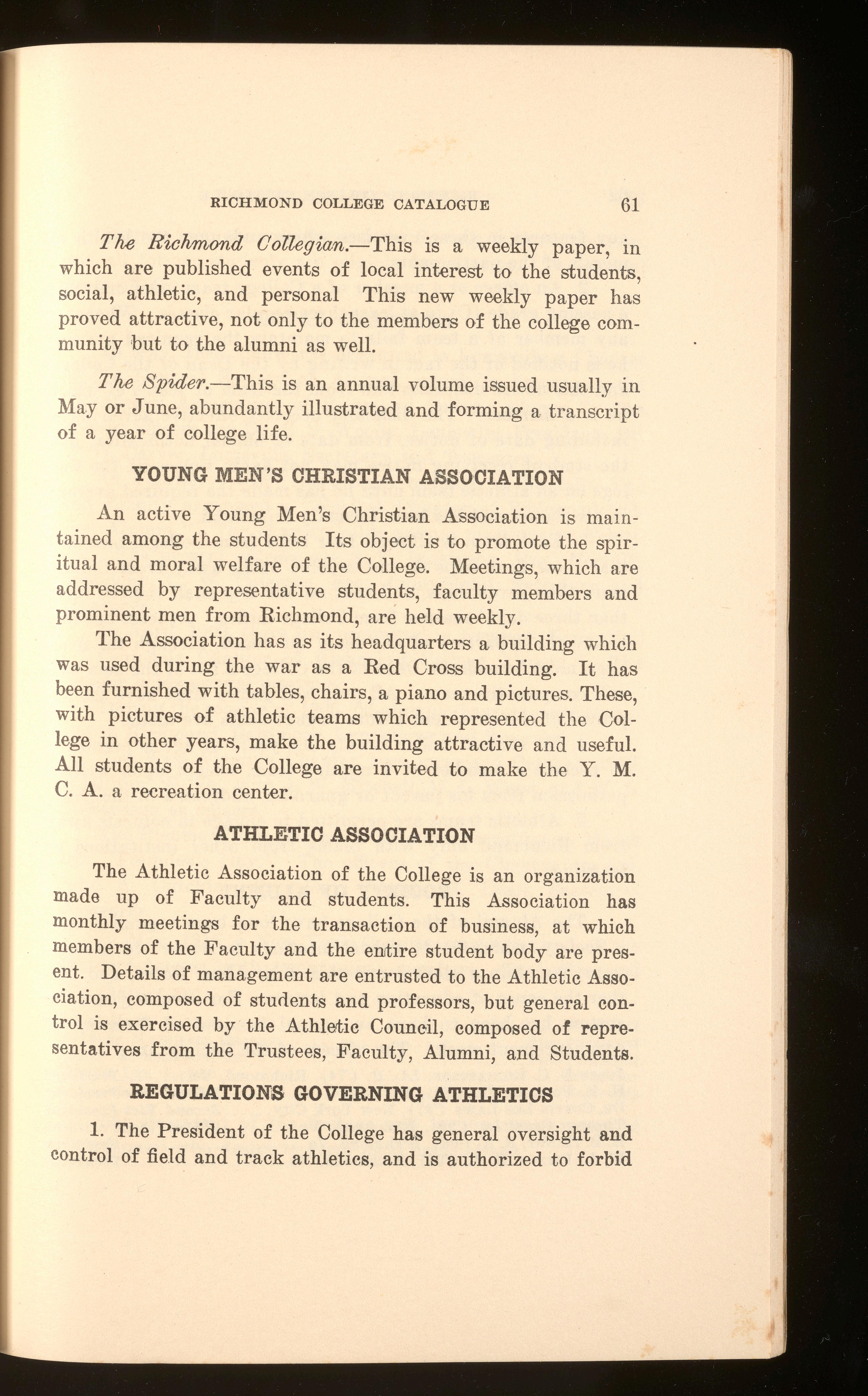
The Richmond Oollegian.-This is a. weekly paper, in which are published · events of local interest to the students, social, athletic, and personal This new weekly paper has pr oved attractive, not only to the members of the college commu nity but to the alumni as well.
The SpUer.-This is an annual volume issued usually in Ma.y or June, abundantly illustrated and forming a transcript of a year of college life.
A n active Young Men's Christian Association i s ma intaine d among the students Its object is t.o promote the spiritua l and moral welfare of the College. Meetings, which are ad dressed by representative students, faculty members and pr ominent men from Richmond, are held weekly.
The Association has as its headquarters a building which was used during the war as a Red Cross b uilding. It has been furnished with tables, chairs, a piano and pictures. These, · with pictures of athletic te-ams which represented the College in other years, make the building attractive and useful. A ll students of the College are invited to make the Y. M. C. A. a recreation center.
The Athletic Association of the College is an organization made up of Faculty and students. This Association has monthly meetings for the transaction of business, at which members of the Faculty and the entire student body are present. Details of management are entrusted to the Athletic Association, composed of students and professors, but general contr ol is exercised by the Athletic Council, composed of representatives from the Trustees, Faculty, Alumni, and Students.
1. The President of the College has general oversight and control of field and track athletics, and is authorized to forbid
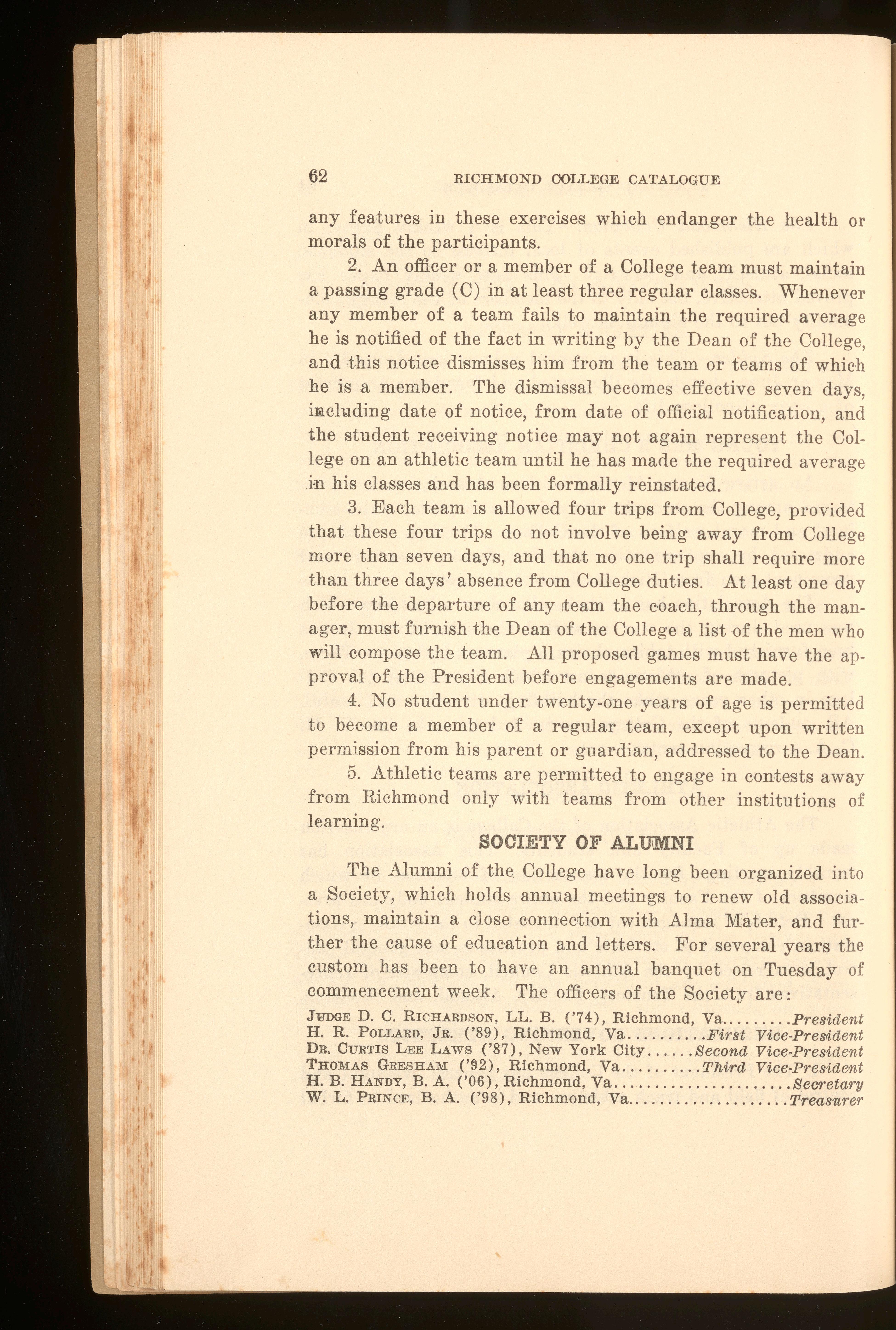
any feaitures in these exercises which enrlanger the health or morals of the participants.
2. An officer or a member of a College team must maintain a passing grade (C) in at least three regular classes. Whenever any member of a team fails to maintain the required average he is notified of the fact in writing by the Dean of the College, and :this notice dismisses him from the team or teams of whieh he is a member. The dismissal becomes effective seven days, i:achading date of notice, from date of official noti:fication, and the student receiving notice may not again represent the College on an athletic team until he has mane the required average .i-nhis classes and has been formally reinstaited.
3. E-ach team is allowed four trips from College, provided th at these four trips do not involve being away from College more than seven days, and that no one trip shall require more than three days' absence from College duties. At least one day before the departure of any rteam the eoach, through the manager, must furnish the Dean of the College a list -of the men who will compose the team. All proposerl games must have the approval of the President before engagements are made.
4. No student under twenty-one years of age is permitted to become a member of a regular team, except upon written permission from his parent or guardian, addressed to the Dean.
5. Athletic teams are permitted to engage in c-onrtests away from Richmond only with teams from other institutions of learning.
The Alumni of the College have long been organized into a Society, which holrls annual meetings to renew old associations, . maintain a close connection with Alma Mater, and further the cause of education and letters. For several years the custom has been to have an annual banquet on Tuesday of commencement week. The officers of the Society are:
JmJGE D. C. RICHARDSON, LL. B. ('74), Richmond, Va ....... _ President
H. R. POLLARD, JR. ('89), Richmond, Va ......... First Vice-Pres,ident
DB. CURTIS LEE LAWS ('87), New York City ..... Second Vice-President
THOMAS GRESHAM ('92), Richmond, Va .......... Third Vice-President
H.B. HANDY, B. A. ('06), Richmond, Va ..................... Secretary w. L. PRINCE, B. A. ('98), Richmond, Va .................... Treasurer
Degree men are members of the Society without election, and all former S!tudents are eligible for election. The annual fee is $1.00.
In May, 1898, there was organized in Louisville a Chapter of the General Society of Alumni, which is known as the '' Kentucky Association of Riehmond College Alumni.'' The present officers are Dr. E. S. Woody, Louisville, President; Dr. W. 0. Carver, Louisville, ·Secretary and Treasurer.
In February, 1899, the alumni resident in Norfolk, Va., anrl vicinity organized a ''Norfolk Chapter of Richmond College Alumni.'' The chapter holds annual meetings in February. The present officers are S. T. Dickinson, Esq., Norfolk, President; C. W. Coleman, Esq., Churchland, Secretary and Treasurer.
In April, 1903, 1there was organized in Newport News, Va., a "Peninsula Chapter of Richmond College Alumni." The chapter holds annual meetings.
During the session of 1905-'06 alumni ehapters were organized in Richmond, Baltimore, Lynchburg and Roanoke.
The West Virginia Chapter was organized October, 1910, at I-Iinton, W. Va., with J. W. Mitchell, M. L. Wood, anrl vV.L. Richardson as officers.
The Richmond Chapter holds its annual meeting on March 4th, "Founder's Day." The officers of the Chapter are Col. John A. Cutchins, President; Claude M. Dean, S,ecretaryTreasurer.
In May, 1916, a New York: Chapter was organized at the Waldorf-Astoria with twenty-nine members. The officers of this chapter are :
JESSE READ TAYLOR
CHARLES MARSHALL GRAVES
HENRY K. ELLYSON, JR
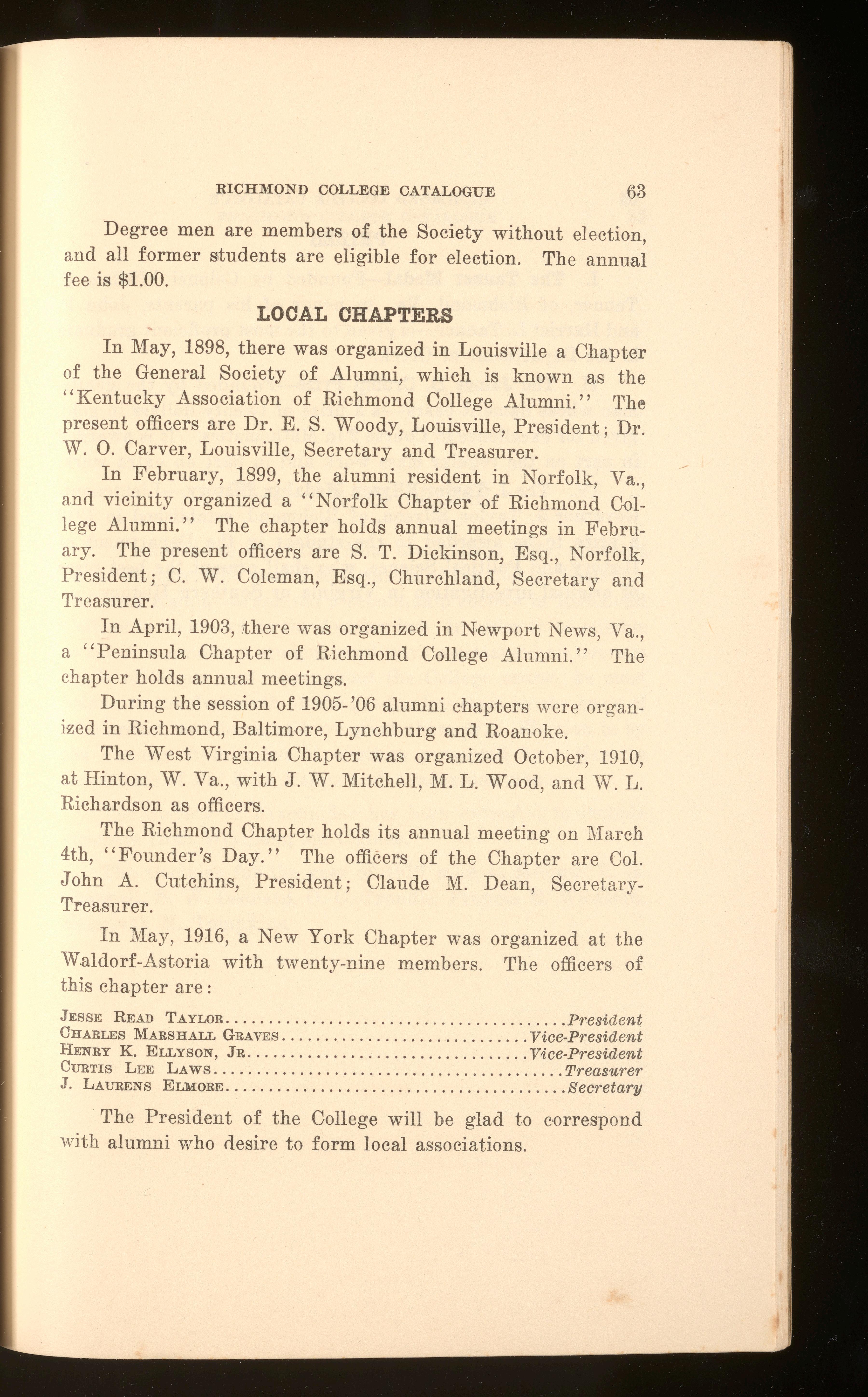
President
Vice-President
CURTIS LEE LA ws ......................................... Treasurer J. LAURENS ELMORE . ....................................... Secretary
· The President of the College will be glad to eorrespond with alumni who rlesire to form local associations. --
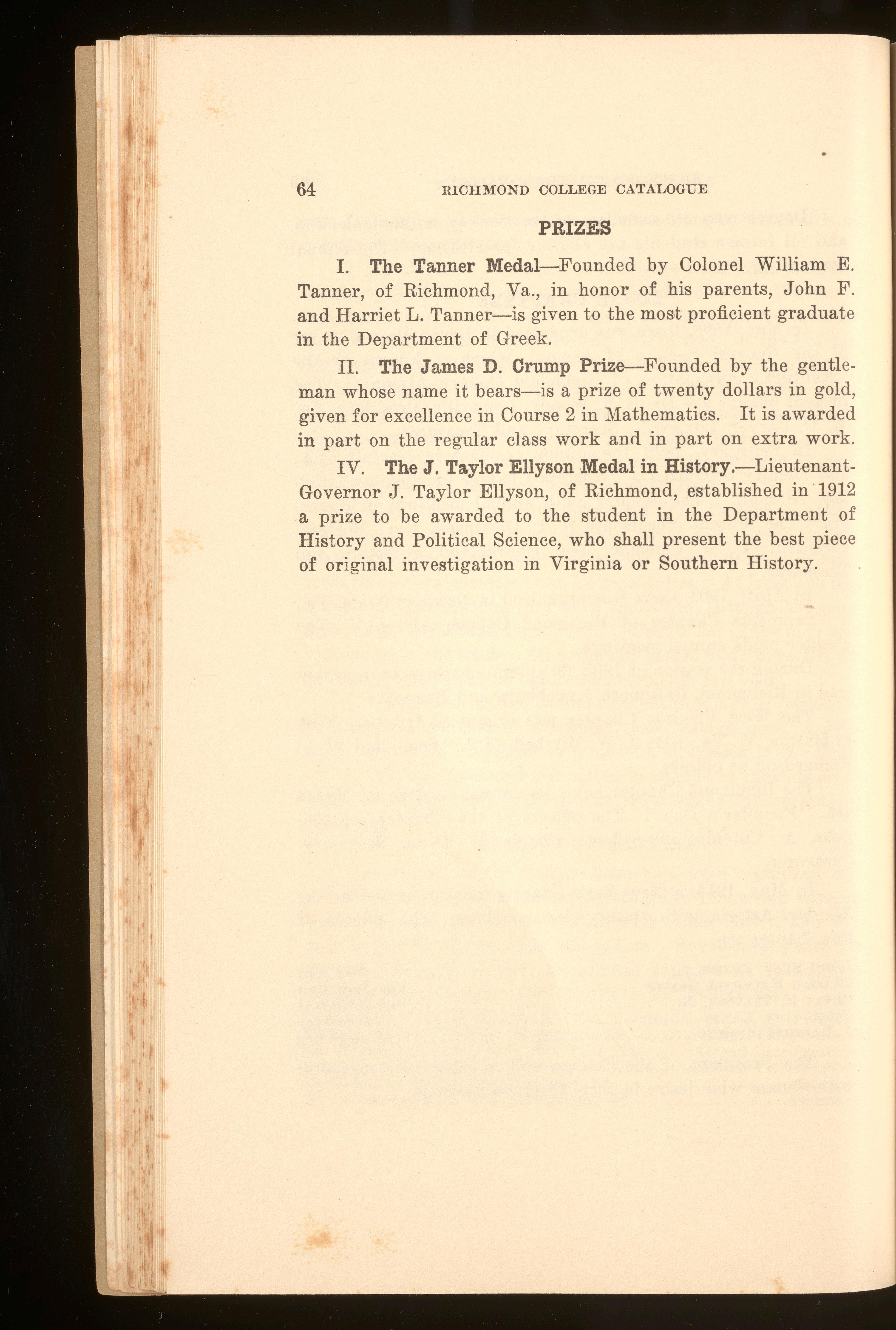
I. The Tanner Medal-Founded by Colonel William E. Tanner, of Richmond, Va., in honor of his parents, John F. and Harriet L. Tanner-is given to the most proficient graduate in the Department of Greek.
II. The James D. Crump Prize-Founded by the gentleman whose name it bears-is a prize of twenty dollars in gold, given for excellence in Course 2 in Mathematics. It is awarded in part on the regular class work an<l. in part on extra work.
IV. The J. Taylor Ellyson Medal in Histo,ry.-LieutenantGovernor J. Taylor Ellyson, of Richmond, established in ·1912 a prize to be awarded to the student in the Department of History and Politic.al Science, who shall present the best piece of original investigation in Virginia or Southern History.
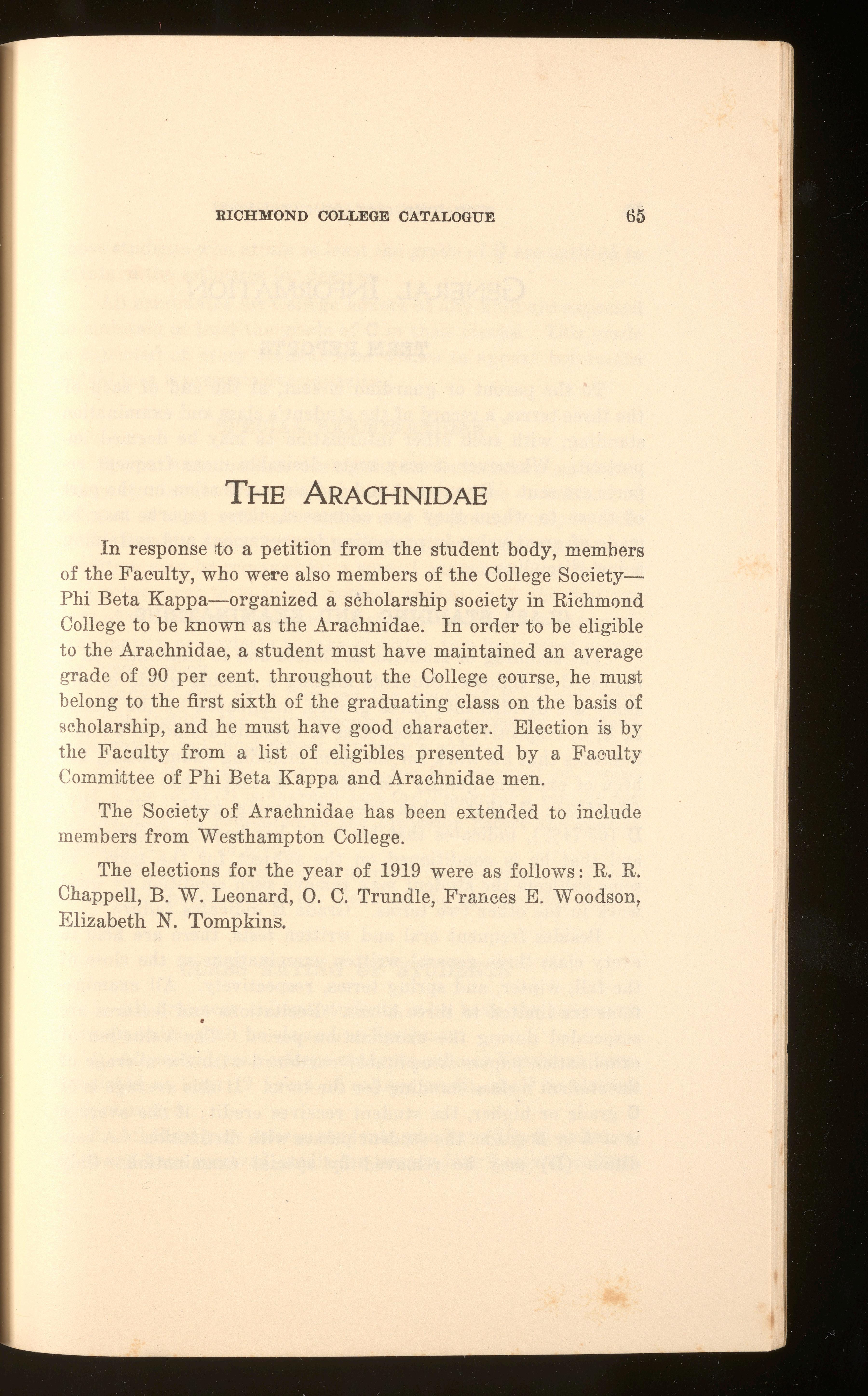
In response rt-o a petition from the student body, members of the Faeulty, who were also members of the College SocietyPhi Beta Kappa-organized a scholarship society in Richmond College to be known as the Arachnidae. In order to be eligible to the Arachnidae, a student must have maintained an average gra de of 90 per cent. throughout the Cnllege course, he must belong to the first sixth of the graduating class on the basis of scholarship, and he must have good character. Election is by the Faculty from a list of eligibles presented by a Faeulty Commiittee of Phi Beta Kappa and Arachnidae men.
The society of Arachnidae has been extenrled to include members from Westhampton College.
The elections for the year of 1919 were as follows : R. R. Chappell, B. W. Leonard, 0. C· . Trundle, Frances E. Woodson, El izabeth N. Tompkins •
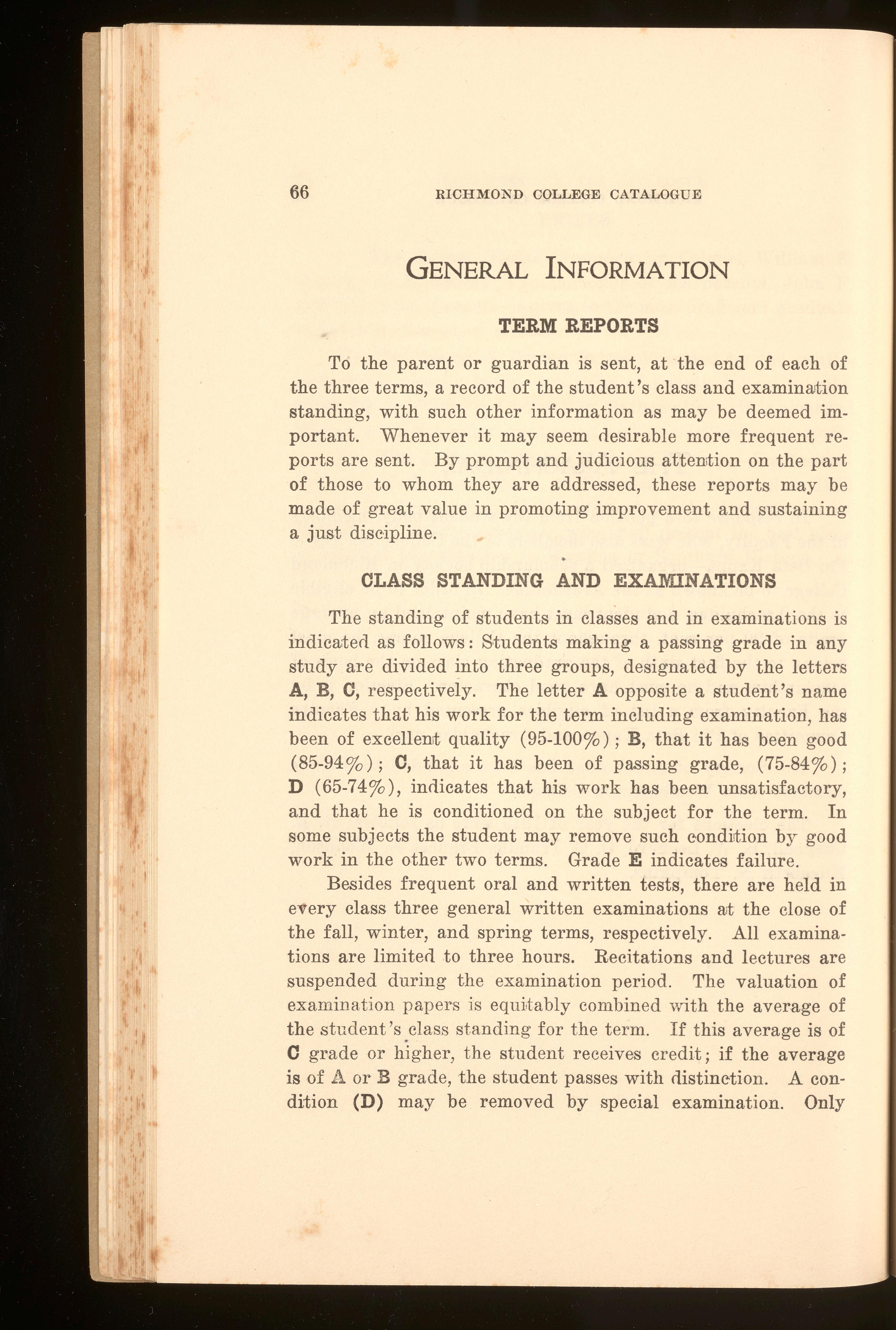
To the parent or guardian is sent, at t~e end of each of the three terms, a record of the student's class and examinwtion standing, with such other information as may be deemed important. Whenever it may seem desirable more frequent reports are sent. By prompt and judicious atten1tion on the part of those to whom they are addressed, these reports may be made of great value in promoting improvement and sustaining a just discipline. .,
The standing of students in classes and in examinations is indicated as follows : S,tudents making a passing grade in any study are divided into three groups, designated by the letters A, B, C, respectively. The letter A opp-osite a student's name indicates that his work for the term including examination, has been of excellenit quality (95-100%) ; B, that it has been good (85-94%); C, that it has been of passing grade, (75-84%); D (65-74% ), indicates that his work has been unsatisfactory, and that he is conditioned on the subject for the term. In some subjects the student may rem·ove such eondiition by good work in the other tw -o terms. Grade E indicates failure. Besides frequent oral and written tests, there are held in every class three general writte11 examinations wt the close of the fall, winter, and spring terms, respectively. All examinations are limited to three hours. Recitations and lectures are suspended during the examination period. The valuation of examination papers is equitably cor.abined vnth the average of the student's class standing for the term. If this average is of C grade or higher, the student receives credit; if the average is of A or B grade, the student passes with distinetion. A condition (D) may be removed by special examination. Only

t hose students who attain ~t least the grade of O are entitled to p oints in the estimates for degrees.
All candidates for College honors of any kind are ,expected to maintain art least the grarle of C in their classes. This grade is expected of every student who wishes to appear before the pub lic in a representative capacity.
Special examinations during the current session , made necess ary by absence from the regular examinations 011 aecourit of' sickn ess or other sufficient reason, may be granted only b y vote of t he Faculty upon the written request from the studen t . A con dition may be removed by a special examination at the end of a subsequent term in the current session or in the firs t ten day s of the following session. A student who fails to pass such exa mination or neglects to take it within this limit must r ep eat the term's work.
S1tudents who have receiverl the grade of E on a n y t erm may not absolve the requirements in this course by a special exam ination, but must repeat the term's work.
For eaeh special examination for the removal of conditions, a fee of $1.00 is charged and the Treasurer's receipt for the fee must be presented to ithe professor before the special exam ination will be given.
A schedule of special examinations for the rem-oval of con-ditio ns will be posted by the Dean on the opening day of the . session.
1. All first-year college students, who have the necessary ent rance units, shall be classed as Freshmen.
2. All second-year college stuilenits, who as Freshmen have oompleted at least 12 hours 6f college credit, shall be classed a s Sophomores.
3. All third-year c-ollege students who have fifteen entrance un its and have received credit for twenty-four hours of college
68

RICHMOND OOLLEGE CATALOGUE
work, h:aving taken six hours in English, three hours in Mathematics, six hours in Foreign Languages, and four .hours in Lab oratory Science, shall be classes as Juniors.
4. All students who lack only one possible year's work for completion of all degree requirements and who matriculate for suc-h required courses, shall be classed as S,eniors.
In the College of Liberal Arts the degrees of Baehelor of Arts (B. A.), Bachelor of Science (B. S.), Bachelor of Science in Medicine (B. S. [Med.]), and Master of Arts (M. A.), are offered. The candidate for .a bachelor's degree ( except the de .. gree of Bachelor of Science in Medicine) must complete before graduation, sixty-two hours of college work. One class period per ,veek for the session is fthe unit. Most classes meet three times a week, an ·d a class year, therefore, unless otherwise stated, counts three hours. Classes in the physical sciencesc hemistry, Physics, Biology, count four hours each. A tota l of fifteen hours a week is regarded as the standard amount of ,vork, tv,elve hours the minimum, and eigh1teen hours th e . maximum.
•Sixty- t-\v o hours of eollege work are required, distr i b u te d as follows:
1. All canrlidates for the degree must take three ho u rs in Latin or Greek through course 2; six hours in two of the t h r ee modern lan g uages, French, Spanish, and German ; six hours i n English; three hours in Philosophy or Education; three hou rs in His 1tory; three hour s in M·1athematics; four h·ours in each of two of the sciences, Physics, Chemistry and Biology. A studen t who takes both Latin and Greek may choose between French , S , panish and German, taking three hours in the one in which his entranee units were offered. It is further require d that six of the elective hours must be chosen from the Social Sciences , and nine from Foreign I__Janguages,1vlathematics and Science.

,2. In adrlition to the specific requirements mentioned above, the student must, before the beginning of his Junior year, choose two major subjects from the following list: Latin, nine hours; Gree~, nine ( or twelve) hours; any rtwo of the three modern foreign languages, Freneh, Spanish and German, twelve hours; English, twelve hours; P . hilosophy and Education, nine hours; History and Political Science, nine hours; Mathematics, nine hours; Physics, twelve hours; Chemistry, twelve hours; Biology, twelve hours.
3. Students who have attained Junior standing will, as a rule, be required to elect courses which are not intenderl primarily for Freshmen and Sophomores.
NoTE.-The number of hours required for a Major includes the hours previously specified in that subject.
Sixty-two hours of college work are required, distributed as follows:
1. All candidates for the degree must take nine hours in two of the three modern foreign languages, French, 'Spanish and German; six hours in English; 1t.hree hours in Philosophy; three hours in Eeonomics or Political Science; six hours in Mathematics; four hours in each of the three sciences, Physics, Chemistry and Biology.
2. In arldition to the specific requirements mentioned above, the student must, before the beginning of his Junior year, choose two Major subjects from 1t:hefollowing lists: Mathematics, 9 hours; Physics, 12 hours; Chemistry, 12· hours; Biology, 12 hours.
3. Students who have attained Junior standing will, as a rule, be required to elect eourses which are not intended primarily for Freshmen and Sophomores.
NoTE.-The number of hours required for a Major includes the hour'S previously specified in that subject.
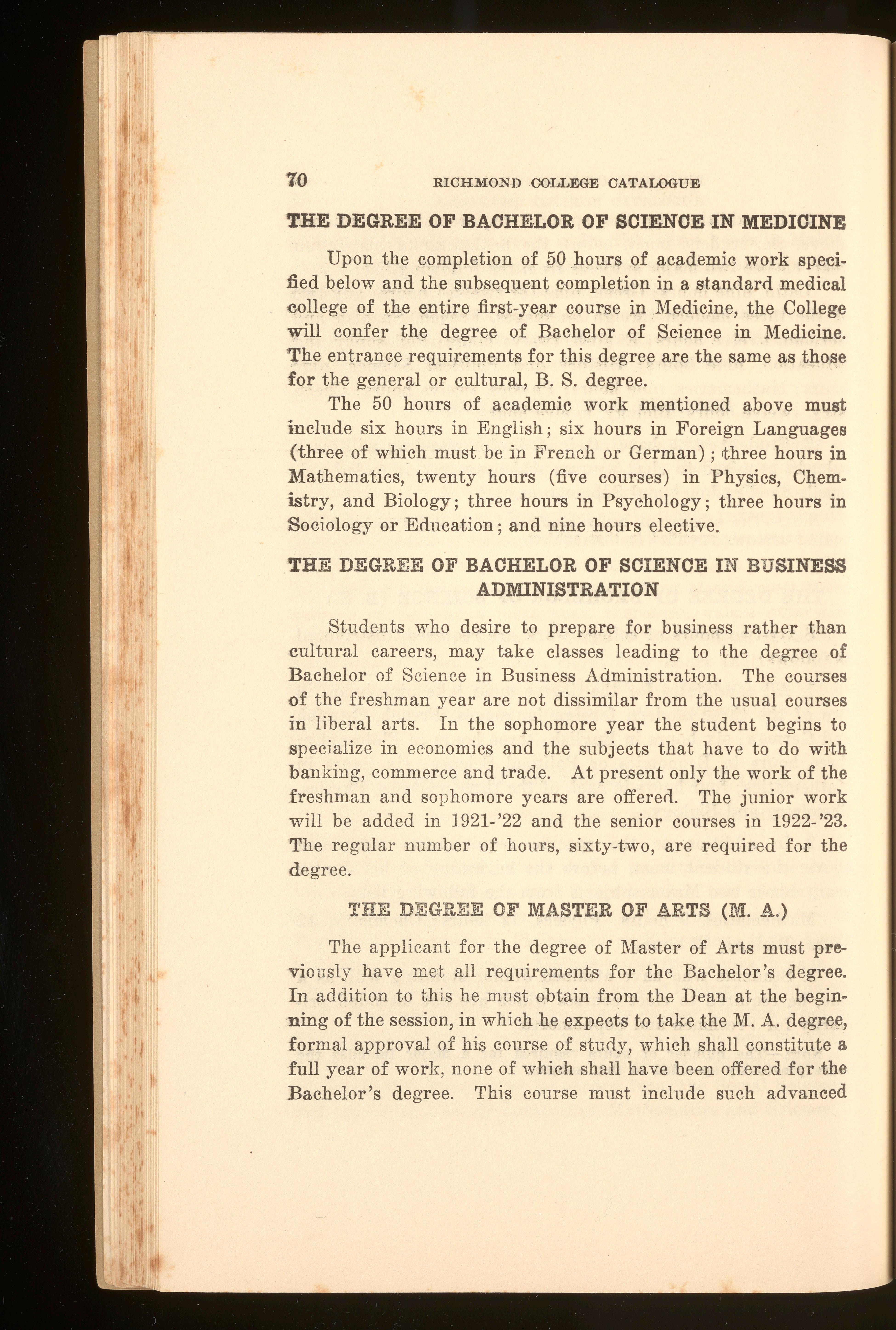
Upon the completion of 50 hours of academic work specined below and the su~sequent c-ompletion in a standard medical college of the enti re first-year cou rse in Medicine, the Colleg~ will con £er the degree of B.ach~lor of Science in Medicine. The entrance requirements for tliis degre~ are the same as those fo r ,the g~;neral or cultural, B. S. degree.
The 50 hours of academic work mentioned above must include six hours in English; six hours in Foreign Languages (three of which must be in French or German); rthree hours in 1\fathematics, twenty hours (five courses) in Physics, Chemistry, and Biology; three hours in Psyehology; three hours in Sociology or Education; and nin . ~ hours elective.
Students who desire t o prepa~e for business rather th-an cultural careers, may take classes leading to 1the degree of Bachelor of Science in Business Administration. The courses of the freshman year are not dissimilar from the usual courses in liberal arts. In the sophomore year the student begins to specialize in eeonomics and the subjects that have to do wirt.h banking, commerce and trade. At present only the work of the freshman and sophomore years are offererl. The junior work will be added in 1921-'22 and the senior courses in 1922- '23. The regular number of hours, sixty-two, are required for the degree.
The applicant for the degree of lVIaster of Arts must previously have me:t all requirements for the Bachelor's degree. In addition to th i s he must obtain from the Dean at the begin·ning of the session, in which h.e e~pects to take the M. A. degre~, fo rmal approval of his course of sturly, which shall constitute a full year of work, none of which shall have been offered for the Bachelor's degree. This course must include su ·ch advanced
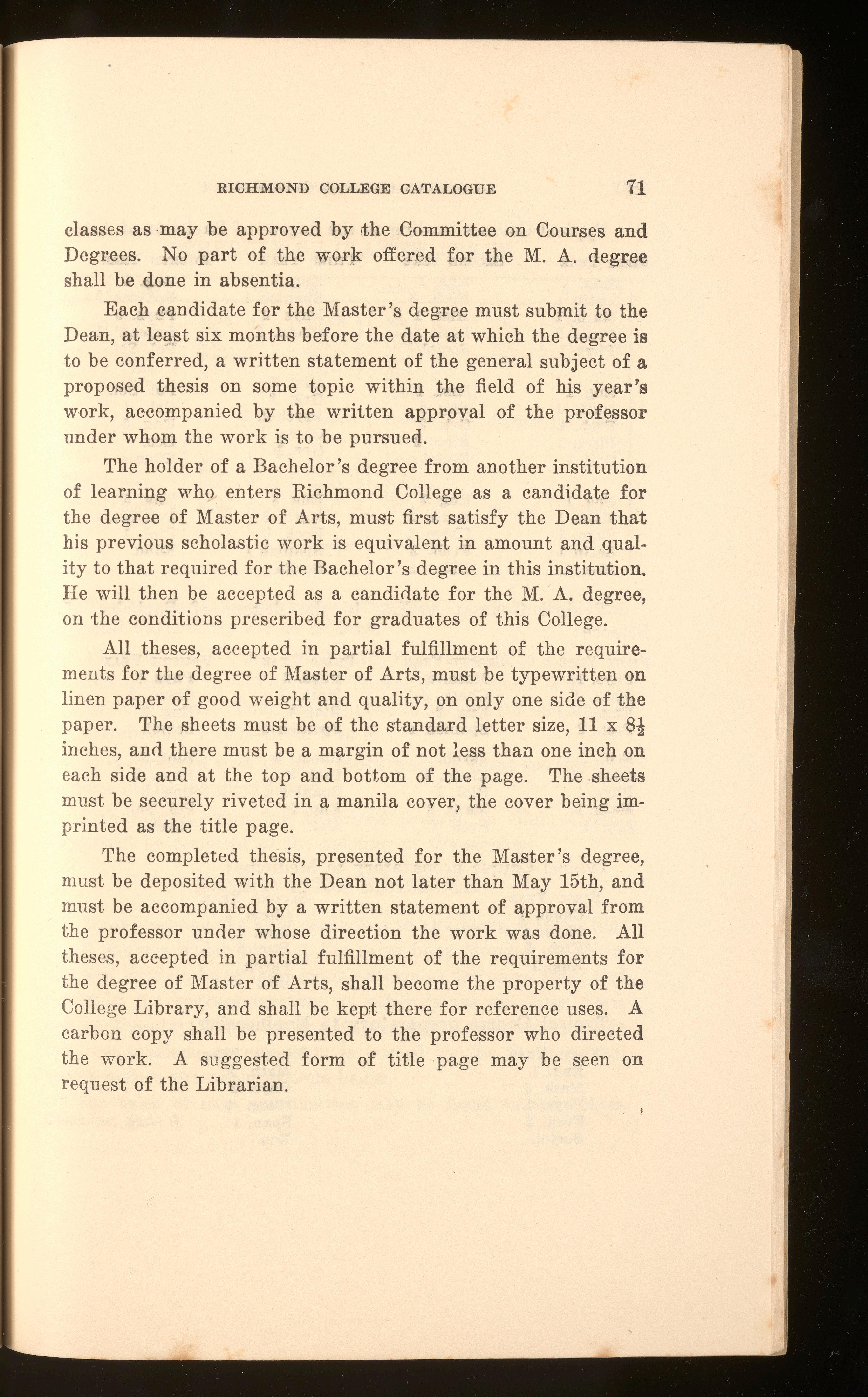
classes as -may be approved by rthe Committee on Courses and D egrees. No part of the wo r)r offered for the M. A. rlegree sh all be done in absentia.
E.ac~ c~ndidate for the lVIaster's deg -ree must submit to the D ean, at least six months before the date at which the degree is to be conferred, a written statement of the general subject of a p roposed thesis on some topic within the field of his year's w-ork :, aecompanied by the written approy~l of the professor under whom the work is to be pursuerl.
The holder of a Bachelor's degree from another institution of learning ,vho enters Richmond College as a candidate for the degree of Master of Arts, must first satisfy the Dean that hi s previous scholastic work is equivalent in amount and quality to that required for the Bachelor's degree in this institution. He will then be accepted as a candirlate for the M. A. degree, on the conditions prescribed for graduates of this College.
All theses, accepted in partial fulfillment of the requiremen ts for the degree of Master of Arts, must be typewritten on lin en paper of good weight and quality, on only one side of the pa per. The sheets must be of the standard letter size, 11 x 8½ in ches, anrl there must be a margin of not less than one inch on ea ch side and at the top and bottom of the page. The sheets mu st be securely riveted in a manila cover, the cover being impr inted as the title page.
The completed thesis, presented for the Master's degree, mus t be deposited ,¥ith the Dean not later than May 15th, and mu st be accompanied by a written statement of approval from the professor unrler whose direction the work was done. All th eses, aceepted in partial fulfillment of the requirements for th e d egree of Master of Arts, shall become the property of the Col l eg e Library, and shall be kept there for reference uses. A ca rbon copy shall be presented to the professor who directed the work. A suggested form of title page m.ay be seen on re q u est of the Librarian.
RICHMOND OOLLEGE CATALOGUE
Typical Courses leading to t ,he degree of Bachelor of Arts:
FIRST YEAR
Eng. 1
Latin 1
Math. 1 Frch. 2 Phys. 1
Eng. 1
Math. 1 Frch. 2
J?hys. 1 Grk. 1
Eng. 1
Math. 1
Phys. 1
Latin 1
Hist. 1
SECOND YEAR
Eng. 2 Frch. 3
Hist. 1 Bible 2 Sociol.
Hist. 1
Eng. 2 Grk. 2
Bible 2 Sociol.
Eng. 2
Math. 2
Chem. 1 Frch. 2
Bible 2
THIRD YEAR
Eng. 3
Spanish 1 Phys. 2 Chem. 1
Hist. 2 Grk. 3
Psychol. 1 Chem. 1 -Ger. 1
Eng. 3 Math. 3 Frch. 3
Spanish 1 Sociol.
FOURTH YEAR
Eng. 5 ,Spanish 2
Phys. 3
Psychol. 1
Pol. Sci.
Pol. Sci.
Grk. 4
Eng. 5
Eco.
Educ.
Eng. 5
Pol. Sci. 1 Biol. 1
Educ.
Typical Courses leading to the degree of Bachelor of Science:
FIRST YEAR
Phys. 1
Math. 1
Eng. 1 Frch. 2
· Eco. Chem. 1 Phys. 1 Math. 1 Eng. 1

SEOOND YEAR
Math. 2 Chem. 2
Eng. 2 Spanish 1
Psych. Chem. 2 Biol. 1
Math. 2 Frch. 2
THIRD YEAR
Phys. 2 Math. 3 Biol. 1
Spanish 2
Chem. 3
Biol. 2
Spanish 1 Eng. 2 Eco.
Typieal Course preparatory to Medicine:
FIRST YEAR
Chem. 1 Phys. 1 Frch. 2 Eng. 1
FOURTH YEA11
Phys. 3
Chem. 2
Eng. 3 Sociol.
Biol. 3
Phys. 2
Eng. 3
Pol. Sci. Psych.
SECOND YEAR
Chem. 2 Biol. 1
Eng. 2 Psych. Eco.
Typical Course preparatory to Engineering:
FIRST YEAR
Eng. 1 Math. 1
Phys. 1 Frch. 2 Sociol.
SECOND YEAR
Math. 2 Phys. 2
Chem. 1
Span. 1 Eco.

The regular labora ~tory hours for Physics, .Chemistry, Biology, anrl Psychology are as follows:
Physics 1 (a)-Tues. and Thurs., 9 to 11 and 2 to 4.
Chemistry 1 (a)- _ Tues. and Thurs., 9 to 11 and 2 to 4.
Biology 1 (a)---Tu.es. and Thurs., 11 :20 to 1 :10 and 2 to 4.
Psychology 1 (a)-Mon. 2 to 5.
It is expected that all laboratory w-ork in these .courses will be done in the assigned hours.
Laboratory hours for advanced courses in Biol., Chem., Phy s. will be assigned at the opening of the session.
Examina ,tions are held. according to the block system, that is, all courses which meet at the same hour Monday, Wednesday and Friday, have their examinations :at the same time, and similarly for courses meeting at other hours on these days, and on Tuesday, Thursday and Saturday. A rletailed schedule for examinations on any term is posted by the Dean several weeks before the examina:tions begin.
The dates of term examinations may be found in the College Calendar, page 3.
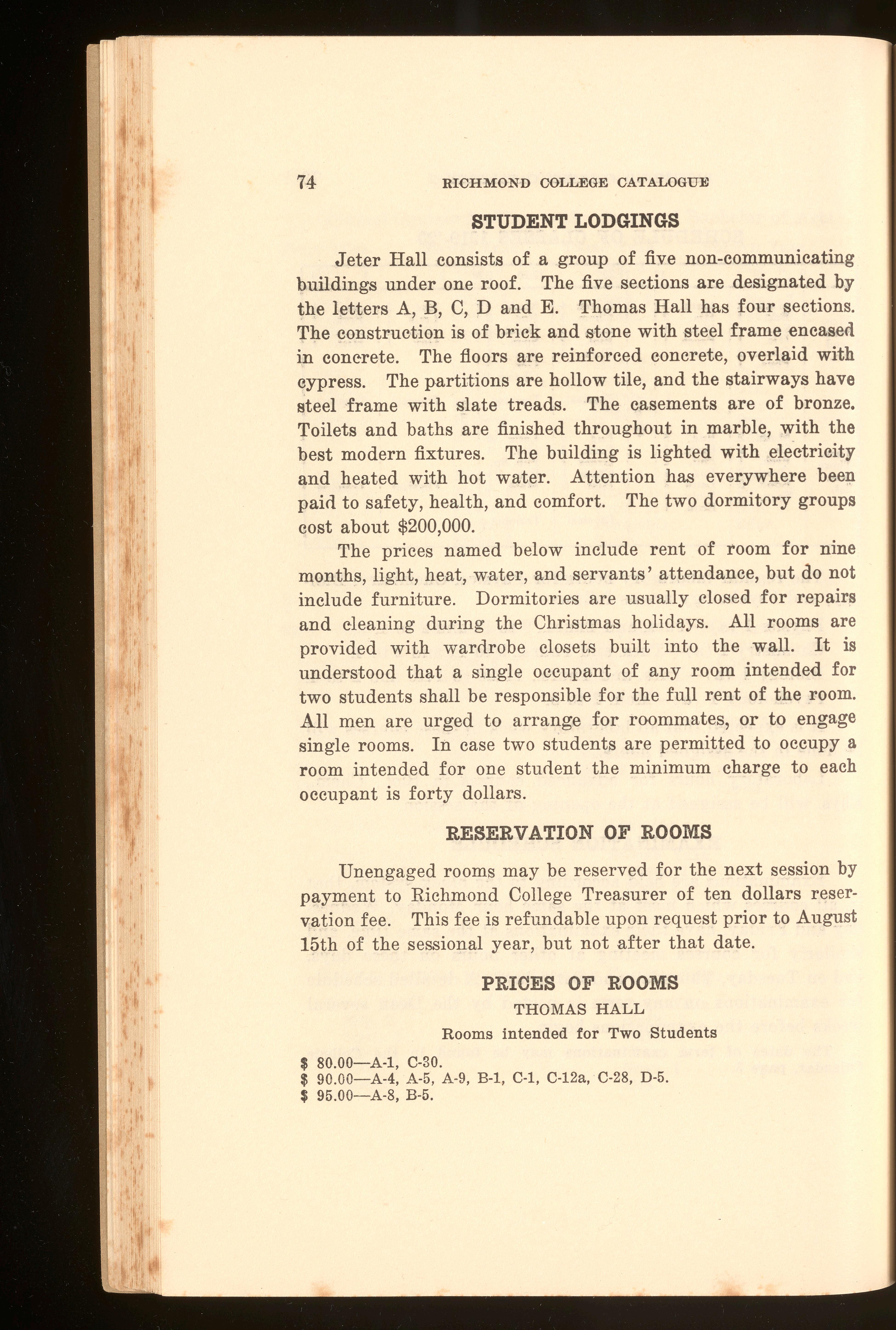
Jeter Hall ·consists of a group of five non-communicating buildings under one roof. The five sections are designated by the letters A, J3,C, D and E. T~omas Hall has four sections. T~e ~onstructiqn is of brick and stone with •Steel frame ,encased in conerete. The floors are reinforced concrete, overlaid with cypress. The partitions are hollow tile, and the stairways have s,teel frame with s_late treads. The casements are of bronze. roilets and baths are finished throughout in marble, with the best modern fixtures. The buildi~g is lighted with .electricity and heat~d with hot wat~r. Attention has everywhe .re beeµ pairl to safety, health, and comfort. The two dormitory groups cost about $200,000.
The prices named below include rent of room for nine month s, light, heat, water, -and servants' attendance, but do not include furniture. Dormitories are usually closed for repair~ and c1eaning during the Christmas holidays. All rooms are provided with warrlrobe closets built into the wall. It is understood that a single occupant of any room intended for two students shall be responsible .for the full rent of the .room. All men are urged to arrange for roommates, or to engage single rooms. In case two students are permitted to occupy a room intended for one sturlent the minimum charge to each occupant is forty dollars.
Unengaged room s may be reserved for the next session by payment to Richm-ond College Treasurer of ten dollars r~servation fee. This fee is refundable upon request prior t o August 15th of the sessional year, but not after that date.
THOMAS HALL
Rooms intended for Two Students
$ 80.00-A-l, C-30.
$ 90.00-A-4, A-5, A-9, B-1, C-1, C-12a, ·C-28, D-5. $ 95.00-A-8, B-5.
$100.00-A-14, A-15, C-4, C-16, C-37, C-38, D-10.
$110.00-A-12a, B-4, C-10, C-22, C-34.
$120.00-A-2, A-3, B-2, B-3, B-6, B-7, B-8, C-8, C-11, C-17, C-20, C-33, C-35, D-3, D-8, A-6, A-7, -C-5, C-6, C-9, C-18, C-21, C-23.
$45.00-D-4.
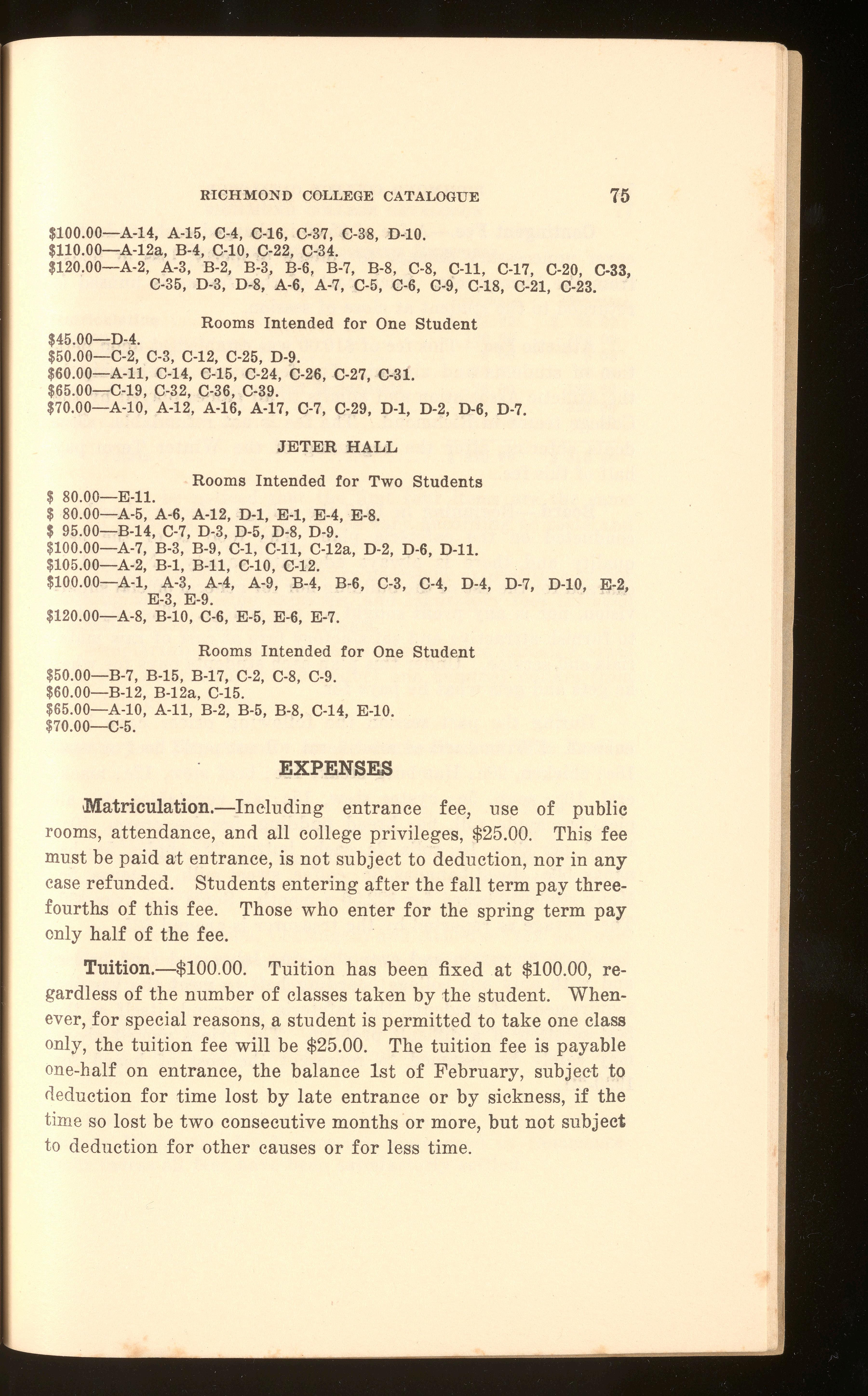
Rooms Intended for One Student
$50.00-C-2, C-3, C-12, C-25, D-9.
$60.00-A-11, C-14, C-15, -C-24, C-26, C-27, C-31.
$65.00-C-19, C-32, C-36, C-39.
$70.00-A- 10, A-12, A-16, A-17, C-7, C-29, D-1, D-2, D-6, D-7.
Rooms Intended for Two Students
$ 80.00-E-11.
$ 80.00-A-5, A-6, A-12, D-1, E-1, E-4, -E-8.
$ 95.00-B-14, C-7, D-3, D-5, D-8, D-9.
$100.00-A-7, B-3, B-9, C-1, C-11, C-12a, D-2, D-6, D-11.
$105.00-A-2, B-1, B-11, C-10, C-12.
$100.00-A-1, A-3, A-4, A-9, B-4, B-6, C-3, C-4, D-4, D-7, D-10, ~-~, E-3, E-9. -
$120.00-A-8, B-10, C-6, E-5, E-6, E-7.
Rooms Intended for One Student
$50.00-B-7, B-15, B-17, C-2, C-8, C-9.
$60.00-B-12, B-12a, C-15.
$65.00-A-10, A-11, B-2, B-5, B-8, C-14, E-10.
$70.00-C-5.
Matriculation.-Inc1uding entrance fee, use of public rooms, attendance, anrl all college privileges, $25.00. This fee mu st be paid at entrance, is not subject to deduction, nor in any case refunded. Students entering after the fall term pay threefou rths of this fee. Those who enter for the spring term pay only half of the fee.
Tuition.-$100 .00. Tuition has been fixed .at $100.00, regar dless of the number of classes taken by the student Whenever, for special reasons, a student is permitted to take on e class only , the tuition fee will be $25.00. The tuition fee is payable one-half on entrance, the balance 1st of February, subject to cleduction for time lost by late entrance or by sickness, if the time so lost be two consecutive months or more, but not subject to d eduction for other causes or for less time.
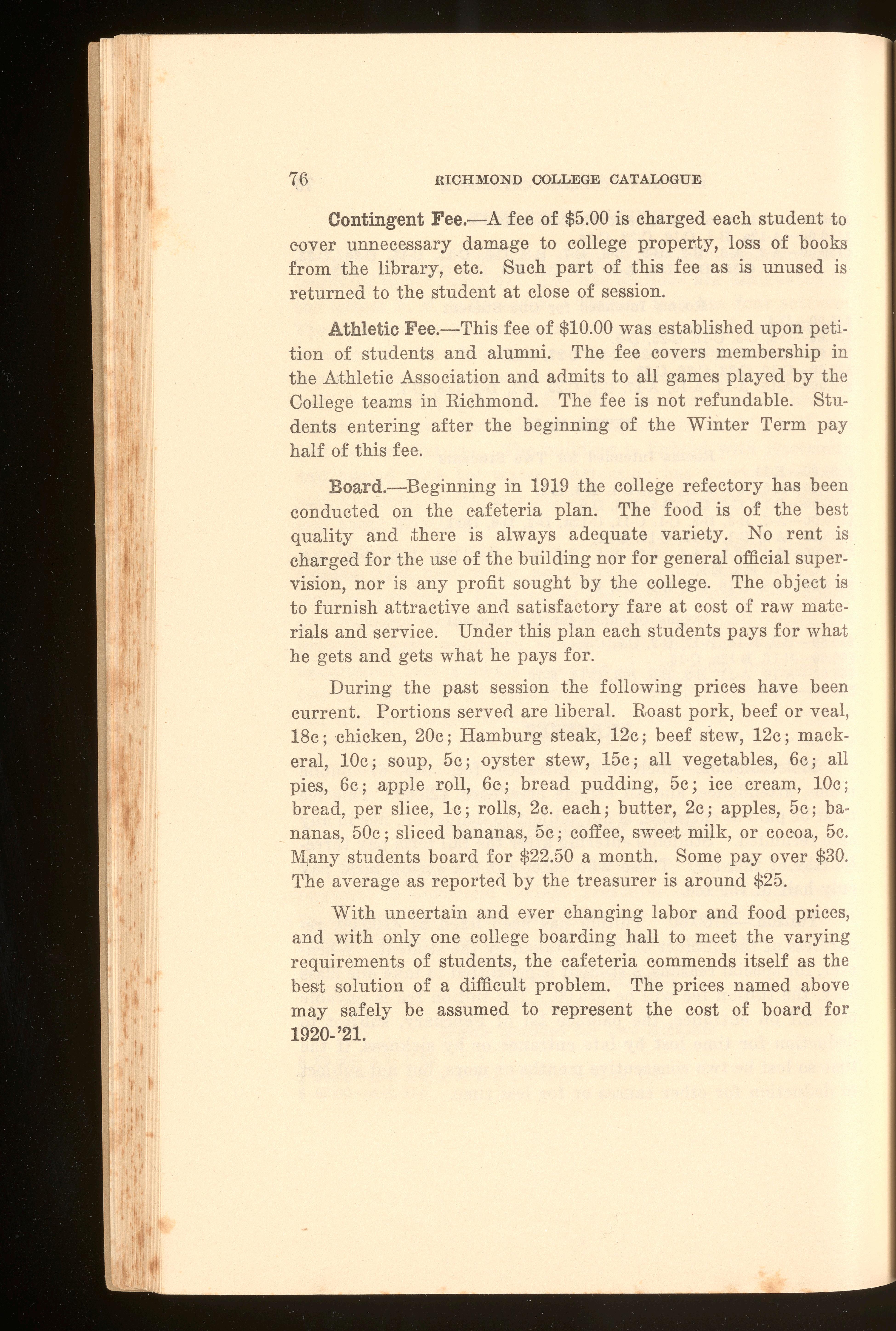
Contingent Fee.-A fee of $5.00 is charged each student to c1over unnecessary damage to -college properity, loss of books from the library, etc. 1Such part of this fee as is unused is returned to the student at close of session.
Athletic Fee.-This fee of $10.00 was established upon petition of students and alumni. The fee covers membership in the Athletic Association and arlmits to all games played by the College teams in Richmond. The fee is not refundable. Students entering· after the b~ginning of the Winter Term pay half of this fee.
Board.-Beginning in 19l9 the college refectory has been conducted on the cafeteria plan. The food is of the best quality and ithere is always adequate variety. No rent is charged for the use of the building nor for general official supervision, nor is any profit sought by the college. The object is to furnish attractive ,anrl satisfactory fare at cost of raw materials and service. Under this plan each students pays for ,vhat he gets and gets what he pays for.
During the past session the following prices have been current. Portions serverl are liberal. Roast pork, beef or veal, 18c; ·chicken, 20c; Hamburg steak, 12c; beef stew, 12c; mackeral, 10c; soup, 5c; oyster stew, 15c; all vegetables, 6c; all pies, 6c; apple roll, 6c,; bread pudding, 5c; ice cream, 10c; bread, per slice, le; rolls, 2c. each; butter, 2c; apples, 5c; bananas, 50c ; sliced bananas, 5c; coffee, sweet milk, or coeoa, 5c. ~any students board for $22.50 a month. Some pay over $30. The average .as reporterl by the treasurer is around $25.
With uncertain and ever changing labor and food prices, and with only one college boarding hall to meet the varying requirements of students, the ·cafeteria commends itself as the best solution of a difficult problem. The prices . named above may safely be assumed to represent the cost of board for 1920-'21.
RICHMOND COLLEGE CATALOGUE
Summary of Necessary Expenses.
Economical Estimate.
Matriculation ................................ $ 25 00
Tuiti on ..........
Contingen t Fee
Athletic Fee
Room, Furniture, Laundry and Incidentals. . . 75 00
Table Board
Books
It will be noticed that the first four items are the same f or all students. Other expenses vary according to tiaste and financial ability of students.
These estimates include every necessary expenditure except clothing and traveling expenses, and laboratory fees for such stu dents as take laboratory classes.
Scholarship students, or canrlidates for the ministry, since th ey pay no tuition, should deduct one hundred dollars from th e totals given above.
Summary of Expenses for an Academic Student Who Resides in ·Richmond
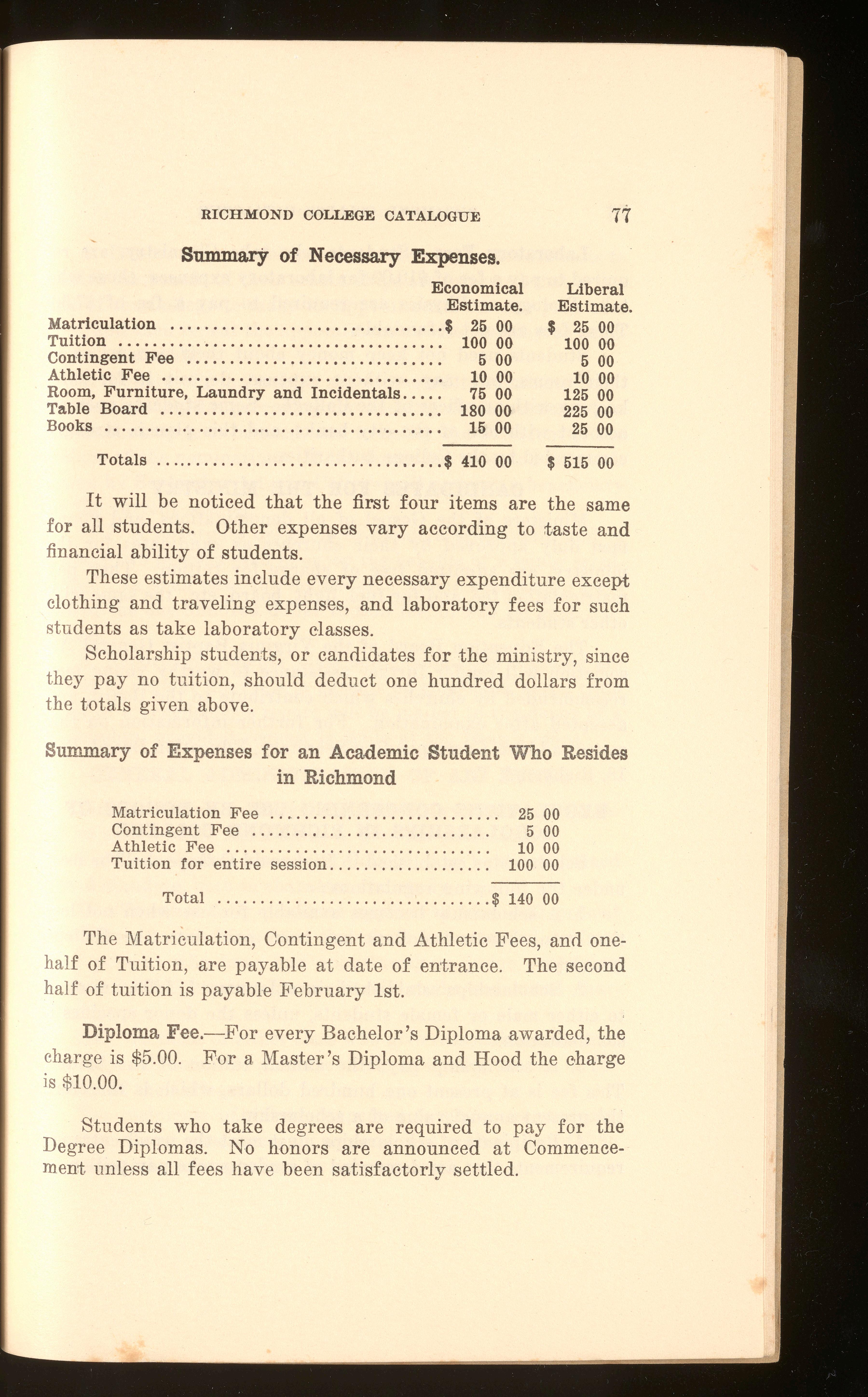
Tuition for entire session.
The Matriculation, Contingent and Athletic Fees, anrl onehal f of Tuition, are payable at date of entrance. The second hal f of tuition is payable February 1st.
Diploma Fe e.-For every Bachelor's Diploma .awarded, the charge is $5.00. F or a Master's Diploma and Hood the c,harge is $10.00.
·Students who take degrees are required to pay for the Degree Diplomas. No h-onors are announced at Commencement unless all fees have been satisfactorly settled.

Laboratory Fee ,s.-Students who take Chemistry, are required to pay a fee of $10.00 for laboratory expenses; those who take Biology or Physics are required to pay a fee of $7.50. These fees are not refundable.
Stu<lents need not keep money about their persons or in their rooms, but may, without expense, deposit it for safekeeping with an officer of the College. Some students open an account with one of the city banks, and this plan is strongl y commended by the College authorities.
Ministers of the Gospel of all denominations, and youn g men duly approved by their churehes as candidates for th e ministry, are admitte<l free of charge for tuition. They pa y matriculation fee, and for fuel, light, board, etc., the same wit h other students.
The Education Board of the Virginia Baptist General A ssociation will render further assistance to worthy young me n recommended by churches which eontribute to the Board, an d aceepted after examination. For further information on th is matter a<ldress Corresponding Secretary, Education Board, Box 18, Richmond, Va.
Scholarships established in Richmond College shall be used under the following regulations:
1. A scholarship becomes available for use when not less th-an two thousand dollars has been paid into the Colleg e treasury.
2. Scholarships established since January 1, 1908, are open to either male or fem ale students, unless the donor specifies a sex limitation.
3. A scholarship pays the annual tuition of the holder. This fee is at present one hunilred dollars, which is therefore the present annual value of a seholarship.
4. Recipients of scholarships must meet the usual entranc e requirements that are demanded of students who pay tuition.
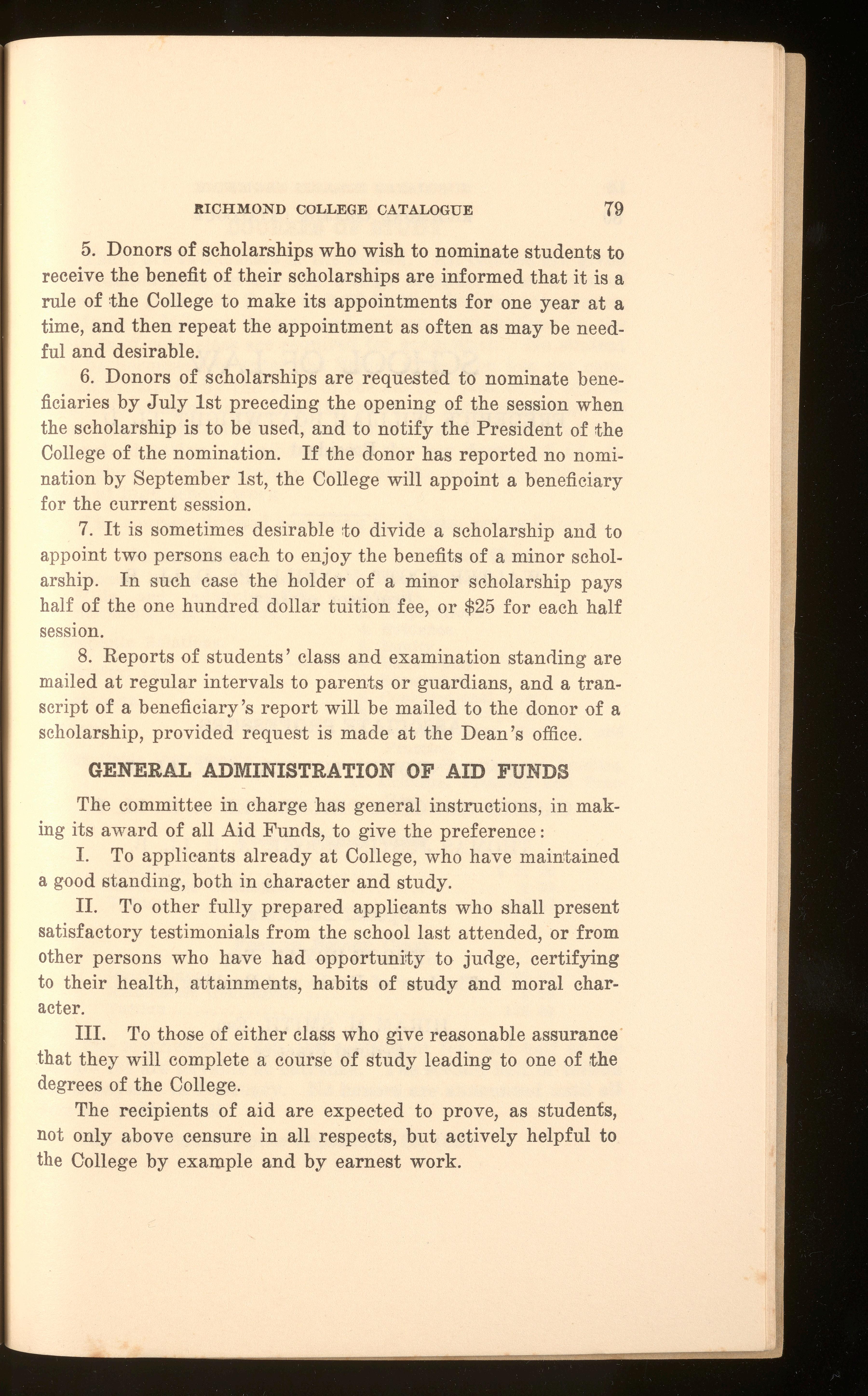
5. Donors of scholarships who wish to nominate students to re ceive the benefit of their scholarships are informed that it is a rul e of :the College to make its appointments for one year at a tim e, and then repeat the appointment as often as may be needful and desirable.
6. Donors of scholarships are requested to nominate beneficiaries by July 1st preceding the opening of the session when the scholarship is to be userl, and to notify the President of the College of the nomination. If the donor has reported no nominat ion by September 1st, the College will appoint a beneficiary for the current session.
7. It is sometimes desirable :to divide a scholarship and to app oint two persons eaeh to enjoy the benefits of a minor scholarsh ip. In such case the holder of a minor scholarship pays half of the one hundred dollar tuition fee, or $25 for each half . session.
8. Reports of students' class and examination stanrling are mail ed at regular intervals to parents or guardians, and a transcrip t of a beneficiary's report will be mailed to the donor of a scholarship, provided request is made at the Dean's office.
The committee in charge has general instructions, in making its a w ard of all Aid Funrls, to give the preference :
I. To applicants already at College, who have main '.tained a good standing, both in character and study.
II. To other fully prepared applicants who shall present sati sfactory testimonials from the school last attended, or from othe r persons who have had opportuni:ty to jurlge, certifying to t heir health, attainments, habits of study and moral characte r.
III. To those of either class who give reasonable assurance t ha t they will complete a course of study leading to one of the degrees of the College.
The recipients of aid are expected to prove, as students, not only above censure in all respects, but actively helpful to t he College by example and by earnest work.
RICHMOND COLLEGE CATALOGUE
FREDERICK WILLIAM B OATWRIGHT, LL. D. President
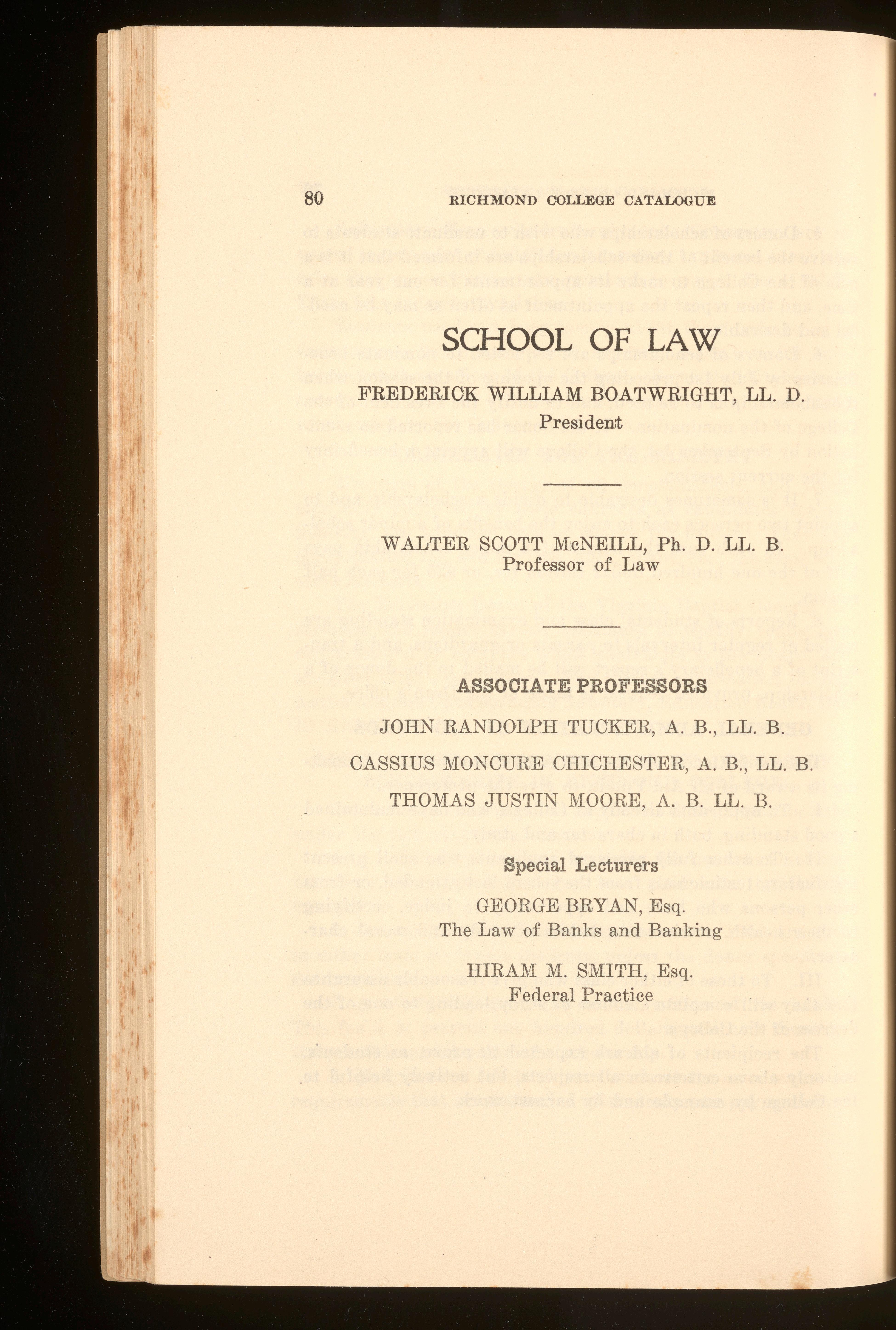
WALTER SCOTT M:cNEILL, Ph. D. LL. B. Professor of Law
ASS · OCIATE, PROFE.SSORS
JOHN : RANDOLPH TUC·KER, A. B., LL. B.
CASSIU ,S MONCURE CHICI-IESTER, A. B., LL. B.
THOMAS JUSTIN MOORE, A. B. LL. B.
Special Lecturers
GEORGE BRYAN, Esq. The Law ,of Banks and Banking
HIRAM M. S,MITH, Esq. Feileral Practice
There are t\vo classes in the School. All courses are given at Columbia Hall on the old college e-ampus. The hours of classes are from 6 :30 P. M. to 9 :30 P. M. Regular attendance, satis factory rlaily recitations and written examinations on the subj ects of each -class are required for graduation. No student will be permitted to enter :the senior Class who has not complete d satisfactorily the work of the Junior Class, or its equivalent. No student may ta.ke th ,e work of both classes in one year. Each applicant for admission must give evidenc-e of fair general education. Candidates for th .e law degree of L L. B . must show twelve entrance units, or the equivalent of three year s of high sch-ool work.
The courses, divided according to classes, are as follows :
Junior Class Senior Class
1. Per sonal Property, including Wills and Administration, Bailments and Carriers. 1. Real Property. -2. Sales. 3. Corporations 4~ Evidence.
2. Domestic Relations .
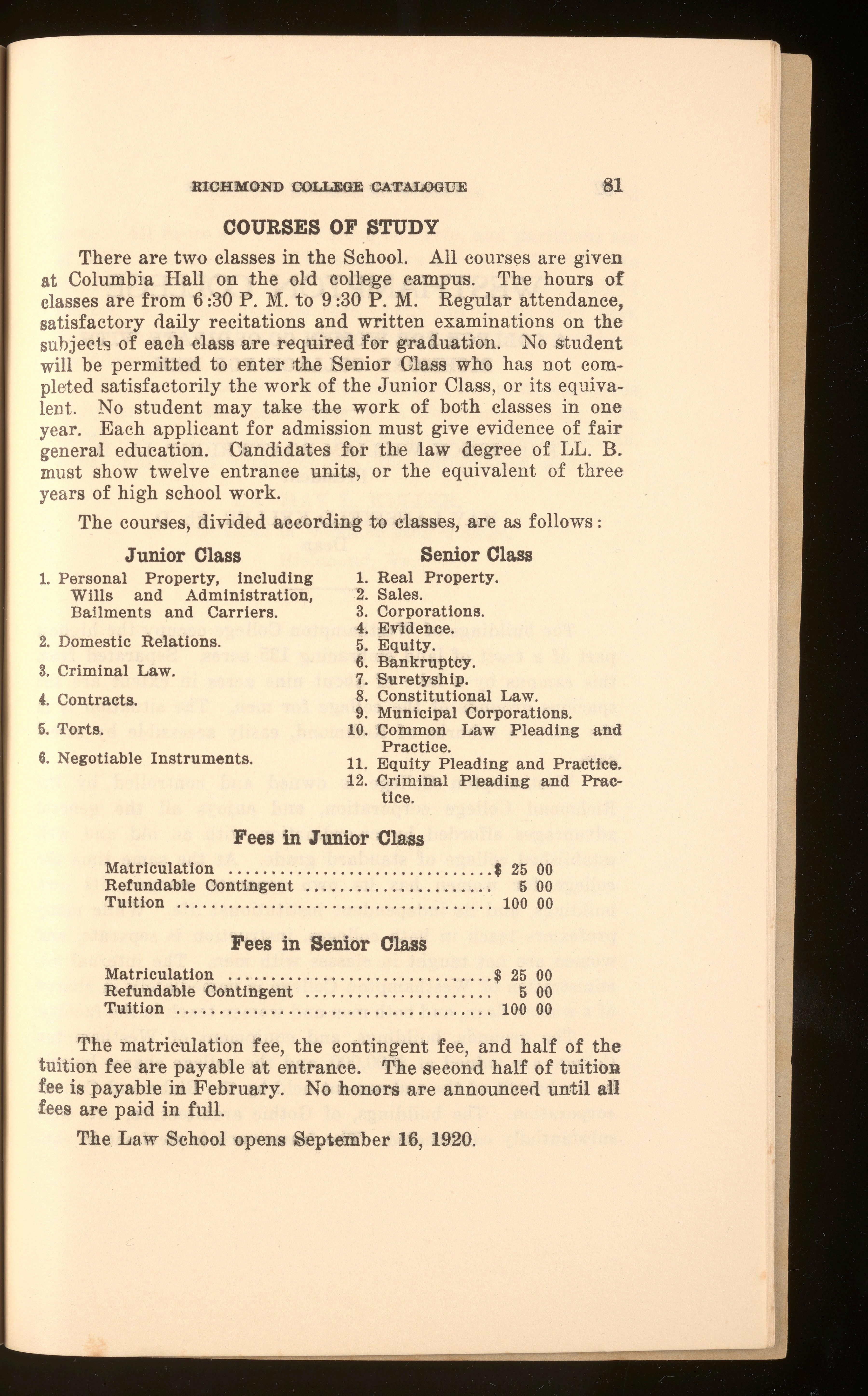
Equity.
3. Cr iminal Law . 6. Bankruptcy. 7.. Suretyship.
4. Contracts. 8. Constitutional Law. 9. Municipal Corporations
5. To rts.
6. N egotiable Instruments.
10. Common Law Pleading and Practice.
11. Equity Pleading and Practice. 12. Criminal Pleading and Practice .
The matriculation fee, the contingent fee, and half of the tuiti on fee are payable at entrance. The second half of tuitio11 fee is payable in .February. No •honors are announcerl until all fees are paid in full.
The Law School opens -~epteniber 16, 1920
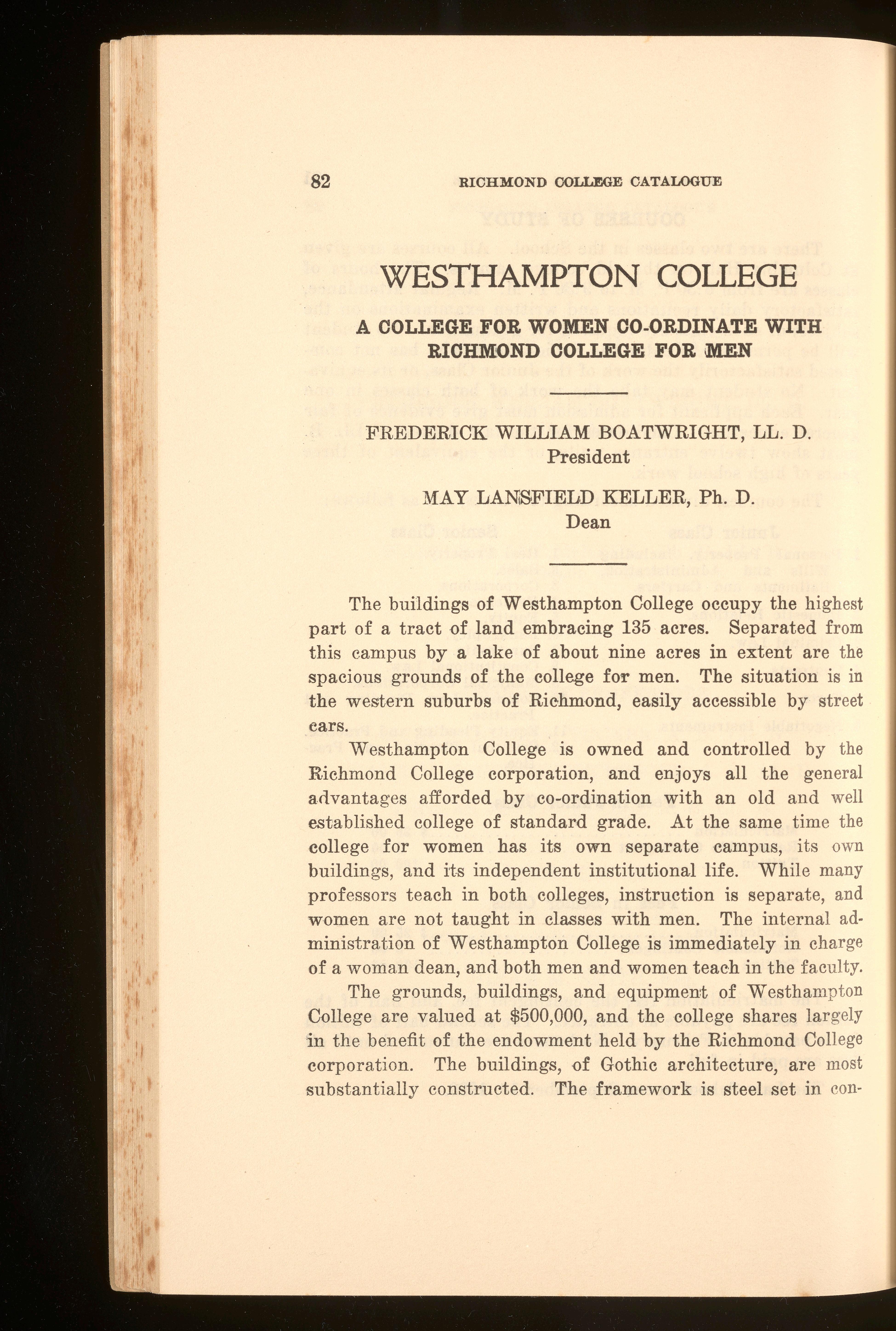
FREDERIC
WILLIAM BOATWRIGHT, LL. D. President
MAY LANSFIELD KELLER, Ph.D. Dean
The buildings of Westhampton College occupy the highest part of a tract of land embracing 135 acres. Separated from this campus by a lake of about nine acres in extent ar e the spacious grounds of the college for men. The situation is in the western suburbs of Richmond, easily accessible b y street ears .
Westhampton College is owned and controlled by the Richmond College corporation, and enjoys all the g eneral ail.vanta ge s afforded by co-ordination with an old an d well established college of standard grade At the same ti me the college for women has its own separate campus, i ts own buildin g s, and its independent institutional life. Whil e many professors teach in both colleges, instruction is separat e, and w •omen are not taught in classes with men. The intern al administration of Westhampton College is immediately in charge of a woman dean, anrl both men and women teac-h in the faculty. The grounds, buildings, and equipmen:t of Westha mpton College are valued at $500,000, and the college shares l a rgely in the benefit of the endowment held by the Richmond College corporation. The buildings , of Gothic architecture, are 1nost substantially constructed. The fram.ework is steel set i n con-

cr ete. All .floors are of reinforced concrete, and partitions are of brick or hollow tile. The stairways are of steel with slate tr eads, the window frames of concrete stone and the sash of br onze. The appointments through-out · are of the very best. Safety, health, and comfor:t of students have everywhere been con-sidered.
The same entrance requirements and the same standards ap ply in Westhampton College -88 in Richmond College, with w hich it is co-ordinate. The next session opens September 16, 1920. For special catalogue and other information, address
DR. MAY L. KELLER,
The Dean of Westhampton ,College, Richmond, Va.

Degrees Conferred June, 1919
DOCTOR OF DIVINITY
REV. ANDREW BROAD ,DUS, B. L. ( '73) ...•.•...... Sparta, Va. REV. H. D. O. ~CLACHLAN, A. M., LL. B ....... Richmond, Vll.
DOCTOR OF LAWS
DEAN JOSEPH R. LONG, B. A., LL. B. ('90) .•..• Lexington, Va. MAJ". GEN. LER ·OY SPRINGS LYON ...•••••........... U. S. A.
BACHELOR OF ARTS
FEILD, J AlVIES WYATT ................................... . GARNETT, ALFRED WILLIS ......•...•.......... Rapidan, Va. GOODE, BENJAMIN ,CLIFFORD ......•.....•.•..... Henry, va. LOVIN 1G, WILLIAM BOYCE ..•....•....•....... Hinton, W. Va. NICHOLAS, HENRY LEWIS .......•.... ·.. Madison Heights, Va. NORTHEN, LLEWELLYN COLUMBUS ........... E·mmerton, Va. O'BRIEN, ROB ERT ALFRE'D ................• Appomattox, Va. RUCKER, EDMUND HARRISON ............•.... Richmond, Va. RYLAN :D•, WILBUR HARD ·MAN •.................. Urbanna, Va. SIMPSON, HENRY PIERCE ........................ Salem, va. STEPHENS, ROB ERT NATHANIEL .......•....... Quinque, Va. TILLER, WILLIAM LINCUS .................••..... Duty, Va. TRIBBLE, HAR·OLD WAYLAND ................ Lake City, Fla TRUNDLE, OTHO · 1CLARK,E ............•..... Gaithersburg, Md. TURNER, G RO VER MILTON ........ ••••.. Stone Mountain, Va. WICKER , J AME.S CALDWELL ........••........ Richmond, Va.
BAOHELOR OF SCIENCE
CHAPPELL, RALPH RAYMOND' ......•.......... Richmond, Va. LEONARD, BERNARD WALTER ................ Richmond, Va. RYLAND, ROB,ERT TE'M.PLE ................... Walkerton, Va. WHITFIELD, JAMES l\10REHEAD, JR ........... Richmond , Va.
BACHELOR OF S<JIENOE IN MEDICINE
NEWMAN, EMANUEL ......................... Richmond, Va.
BAOHELOR OF LAWS
LIVESAY, AR CH ,DEAN ......................... Coeburn, va. PURCELL, JOHN M............................. Richmond, Va. RATCLIFFE, HAR·OLD MAC0N ............•.... Richmond, va. TILLER, WARREN LANIER ................... Richmond, Va.
RICHMOND COLLEGFI CATALOGUE
Prizes Awarde d June, 1919
Medalists i-n Departments
Cr ump P 'rize (Mathematics) ........................
Ta nner Medal (Greek) .........................
Se nior Law Prize ..•.......................•.....

GEORGEW. ToMs
FRANCES E. WoonsoN
ARcH DEAN LIVESAY
Ju nior Law Prize ...................................... C. C. WEBSTEB ·
LITERARY SOCIETY ME · DALISTS
Jo int Orator's Medal ...........•. ·
PhiZilogian Booiety
J.B. KINCANON
Best Declaimer~s Medal .............................. d. L. KIN CANON
B est Reader's Medal ..................... w. E. HATCHED Medal for Improvement in Debate .............•....... ·... C. G. CARTED
Best Debater's Medal ...•.•............................... J. L. LANE
Mu Sigma Rho Society
Be st Reader's Medal. .................................
H. W. TRIBBLE
B est Declaimer's Medal ................................... N. M. Fox
Best Debater's Medal
GRADUATE STUDE . NTS
CHEETHAM, ALBERT CORNELIUS (B. A., Richmond College, Va.), Baltimore, Md.
O' BRIEN, ROBERT ALFRED (B. A., Richmond Golle,ge, Va.),- Appomattox, . Va.
Olass of 1920
ASHTON, DUDLEY CURTIS .................... Richmond, va. B OLTON, NORMAN MILTON ..................•. Fincastle, Va. B OWMAN, SAMUEL THEODORE ................. Roanoke, Va.
B RIEL, GEORGE BERNHART .................. Richmond, Va. B R,OADDUS, WILLEY RICHARD ............... West Point, Va. B RUGH, HOMER EDMUNDSON .•................ Roanoke, Va.
C HARLTON, DAVID WAYLANP •....••....•.. ... Dillwyn, Va. C H,EUNG, TO SHAM ........••................. Canton, China COOPER, ME·YER ELLIS ......••..•...•..••.••. Richmond, Va · . F R.ASER, HARRY BOULINEAU .............• • . .•.. Hinesville, La HIBBS, RUSSELL AUBRA ......••••..•...... Birmingham, Ala. H ICKERSON, CLYD'.E VERNON •••.••.........•• Remington,- Va. H ITE, JESSE R ·.................. Vir.gilina, Va. H 'OLLAND, HEZEKIAH RU SSEL ·•••........•••• Wilmington, Va. HONTS , ANDE'RSON BRUiGH .•.. · · Eagle Rock, Va.
86

RICHMOND COLLEGE CATALOGUE
INGRAl\1:, SYLVANUS LITTLEPAGE ••..••.•.••.. Richmond, Va KNIGHT, JAMES THOMAS .....••....•.....••.•. Franklin, V a. LANE, JAMES LESTER ....•....•••••••••...•••• Hoboken, Ga. MAHON, BERNARD WEBB ...........•....• Bowling Green, V a. MATTHEWS, WILLIAM FREDERICK .......... New Church, V a. McKENNE Y, ROBERT WESTON ................... Village, V a. PETTUS, WILLIAM MERRITT ............ . . Drakes Branch, Va. PHIPPINS, CAL VIN HALL ........ ·... . ... • ....... Owenton, V a. SMITH, COTHRAN GODDEN .................•.. Richmond, V a. SPRATT, SAM DEL PEERY 1GODFREY ..... Paeonian Sprin,gs, V a. TENER, GEORGE RANDALL ~ .....• ,. ••••...•... Richmond, V a. THOMAS, CARROLL TRUITT ..... . ....... Kearneysville, W. V a. THOMAS, HASKELL 1\1:0ISSON ....•......... ... Florence, 'S. C. TRAINHAlVl, WILLIAM EMORY ..•..•........... Richmond, Va. TRAINUM, JULIAN EARLE .........•.... · ...... Richmond, Va TUCKER, SAMUEL BUSTER .........•..• Republican Grove, Va VAUGHAN, WILLIAM AN:OREW ..........••......... M.ica, Va .
Class of 1921
BENTLEY, FRANK .....................••.•.... Tampa, Fla BLANKING SHIP, ALEXANDER HUGO .•.....•••. Richmond, Va . BOWLES, ST(?VER H0 1GE .•..•.•.••.....•.....• Richmond, Va. BRAl\IE, PETER ERNEST ....................... Flat Run, Va BRISTOW, ROBERT STEPTOE ............... ... Urbanna, Va . BROWN, BOYD FRANKLIN .....••.....•.•.... Hinton, W. Va . BULLARD, RICHARD HIRST ...............••• West Point, Va . BURKE, KENNETH EDISON .........••......••. Ric !hmond, Va. CLARKE, BYRON OLDHAM ................... Salisbury, N. C COATES, ALBERT WOOD ..........•...•..••.• ·•... Lyells, Va. COOK, ANDREW BRUCE .......•........•..•... Rahway, N. J. EDW ARD.S, ROBERT FRANKLIN ....••.....•. Isle of Wi.ght, Va FORP, HERMAN AUBRE 'Y ............•••.....••. Waverly, Va. FOX, NELSON MOFFETT ............••........... Penola, Va. FRANKLIN, WILLIAM JENNINGS ............... Richmond, va. GRAY, GARLAND .............................. Waverly, Va . HARTZ, DENNIS WILSON .•.......••........•... Waverly, Va. JONE'S, WILLIAM ELLIS ....................... Richmond, va. KIRBY, RALPH JAY ..................•....... Richmond, Va. LOVING, WILLIAM RUSH ....•............••... Richmond, Va. McGEE, WILLIAM AMBROSE ....••......•..•••• Richmond, Va. MITCHELL, BERNARD ELWOOD ..••.•...••••.... Bestland, va. NUCKOLS, RANDOLPH WINFRED ... ....•...... Chatham, va. ROBINSON, WILLIAM LAFAYETTE. ·.•..•. ·..••.. Richmond, va. RUFFIN, THOMAS LORRAINE .•••..•..••.••••.. Richmond, Va. SKAG 1GS, MARVIN LUCIAN ..•....• ••.... Pennington Gap, Va. SPENCER, HOWARD CHURCHILL •...... ..,._••••. Richmond, Va. VENABLE, GEOR 'GE CEPHAS ..••••...•• ; ·.•••• Rockford, N. C. WILLING HAM, EDWARD BACON .•••••.•••..... Richmond, Va.

Class of 1922.
ALLE Y, REUBEN EDWARD .... .............. Peters •burg, Va. ANP ERSON, WALTER BOWLES .. ......•...... Richmond, Va. ATK INS, ROBERT STEVENSON . . .. . ....•... .... Windsor, Va. BAIL EY, JOHN McKENDREE ..............•.... fUchmond, Va. BEA TTY, ROBERT JOSEPH ....... ...........• Richmond, Va. BOW LES, FRANCIS NORMAN ...... ..........• ... Chester, Va . BR ADY' J Al\1:ES DENNIS ..... ... ............... Richmond, va. BUR NETTE, OTWAY KYLE ..•.................. Leesville, Va. CAR TER, CECIL GENTRY . . Salem, Va. CAR VER, WILLIAM OWEN ..................•.. Louisville, Ky. CAV ERLEE, ROBERT FRANKLIN .•.•.•...••.... Richmond, Va. COOK, HENRY AU,GU'STUS .........•....•..... Anderson, S. C. ,DAVENPORT, BOSWELL u·Tz .......•••....•.•. Richmond, Va. DAVIS, PA UL HEDLEY .....................•...... Paces, Va. DUKE, IRVING TERRILL ...........••.....•••. Richmond, Va. DUNAWAY, THOMAS SANDFORD ............... Smithfield, Va .. GANZERT, ARCHER STEVENSON ••..•.••..•••• Richmond , Va. GARST, ROBERT EDWARD ........••........•. Richmond, Va. GOOD, HOR.A.CE THOMAS .....••.....••........ Buchanan, Va. GRAY, EDWARD WHERRY .•.....•.••.......•. Richmond, Va. GRIMM, EARLE LAWRENCE .................•. Richmond, va. HA RGROVE'S, VERNON CARNEY .....•........ Churchland, Va. HA TCHER, WILLIAM ELDRIDGE •....•........• Louisville, Ky. HA YN -ES, WILLIAM TYLER ...•....••••..•.••.. Ric,hmond, Va. HE NDERSON, WILLIAM CAREY •..••....••...... Schuyler, Va. HI TE, OSCAR LEE .........•.•..•...••.••...... Virgilina, Va. HU I, CHING YEUNG .......•.••.••.•..•........ Canton, China HU RST, J A1'tfES THOMAS ....••.•...••.•••.••... Parksley, Va. JO HNSON, WILLIA11 BUREN •..... •' • •..••••.. Lillington, N. C. JO NES, WAVERLY EDWARD ......••.••.••. Newport News, Va. KA.PPES, WILLIA1vI CARL ............••........ Richmond, Va. K.ELL Y, DAVID WRIGHT .......•..•.••......... Culpeper, Va. LANKF ORP, HENRY JONE 'S ............•...•.. Baltimore, Md. LE EK, CHARLES FRANKLIN ................... Rio Vista, Va. LL OYD, THOMAS STACEY .........•........... !}ichmond, Va. MARSH, ROBERT THORNTON ....•............. Richmond, Va. MARTIN, THOl\,IAS DENNIS ..............••.... Richmond, va. MILLER, THOMAS ROY ALL ...•......•.....•••. Richmond, Va. MOTTLEY, RAI,PH COURTNEY ••.•.•..•.....•... Roanoke, Va. NE WTON, JOHN MILTON, JR ..•.....•..•........ ,Graham, Va. OR RELL, ,SAMU .EL ROY .............•............. Hurt, Va. PA GET, JAMES SUDDOTH ........ ! ••••••••••• Anderson, S. C. PA RTIN, KENNETH WOOLCOTT ............. Wilmington, N .. C. PA TTERSON, GEORGE CLIFTON .•...•..•...... Richmond, Va. PA YNE, JAMES BRENT .•.....•..•...••..•..... Columbia, va. PO LLARD, WALKER A YLETT ...........•.. ·•...... Aylett, Va. · QUILLEN, BEVERAGE TATE .......•.. ·•..... Gate City, va. R AMSAY, DAVID MARSHALL .•••. · •.••••.....• Greenville, S. C. RI TCHIE, GEORGE ·PAUL .......•.••......•.... Richmond, Va. R UDD, AUGUSTUS BARTOW .•.........•. Saltillo, Coahuila, MeL SADLER, RICHARD STREET .....••............. Laneview, Va.
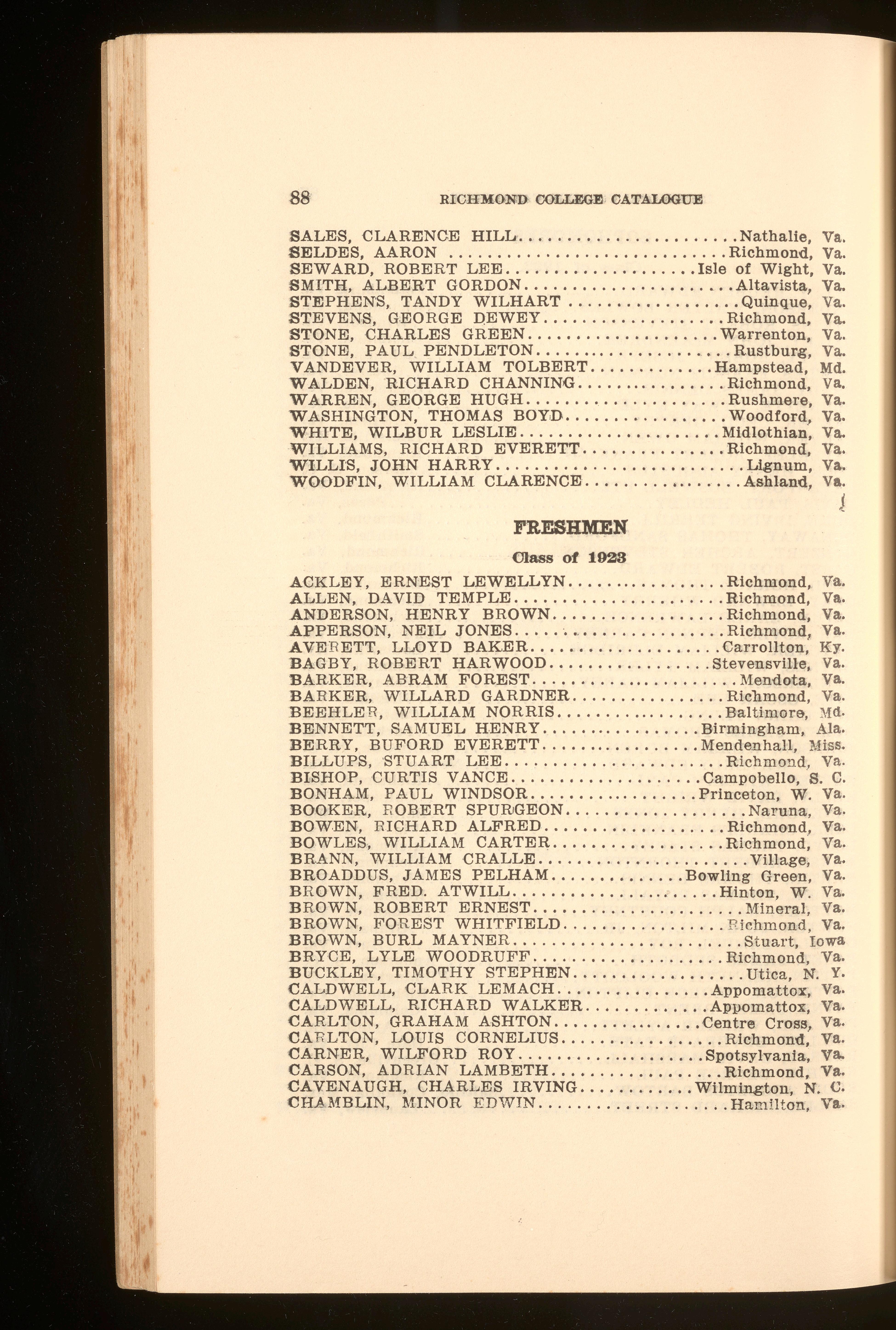
88 · RICHMOND · COLLEGE ; CATALOGUE
SALES, CLARENCE HILL ..••..........•.•.•.... Nathalie, Va. SELDES, AARON Richmond, Va. SEWARD, ROBERT LEE ......•.......•...•• Isle of Wight, Va. SMITH, ALBERT GORDON ....................... Altavista, Va. STEPHEN'S, TANDY WILHART ............••.•.. Quinque, Va. STEVENS, GEORGE DEWEY ..•...........•.... Richmond, Va. STONE, CHAE.LES GREEN ....••......•....... Warrenton, Va. STONE, PA UL _ PENDLE 'TON .................. _ •.. Rust burg, Va. VANDEVER, WILLIAM TOLBERT ............. Hampstead, Md. WALDEN, -RICHARD CHANNING ....••.......... Richmond, Va. WARREN, GEORGE HUGH ........ _............. Rushmere, Va. WASHINGTON, THOMAS BQY;D •...........•••.. Woodford~ va. WHITE, WILBUR LESLIE ......••.•.•.......•. Midlothian, Va. -WILLIAMS, RICHARD EVERETT ..........•.••. · Richmond, Va. WILLI'S, JOHN HARRY .•......••........••...... ~ignum, Va. WOO DFIN, WILLIAM. CLARENCE .........•.... - Ashland, v •.
Olass of 1928
ACKLEY, ERN E.ST LEWELLYN ................. Richmond, Va~ ALLEN, D.A.VID TEMPLE ......•............... Richmond, Va. ANDERS ·ON, HENRY BROWN ...•.......•...... Richmond, Va. APPERSON, NEIL JONES ..... ·•• , ••............. Ric-hmond, va. AVERETT, LLOYD BAK.ER ...••••............. Carrollton, Ky. BAGBY, RO BERT HARWOOD .•..•............ Stevensville, Va. BARKER, ABRAM FOREST ...................... Mendota, va. BARKER, WILLARD GARDNER ................ Richmond, Va. BEEHLER, WILLIAM NORRIS ••................ Baltimore, :\tel. BENNETT, SAMUEL H.ENR Y ................. Birmingham, Ala. BERRY, BUFORD EVERETT ..•......•....... lviendenhall, 1'.'.fiss. BILLUPS, 'STUART LEE ... ................... Richmond, Va. BISHOP, CURTIS VANCE ......•............. Campobello, ·s. C. BONHAM, PA UL WINDSOR ....•............. Princeton, W. Va. BOOKER, ROBERT SPUR1GE·ON •.................. Naruna, Va. 'BOW-EN, RICHARD ALFRED ..•.•.....•........ Richmond, va. BOWLES, WIL LIAM CARTE~ •..••............. Richmond~ Va. BRANN, WILLIAM ·ORALLE .•..••................ Village, va. BROADDUS, JAMES PELHAM ....••.•...... Bowling Green, Va. BROWN, FRED. ATWILL ......••.............. Hinton, W. Va . BROWN, ROBERT ERNEST ..••.................. Mineral, Va. BROWN, FO '.REST WHITFIELD ..•.............. Richmond, Va. BROWN, BURL MAYNER .............•.......... Stuart, Iowa BRYCE, LYLE WOODRUFF ..........•......... Richmond, va. BUCKLEY, TI:M:OTHY STEPHEN ........... _....... Utica, N. Y. CALDWELL, CLARK LE MACH. · Appomattox ~ Va. CAL DWELL, RICHARD WALKER ............. Ap pomattox, Va. CARLTON, GRAHAM ASHTON ................ ·Centre Cross, Va. CARLTON, LOUIS CORNELIUS ..........•••.... Richmond, va. CARNER, WILFORD ROY ......•...........•. Spotsylvania~ V~ CARSON, ADRIAN LAMBETH ...•.............. Richmond, Va. CAVENAUGH, CHARLES IRVING •.......•.•. Wilmington, N. C. CHAi1BLIN, ~.fINOR EDWIN ..................•. Hamilton, Va.
RICHMOND COLLEGE CATALOGUE
CLAR ,KE · ALAN BURTON .......•.........••..•

89
Richm ond, Va. , -
CLARK, ED WARD THOMAS •...•.....•••...•.•• Gold Hill, Va.
CLARK, OTIS LANIER .........••..••........•• Richmond, Va.
COOKE, ERNEST ..•..•.••...•. . .•...••....•.. Owensboro, Ky. CUMMINS, HERBERT SAMUEL •.••.....••.. Natural Bridge, Va. DA VIS, HOW ARD HUNTER ...•. .•..••.....••. C.umberland_. Md. DAVIS, JOSEPH JAMES ......................... Fentress,. Va. D-OANE, FR ,ANCIS EDWARD ................... Richmond ,, Va. DOWNS, LEWIS McCARTHY ...•..•............ Richmond, . Va. DRINKARD, RU'SSELL DREW .................. Richmond, Va. DUDLEY, PAUL KREU1GER .....•.....•.......... Roanoke · , Va. DUNFORD, JOHN VANN ...........•• •- ........ Anderson, S. C. DURRETTE , FRANK ST AR 'KE ... ...•....•.......... Celt, va. DUVAL, ADDISON McGUIRE ....••.•..••.••..•
Rhoadsville :, Va.
E ACHO, HARRISON CLAIBORN -E •• . ••.••..•••••• Richmond, Va.
E ASTWOOD, ANDREW JACKSON ••.•..•......... Wellville, Va.
E LLYSON, WILLIAM, JR. . ...•...•••..•....... Richmond . Va.
E UBANK, GEORGE DUNCAN •..•...••..•...•.•• Richmond, Va :
E VANS, WILLIAM ARTHUR, JR. . ••••••.....••• Riehm.and ., Va.
F ERNEYHOUGH, JAMES FITZHUGH ••••.••...•• Ri.chmond :, Va.
F LO -URNOY, SE -LWYN LE'STER .••.••••••.•..••• Richmond, Va.
F OSTER, LLOYD BELTON .•.•••..••.••.••..... Gmmlin, S. C.
F RAZIER, WILLIAM ;D.EMPSEY •.••..... .-•.•...... .Suffolk, Va. GARRISON, CURTIS WISWELL .•.•.•......•.••• Richmond, Va. GOODWIN, MANLY BOATWRIGHT .........•... Pine Bluff, Ark. GORDON, JO.SEPH BERKLEY ..•..•.........••• Richmond, va. GORDON, THOMAS BRAXTON ........•••••... Appomattox, Va. GRU BB, JOHN HILDT .......•....•••••• Harper's · Ferry, W. Va. GUNTER, B .ENJAMIN THOMAS ..........•... .... Acco -mac, va.. GUTHRIE, JAMES BLAIR .....•..•......•••..•• Richmond, Va. H ARRIS, WILLIAM ASBURY, JR .••.....• Richmond College, Va. H ARRISON, EMMETT C LIFFORD ..•.•....•..... Farnham, Va.
H ARV EY, JOHN LACEY ............••••....... Richmond, Va. H ELD, EDWARD CALISCH ..•........•......••. Richmond,. va. H ENING, THOMAS SCOTT ...•.•.••.......•..... Jefferson, · Va. H IGHTOWER, RAYMOND LEE ..••............. -South Hill, Va. H ILLSMAN, JOHN ALBERT BURWELL ·••••..•.•. Richmond, Va. H ITCHENS, ROLAND JENNINGS ••••..••.......... Suffolk, va. H ITT, MILTON GRIMS LEY •.••...•••..•••••.• . •.. Castleton, Va.
H OSIER, JOHN RUBS'ELL .......•.••.•.•...•. .. Richmond, Va.
H OWARD, THOMAS LAND ,ON .•••.......••.... Salemburg, N. C.
H UNDLEY, JOSEPH WARREN •• ••...••.••••.... Richmond, Va.
H UTCHINSON, HERBERT RANDOLPH . .......... Ri-chmond, Va.
J OHNSON, BAXTER FRENCH ••...•••.•..•••••. Knoxville, Tenn.
J OHNSON, EDWARD , CLAUDE •••••••••....•••... Parksley, Va.
J OHNSON, EDGAR MULLINS •.•••••••••. •·• •.•.. Richmond, va.
J OHNSON, JOSEPH ROBERT .•••••••••••••••• New Canton, Va.
J OHNSON, SIDNEY WARREN -•.•..•••••.......•... Suffolk, Va.
J ONES, ORVIN CLARENC,E •••••••••.....••••••• Richmond, Va~
K AY, FLOYD SALE ••.......•.••••.••••••••...... Sparta, Va.
K EITH, WARREN GODDIE .••••••••..••••••• ., ..... Upton, KY,
K ERSEY, LUTHER WILBUR ••.•••••••••••••• •• Richmond, va.
K ILGORE, CARL JU .D.SON ...•..•..•.••••••...... Coeburn, Va~
90
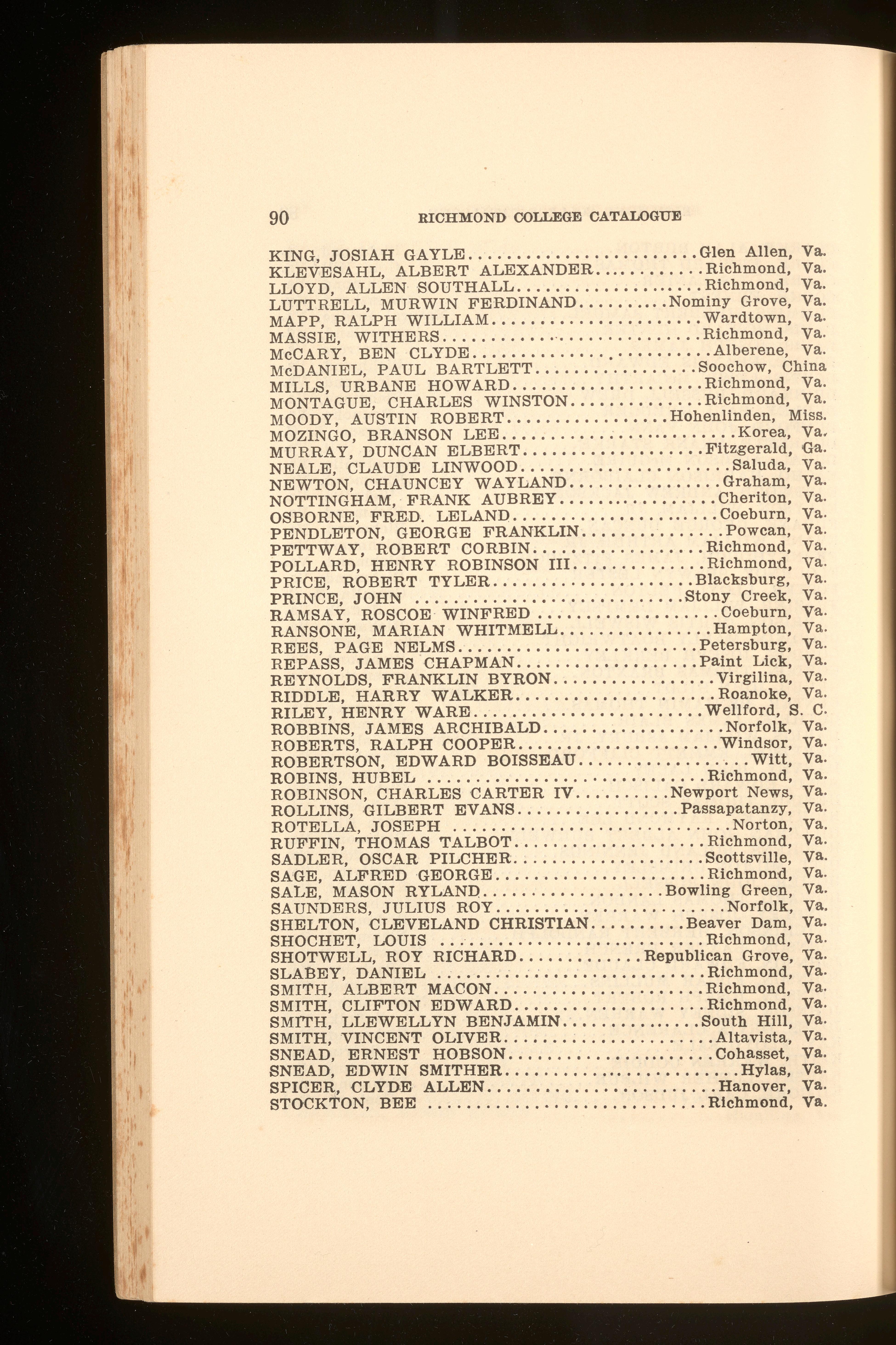
RICHMOND COLLEGE OATAWGUE
KING, JOSIAH GAYLE .....••••.••..•...••••.• Glen Allen, Va.
KLEVESAHL, ALBERT ALEXANDER ...••.••.... Richmond, Va
LLOYD, ALLEN · SOUTHALL ....•.. . ••• ••..•. ·.. Richmond, Va.
LUTTRELL, MURWIN FERDINAND •••.••.... Nominy Grove, Va . MAPP, RALPH WILLIAM .•..•••• ••..•••••.•. Ward town, Va . MASSIE, WITHERS ...•.. . .••.. ..• ............. Richmond, va
McCARY, BEN CLYDE .••••.•.. . ••..•..••••••.. Alberene, Va
McDANIEL, PAUL BARTLETT .•...•.......•... Soochow, Chin a · MILLS, URBANE HOW ARD ......••..••......•. Richmond, Va
MONT AGUE, CHARLES WINSTON .•••.•.•••... ;.Richmond, Va .
MOODY, AUSTIN ROBERT ••••...•.. •••••. Hohenlinden, Miss MOZINGO, BRANSON LEE ..••... •.. .....••...... Korea, Va ., MURRAY, DUNCAN ELBERT ••••••..•••••••.••• Fitzgerald, Ga
NEALE, CLAUDE LINWOOD ....••.......••....... Saluda, Va
NEWTON, CHAUNCEY WAYLAND •....•..•..•.... Graham, Va
NOTTINGHAM, - FRANK AUBREY •••••...••••...•. Cheriton, Va .
OSBORNE, FRE,D - LELAND ....•....•••••........ Coeburn, Va . PENDLETON, GEORGE FRANKLIN .•......•...... Powcan, Va PETTWAY, ROBERT CORBIN •...••••.. ...•... Richmond, Va POLLARD, HENRY ROBINSON III ...•..•....... Richmond, Va PRICE, ROBERT TYLER ..•..••..•......•.... Blacksburg, Va PRINCE, JOHN ..........•.••....••........ Stony Creek, Va .
RAMSAY, ROSCOE - WINFRED ..••....••••.•..... Coe burn, va . RANSONE, MARIAN WHITMELL ••....•.•....... Hampton, Va REES, PAGE NELMS ......•.••••.....•....... Petersburg, Va
REPASS, JAMES CHAPMAN ......•..•••••..... Paint Lick, Va. REYNOLDS, FRANKLIN BYRON .•.••...•..•••... Virgilina, Va RIDDLE, HARRY WALKER ••....••.•.•••....... Roanoke, V a. RILEY, HENRY WARE .......••.•••••.••...... Wellford, S. C . ROBBINS, JAMES ARCHIBALD .•..•.• ...••...... Norfolk, Va . ROBERTS, RALPH COOPER ...•.••.••.••........ Windsor, Va . ROBERTSON, EDWARD BOISSEAU .•....•...•....... Witt, va
ROBINS, HUBEL .........•..•.......••.••.... Richmond, Va. ROBINSON, CHARLES CARTER IV ...•...... Newport News, Va
ROLLINS , GILBERT EVANS ...•.••....•..... Passapatanzy, va
ROTELLA, JOSEPH ................... . ...... Norton, Va RUFFIN, THOMAS TALBOT .................... Richmond, Va . SADLER, OSCAR PILCHER ..........••..•..... Scottsville, va. SA 'GE, ALFR'ED ·GEORGE ....•.....•........•.. Richmond, Va SALE, MA.SON RYLAND .......••.......... Bowling Green, Va. SAUNDERS, JULIUS ROY ........................ Norfolk, va SHELTON, CLEVELAND CHRISTIAN ...••..... Beaver Dam, Va
SHOCHET, LOUIS ... ·.......•..•.••........•.. Richmond, Va
SHOTWELL, ROY RICHARD .•.••.•...... Republican Grove, Va. SLABEY, DANIEL .. · ...... · •· •••••.••..•..•... Richmond, Va . SMITH, ALBERT MA CON ........••......••.... Richmond, Va SMITH, CLIFTON EDWARD .••••.••...••.•..... Richmond, va. SMITH, LLEWELLYN BENJAMIN ••••.•.••...... South Hill, va. SMITH, VINCENT OLIVER ...••.. ..•..•........ Altavista, Va
SNEAD, ERNE-ST HOBSON •......•...•....••. .. Cohasset, Va. SNEAD, EDWIN SMITHER ..••.............••.•.... Hylas, va. SPICER, CLYD,E · ALLEN . ....................... Hanover, Va. STOCKTON, BEE ............•••......•....... Richmond, Va
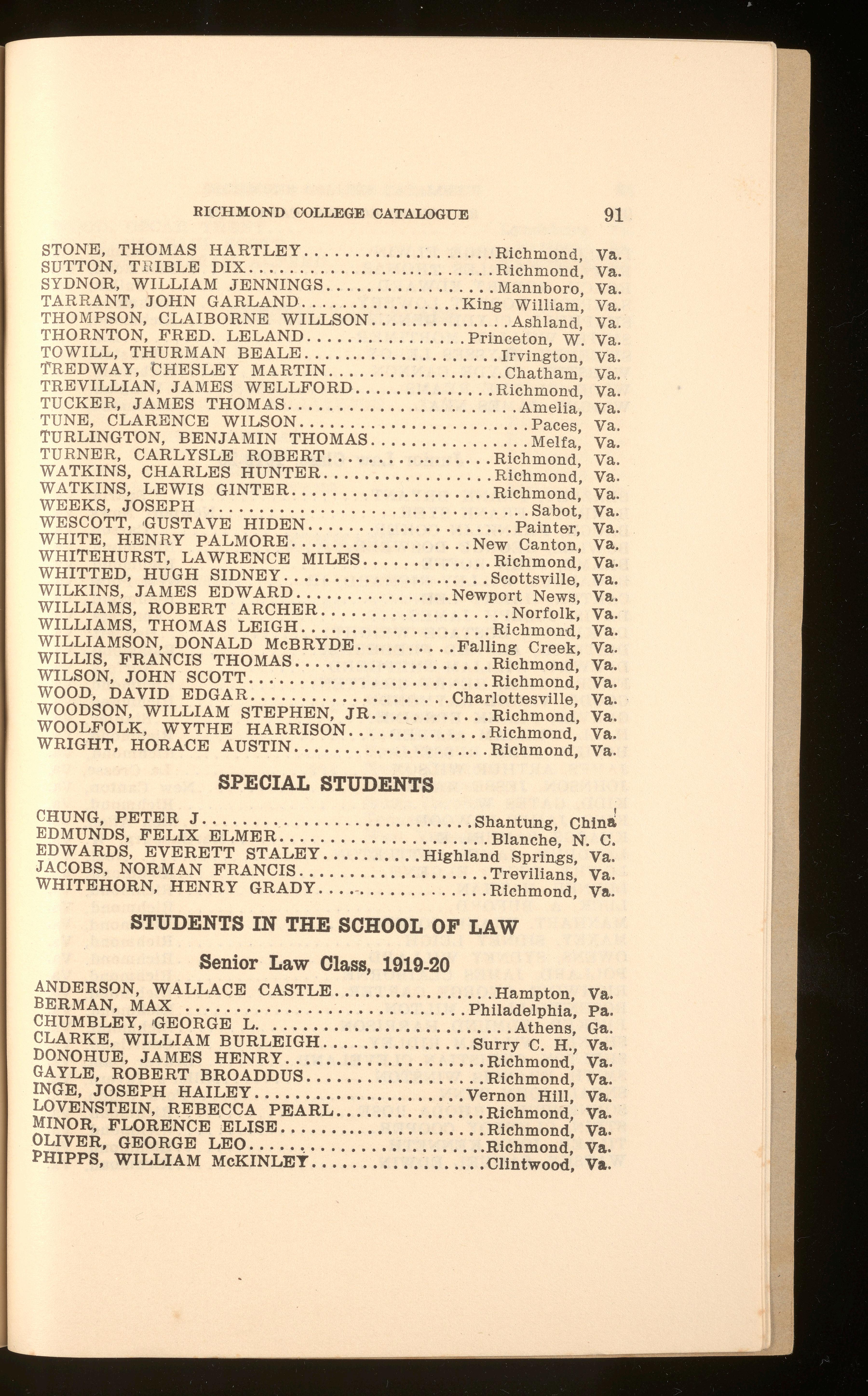
RICHMOND COLLEGE CATALOGUE 91 .
STON 'E, THOMAS HARTLEY ·....... Richmond, va..
SUTT ON, T H IELE DIX ......................... Richmond. Va.
SYDN OR, WILLIAM JENNINGS .......•......... Mannboro, Va.
TARR ANT, JOHN GARLAND................ Kin,g William, Va.
THOM PSON, CLAIBORNE WILLSON .......•...... Ashland, Va. THO RNTON, FRED. LELAND .•.............. Princeton, W. Va. TOWILL, THURMAN BEALE .................... Irvington, Va.
TRE DWAY, (!HESLEY MARTIN .................. Chatham, va. '
TRE VILLIAN, JAMES WELLFORD ·.............. Richmond, Va.
TUC KER, JAMES THOMAS ....................... Amelia, va.
TUN E, CLARENCE WILSON ..........•........ _.... Paces, Va.
TUR LINGTON, BENJAMIN THOMAS ................ Melfa, Va.
TUR NER, CARLYSLE ROBERT ....•............ Richmond, Va.
WA TKINS, CHARLES HUNTER ...••••.......... Richmond, Va.
WA TKINS, LEWIS GINTER ..•................. Richmond, Va.
WE EKS, JOSEPH ................................ Sabot, Va.
WE SCOTT, 1GUSTAVE HIDEN ...•.....•........... Painter, Va.
WH ITE, H ,ENRY PALMORE ...............•.. New Canton, Va.
WH ITEHURST, LA WREN CE MILES ••••.•....... Richmond, va.
WH ITTED, HUGH SIDNEY ...•................. Scottsville, va.
WI LKINS, JAMES EDWARD ....•........... Newport News, Va-.
WI LLIAMS, ROBERT ARCHER .............•..... Norfolk, va. .
WI LLIAMS, THOMAS LEIGH ................... Richmond, Va.
WI LLIAMSON, DONALD McBRYDE .......... Falling Creek, Va. WIL LIS, FRANCIS THOMAS ....•.......••••.•.. Richmond, Va.
WI LSON, JOHN SCOTT ... ·.......•••.........•. Richmond, Va..
WO OD, DAVID EDGAR ........•...•..•.... Charlottesville, Va. · WO ODSON, WILLIAM STEPHEN, JR ............ Richmond, Va. WOOLFOLK, WYTHE HARRISON .•.... .•...•. Richmond, Va. WR IGHT, HORA ·CE AUSTIN ...•.•.....•........ Richmond, Va.
CHUNG, PE 'TER J ........ _................... Shantung, Chin& EDMUNDS, FELIX ELMER ..................... Blanche, N. C. ED WARDS, EVERETT ST ALEY •..•..••.. Highland Springs, Va. JACOBS, NORMAN FRANCIS ........•.••.•..... Trevilians, Va. WH ITEHORN, H 'ENRY GRADY ..•. -...••........ Richmond, Va.
Senior Law Class, 1919-20 ANDERSON, WALLACE CA.STLE .•.•••...•...... Hampton, Va. BERMAN, MAX .................•.......... Philadelphia, Pa. CHUMBLEY, 1GEORGE L. . ..•••••••••.•••.•..•... Athens, Ga. CLARKE, WILLIAM BURLEIGH .•............. Surry C. H., Va. _ DONOHUE, JAMES HENRY ..•••.•.•..•....••.. Richmond, Va. GAYLE, ROBERT BROADDUS •••••••.•.•••..... Richmond, Va.. INGE, JOSEPH HAILEY ••..••••••.••.••••••. Vernon Hill, Va. LOVENSTEIN, ~EBECCA PEARL ••...•...•••••. Richmond, , Va MINOR, FLORENCE ;ELISE. " .••••.••••.•..•..•. Richmond, Va. OLIVER, GEORGE LEO .•... •...••.••......... Richmond, Va. PHIPPS, WILLIAM McKINLEY ••••.•••••••••..•• Clintwood, Va.

92 RICH -MOND COLLEGE CATA -LOGUE
POLLOC·K, GEO RJGE EL WIN .... .............. Richmond, Va. REEVES, CHARLES THOMAS .••••••.•.••..••.. Richmond-, Va. ROA ,CH, ROBERT EDWAR ,D-..•.••................. Cullen, Va. SAMPSON, ROBERT LOWERY ..•.•..••.•.••••.. Richmond, Va. SHEPHERD, CLYDE DENNIS .•...••.•....••.... Richmond , Va. SMITH, WILLIAM MORTIMER ..••••••.•.•••.••••.•.. Ino, Va. SWE -ENEY, ULYSSES LE R OY ...•................ Tunstall, Va. WEBSTER, CLYDE CANNON ....••.•.••••.•.••• Richmond, Va. ' WOOD, CLAUDE REAMS •..•.•..••.•...•....... Wingina, Va. WRI 1GH T, JAMES NEXL ...•.••.••..•........... Richmond, Va.
BEAZLEY, FRANK BRYANT ....•..••............. Sparta, Va. BARRETT, FRANK SYER ..•••.••..••.•.•.• Newport News, . Va. B -.AtJGH, FRANKLIN COKER .....•.••..••.••.•.... Carson , Va. BOWLES, GEO -RGE DOSWELL .................. Richmond, Va. BRAME, JOHN · ROFFE ....•..••...........•... ~ichmond, Va. Bli OADDUS, WILLEY RICHARD, JR . West Point, Va. CARTER, HARRY LEE ..•.•...•.•..•........•• Richmond, Va. DA VIS, JOSEPH JAMES ........•.......•.•..... Fentress, Va. DICKINSON, EUSTACE WRIGHT .••...••..••••... Hewlett, Va. DIETRICH, ALFRED FREDERICK •.......•...•. Richmond, Va DREWRY,. WILLIAM SHEPHERD ..••.•.....•••... Norfolk, V·a. FITZPATRICK, HENRY ·GRATTEN .••..•.......• Richmond, va G OODE, VIRGIL RAYMOND ...•.....•.......... Richmond, Va. GRAVES, FRANK ERSKINE ..... • ........•..•.... Stanley, va. HALL, WILLIAM ALFRED ....•.•..•........... Richmond, Va. HOSIER, JOHN RUSSELL ........•..•.......... Richmond, va. J_Al\lfF s. AR THUR WILSON ...................... La Crosse, va. JOHNSON, JESSE MABREY .......•.......... New Canton, Va. KIDD, GATES W. . ........................... Richmond, Va. KING, JAMES ELWOOD ..................•.... Glen Allen, va. KNAGGS, SAMUEL E ........•. - ........... Martinsburg, W. Va. LANDRUM, JAMES LYTTLETON ..............•..... Noel , va LOWRY, OSCAR. EUGENE .. · ................ .- .. Richmond, Va. LUBNER, NATHAN ........................•.. Richmond, va. LUCK, A. BUFOB ,D ..................•..•...•.. Richmond, va. MANHART, FRANK JOSEPH ................•.. Richmond, Va. MAXEY, SIDNEY LEIGH ....................... Richmond, va. OWENS, SYDNEY WILLARD ................... Richmond, Va. POLLARD, JAMES CLAIBORNE Richmond, Va. RICHWINE, G'EORGE CARTER .•. .-.......•..•.. Richmond, va. ROSENTHALL, A. MILTON ...................•. Richmond, va. RUCKER, EDMUND HARRISON ........••....•. Richmond, va. SHANDS, WILLIAlVI RIDLEY ................... Courtland, Va. SHEL,TON, CHRISTIAN CLEVELAND .......... Beaver Dam, Va. SMITH, FT-?ANCIS WINSTON ....•.......... Miller's T avern, Va. SNEAD, JOHN WINN -..................•.•... . Fork Union, Va. SONNENBURG, RHODA ROSE ..• , •...•......• .. Richmond ' , va. STEIN, GLENROY COOP 'ER .•.•••..•..••.••.•.. Rlchmond · , Va. TILLER, JOHN KENNETH ...•......••.••.• •••• Richmond, Va W ATSK -Y, SAMUEL EDWIN •...........••.••..• Richnfond, Va,
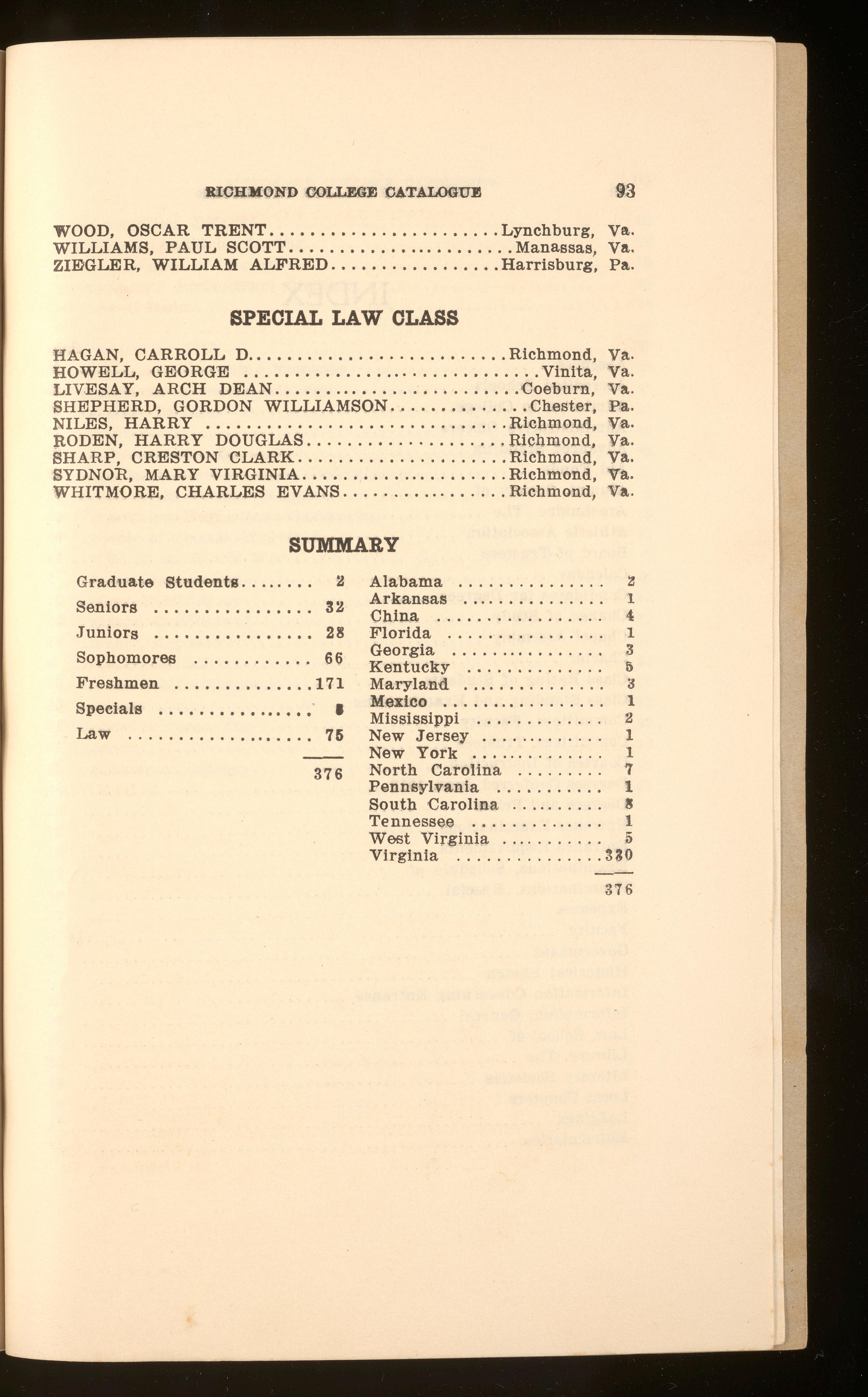
WOOD, OSCAR TRENT ••.••.••.•........•....
Lynchburg, Vtt. WILLIAMS, PA UL SCOTT ••....•....•....•...... Manassas, Va. ZIE 1GLER, WILLIAM ALFRED ................. Harrisburg, Pa.
HAGAN, CARROLL D ...•...............•...... Richmond, va. HOWELL, GE ·ORG 'E ...•...•.•.................... Vinita, Va. LIV.ESA Y, ARCH DEAN ....••................... Coeburn, Va.. SHEPHERD, GORDON WILLIAMSON .......•...... Chester, Pa. NILES, HARRY •..•.......................... Richmond ., va. JtODEN, HARRY DOUGLAS Richmond, va. SHARP, CRESTON CLARK ..................... Richmond, Va.. SYDNOR, MAR y VIRGINIA ..••.••.....••....... Richmond, va. WHITMOR!D, CHARLES EVANS ................. Richmond, Va.

Advanced
Aid Funds
Alumni, Society of Arachnidae, The Athletic Association Board of Trustees
Calendar
Candidates for Degrees
Change of Study Chapel Assem bly
Charter
Class Rating of Students
Class Standing and Examinations
Committees, Faculty
Committees, Trustees
Courses of Instruction Degrees Conferred June, 1919
Degrees and Prizes ....
Entrance Examinations
Entrance Requirements ... Examinations, Schedule of
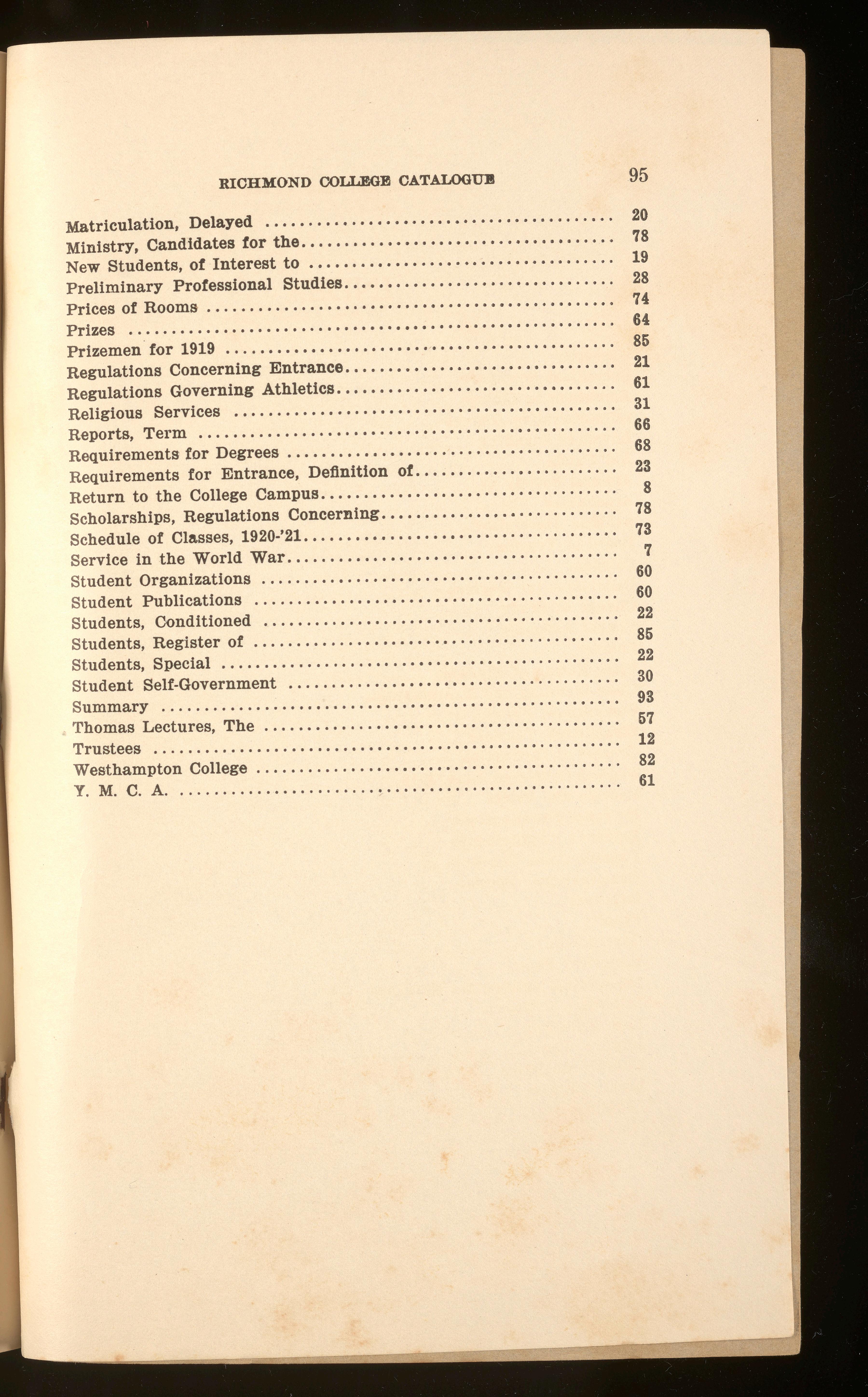
Matriculation, Delayed
Ministry, Candidates for the .•........••••.•..•..•...••••.••.....
New Students, of Interest to
Preliminary Professional Studies ....••...................•......
Prices of Rooms ........
Prizes •
Prizemen for 1919
Regulations Concerning Entrance ..•...••.......•...•..•.........
Regulations Governing Athletics ............•...........••.......
Religious Services
Reports, Term ..........................•..........•...•.......
Requirements for Degrees
Requirements for Entrance, Definition of ............•...........
Return to the College Campus ..................................
Scholarships, Regulations Concerning ..•............•............
Schedule of Classes, 1920-'21......•.••.......•...................
Service in the W or Id War . ..................................... .
Student Organizations
Student Publications
Students, Conditioned
Students, Register of .........................
Students, Special .......................•..••........
Student Self-Government
Summary
Thomas Lectures, The ...........
Trustees
Westhampton College
Y. M. C. A.

